
Café partnerships push innovation Batch heaven made in Nathan Toleman on cutting costs First look at Simonelli’s Australian flagship Tips to make your café greener Jack Simpson’s grinder recipe A World-Class Coffee Magazine JUNE 2024 ISSN 1449-2547 9 771449254002 03 No.62 No. 93 ISSN 1449-2547 $8.95 (inc GST) NZ $11.95


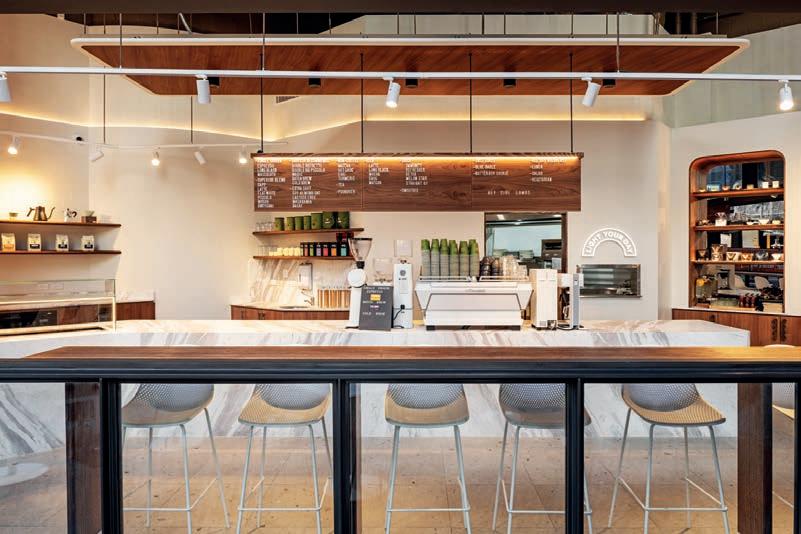

47 HOME IS WHERE THE COFFEE IS
How CafeSmart is spreading the word about homlessness with cafés and roasters
60 DREAM BUILDER
Mulberry Group's Nathan Toleman on cutting costs and the art of giving people what they want
MasterChef judge Sofia Levin discusses the café culture that helped kickstart her food career 22 AGAINST THE ODDS
The Bean Cartel Founder Stacy Visser on how he bounced back as a businessman after losing it all 26
Barista Group’s key café partners share what they love about their collaboration
Australian finalist Jake Mai's top tips for
31 L AND OF MILK AND COFFEE Why Zentveld and Milklab have a shared passion for sustainability
34 FL AGSHIP AHOY
The low-down on Simonelli Group’s new experience lab
Everything you need to know about DaVinci Gourmet’s new Barista Craft Championship
41 PUT YOUR MONEY WHERE
Veneziano Coffee Roasters shares how café owners can make their businesses greener
45 E LEVATE THE
Arkadia's secret to great chai and its evolving popularity
Merchant Coffee Roasters reveals how Roastquip and IMF helped scale its operation
62 TOBY’S TAKES ON QUEENSLAND
A new flagship café offers an upclose-and-personal Toby’s Estate experience in Brisbane
66 CUT FROM THE SAME CLOTH Euroespresso on why its synergy with fellow Italian brand La Pavoni is important to uphold
68 PARTNER OF CHOICE
Merlo Coffee details how its personalised partnership model adds value
TECH PROFILES
39 PASSION FOR INNOVATION
Coffee Machine Technologies discusses the evolution of Fiorenzato’s coffee grinder burrs
58 AUTOMATING GENEROSITY
How Franke and The Common Good Coffee Company are helping to brew kindness
64 RISE AND GRIND
Anfim Ambassador Jessica Sartiani on why the Alba is the ideal grinder for Australian cafés
SUSTAINABILITY
48 MAKE IT COUNT
Coffee Tools Distributing on its commitment to the environment
49 WASTE MADE BEAUTIFUL
The evolution of Huskee products

50 SPROCKET SCIENCE
Scientific engineers combine their skills to create a space-age coffee roaster
51 NEXT-GEN COMPOSTABLES
BioPak launches new single-use packaging lining
52 C ERTIFYING SUSTAINABILITY
InterAmerican Coffee Australia on why traceable, sustainable supply chains are increasingly important
53 A JOURNEY OF IMPACT
Pablo & Rusty's is on a mission to be one of the best and most sustainable in the industry
54 THE SUSTAINABLE SIP
How Tetra Pak is turning used cartons into sustainable building materials
SKILL BASE
56 BEST OF BOTH WORLDS
Australian Barista Champion
Jack Simpson demonstrates the versatility of the Mazzer
Philos grinder
74 ESPRESSO YOURSELF
Australian Latte Art Champion
Victor Vu returns with a challenge: his rhino latte art
CAFÉ SCENE
70 CAFÉ SCENE
Venues to visit across Australia and New Zealand
77 C ELEBRATING SUCCESS
NZSCA’s Emma McDougal shares her insights from the regional barista competitions
78 GET TO KNOW
Frankie Shi, 2024 Australian Cup Tasters Champion and Founder of Infinity Coffee Roasters

contents 10 NEWS 12 STUFF ON THE SCENE INDUSTRY PROFILES 14 KNOWLEDGE LEADER
18
C ELEBRITY COOK
THE WORKFLOW
GO WITH
29 AFTER-HOURS CAFÉ CULTURE MONIN Creativity Cup
sales
maximising
36 UNITED THROUGH COFFEE
YOUR WASTE IS
EXPERIENCE
52 26 62
FEATURES
4 beanscenemag.com.au


IT’S ALL ABOUT THE MOMENT


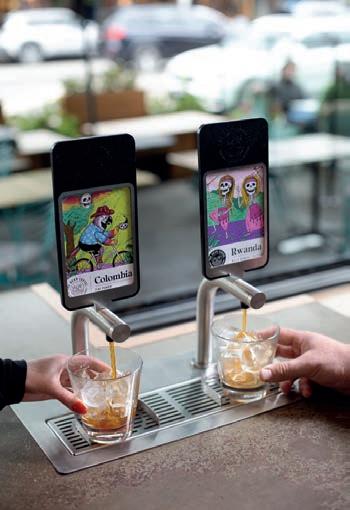
BeanScene covershoot
Fed Café
131 Dundas Place, Albert Park, Melbourne, Victoria, 3206

The team at The Bean Cartel in Melbourne were keen to showcase one of their long-standing customers when the opportunity to feature on the cover of BeanScene arose. Having recently installed two batch taps at Fed Café in the city’s Albert Park area, the buzzy neighbourhood hangout was the ideal venue to capture the forward-thinking ethos of the up-and-coming specialty roaster.
As the photoshoot got underway, utilising the café’s bi-fold windows for maximum natural light, Fed’s popularity among the local community was immediately apparent as scores of passers-by popped their heads in to ask Co-owner Fraser Chalmers what was going down – and if any extras were needed.
“We’ve been working with The Bean Cartel for just over a year now and it’s been amazing. Our coffee sales have gone up and our regulars love the beans,” says Fraser.
The focal point of the shoot was the two batch taps sitting proudly on the bar next to the takeaway hatch, which Fed installed in November 2023 to showcase a rotating selection of the roaster’s single origins.
“The batch taps have been super popular. In the first week alone we sold 20 litres of cold brew, and then through summer that was up to 30 litres,” says Fraser.
According to Fraser, the cover star Tiki Punch is one of the café’s best sellers, “customers love its fruity undertones”, but the team switch up what’s available on the taps each week to ensure there’s always something new to try.
With the cool neutral tones of the café bar in the background, BeanScene Photographer Blake Storey found balance in the golden hues of the batch brew coffee and the kaleidoscopic illustrations adorning the taps.
The kooky doodlings by Colombian illustrator Alejandro Giraldo bring each coffee to life and reflect their origins and producers. Fraser says the roaster’s bold and ambitious branding catches the attention of Fed’s customers and has led to a rise in retail sales.
Blake also took the opportunity to take some snaps of The Bean Cartel Founder Stacy Visser to accompany this month’s cover story, in which Stacy tells Editor Kathryn Lewis about his personal journey through the highs and lows of entrepreneurship.
For more information about the coffee, visit thebeancartel.com.au
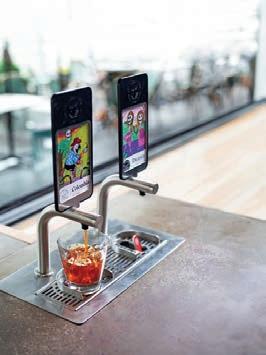
CHIEF OPERATING OFFICER
Christine Clancy christine.clancy@primecreative.com.au
PUBLISHER
Sarah Baker sarah.baker@primecreative.com.au
EDITOR
Kathryn Lewis kathryn.lewis@primecreative.com.au
JOURNALIST
Hayley Ralph hayley.ralph@primecreative.com.au
ART DIRECTOR/DESIGN
Daz Woolley
HEAD OF DESIGN
Blake Storey
BUSINESS DEVELOPMENT MANAGER
Adele Haywood adele.haywood@primecreative.com.au
C LIENT SUCCESS TEAM LEADER Janine Clements janine.clements@primecreative.com.au
PHOTOGRAPHY
Blake Storey, Ben Calvert Photography, Tim Grenard, Sam Down, Markus Ravik
CONTRIBUTORS
Emma McDougall, Victor Vu
HEAD OFFICE
Prime Creative Pty Ltd 379 Docklands Drive, Docklands, Victoria 3008 p: 03 9690 8766 f: 03 9682 0044 enquiries@primecreative.com.au www.beanscenemagazine.com.au
SUBSCRIPTIONS
03 9690 8766
subscriptions@primecreative.com.au BeanScene magazine is available by subscription from the publisher. The rights of refusal are reserved by the publisher.
A RTICLES
All articles submitted for publication become the property of the publisher. The Editor reserves the right to adjust any article to conform with the magazine format.
COPYRIGHT
BeanScene magazine is owned by Prime Creative Media and published by Christine Clancy. All material in BeanScene magazine is copyright and no part may be reproduced or copied in any form or by any means (graphic, electronic or mechanical including information and retrieval systems) without written permission of the publisher. The Editor welcomes contributions but reserves the right to accept or reject any material. While every effort has been made to ensure the accuracy of information Prime Creative Media will not accept responsibility for errors or omissions or for any consequences arising from reliance on information published. The opinions expressed in BeanScene magazine are not necessarily the opinions of, or endorsed by, the publisher unless otherwise stated.

Café partnerships push innovation Batch heaven made in Nathan Toleman on cutting costs First look at Simonelli’s Australian flagship Tips to make your café greener Jack grinderSimpson’s recipe A World-Class Coffee Magazine JUNE 2024 1449-2547 771449254002 No. 1449-2547 GST)NZ$11.95
6 beanscenemag.com.au

Australian Owned & Made
We’re committed to implementing sustainable practices in our products, our processes and our packaging. Because we believe when milk makes up 80% of your coffee, the milk you choose matters.
Australia Owned & Made
MILKLAB is locally produced in Shepparton, Victoria and Ingleburn, New South Wales.
Ethical & Local Sourcing
100% Aussie Almonds
100% Aussie Oats
100% Aussie Macadamias
100% Aussie fresh Dairy Milk
Renewable Energy
We installed 10,000 solar panels on our Shepparton production plant, which combined contribute 20% of the site’s total usage.
Recyclable Packaging
Our product packaging is made with FSC grade board and carries the Australasian Recycling Label (ARL) logo.
@milklabco milklabco.com
Contributors
Each issue of BeanScene we profile a few of our talented contributors.
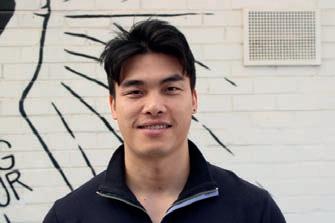
Victor Vu is the 2024 ASCA Latte Art Champion. Born in Vietnam, Victor worked for three years in hospitality before coming to Australia where he has spent the past eight years perfecting his latte art skills.
Victor won the 2018 Milklab Barista Battle, 2020 and 2024 ASCA Australian Latte Art Championships, and placed fifth in the 2022 World Latte Art Championship. He currently works at Ona Coffee Melbourne.


Coming full circle

Emma McDougall is the Communication and Administration Coordinator for the NZSCA. After gaining a degree in hospitality management, Emma has worked in Sydney, Dublin, Auckland, London, and most recently, Wellington. She has owned and managed cafés and tech-judged the New Zealand Barista Championship in 2015 and 2016. Now, she gets to help run them. One of the greatest joys she gets from the coffee industry is watching young people progress through their coffee journey.



‘Like’ us on Facebook
@BeanSceneCoffeeMag
Follow us on Instagram
@beanscenemag
Follow us on LinkedIn
@BeanSceneMag
t’s a challenge to take over the editorship of any magazine, let alone one that has been led by someone so ingrained in the industry for such a long time. I’m not just new to the job, but also BeanScene and Australia, yet taking on the role feels like coming full circle for this pom.
Back in the United Kingdom, my first job fresh from university was as an editorial assistant at a small indie publishing company in a rural corner of England. The year was 2014 and the UK’s specialty coffee scene was starting to rear its head outside of London. I didn’t know a flat white from a long black, but my first assignment was to research independent cafés and roasteries in the South West region for a specialty coffee guide to help the coffee conscious track down a great cup.
As my journalism skills advanced and my coffee knowledge grew, so did the success of the guidebooks. I started travelling around the UK and Ireland meeting café owners and roasters to hear their stories. Every venue was unique, yet there was a common influence behind almost every one I visited: antipodean coffee culture.
Of the thousands of owners, baristas, and roasters I met over my seven-year editorship of the coffee guide series, nearly all of them had spent time in Australia or New Zealand. They had fallen in love with the lighter roast style, flat white format, and collaborative community atmosphere and wanted to introduce a slice of that easy-going coffee lifestyle back home.
It wasn’t just the coffee they had gone head over heels for but also the brunch culture that accompanied it. Amid a backdrop of frosty windows, dark mornings, and persistent rain, cafés across the UK started serving tropical
açai bowls, petal-strewn bircher pots, and avocado toast – hundreds of miles from the closest avocado farm.
Australia’s coffee pioneers haven’t just had a huge influence on its national café culture, they’ve also changed the coffee landscape in other countries inspired by their focus on quality, creativity, and innovation. It’s not only the UK upon which Australia has had a profound impact: travel just about anywhere in the world and you’ll find an enthusiastic barista serving specialtygrade coffee waxing lyrical about their time in Melbourne.
Therefore, to relocate to where it all began feels like a natural step for me as a journalist and editor in the niche field of coffee. In many ways, immersing myself in the Australian coffee industry feels like peeking into the future, as I know the world is watching carefully to see which trends and innovations fly here, ready to road-test the winners in their own markets.
It can be hard to appreciate how much you’ve achieved or how far you’ve come when you’re on the inside looking out. Despite the challenges the industry has faced and continues to navigate, Australia remains an influencer in this space and your part – whether it be as a café owner, barista, roaster, trainer, or keen connoisseur – contributes to the community.
I look forward to meeting as many of you as possible as Editor of BeanScene, and can’t wait to hear and tell your stories of Australia’s very special coffee culture.
KATHRYN LEWIS EDITOR



BeanScene Magazine
Find us online
EDITOR’S NOTE 8 beanscenemag.com.au

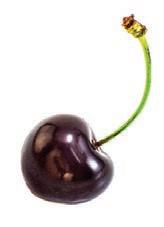



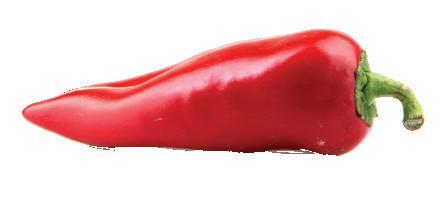
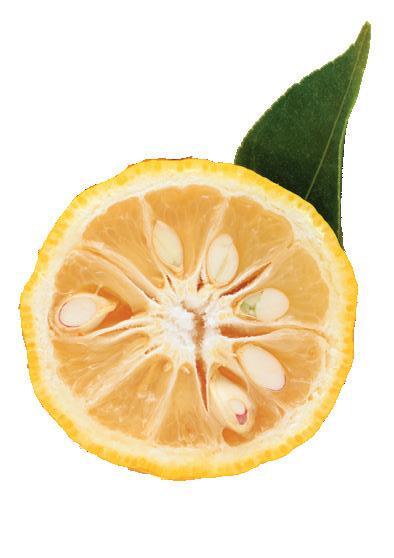


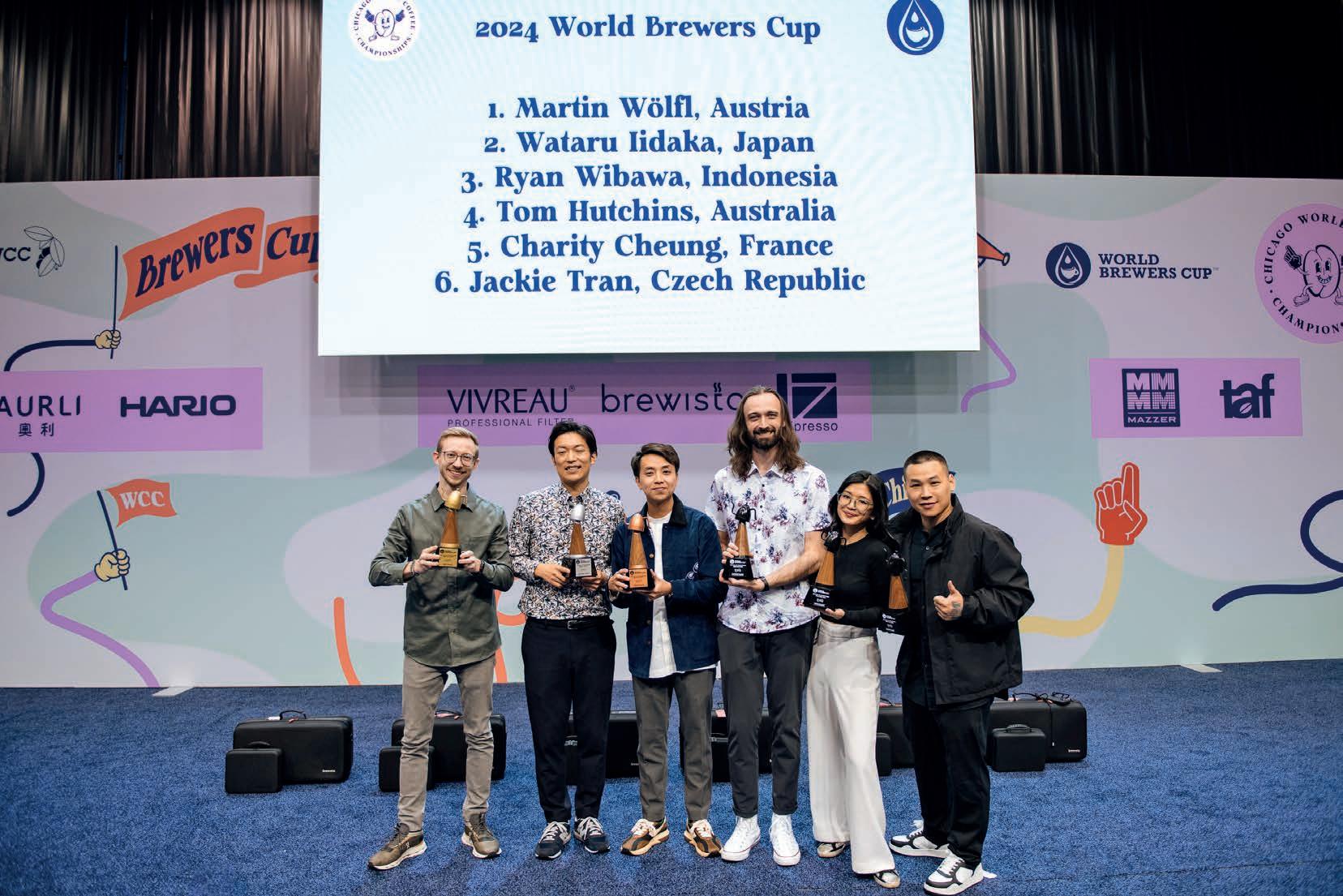
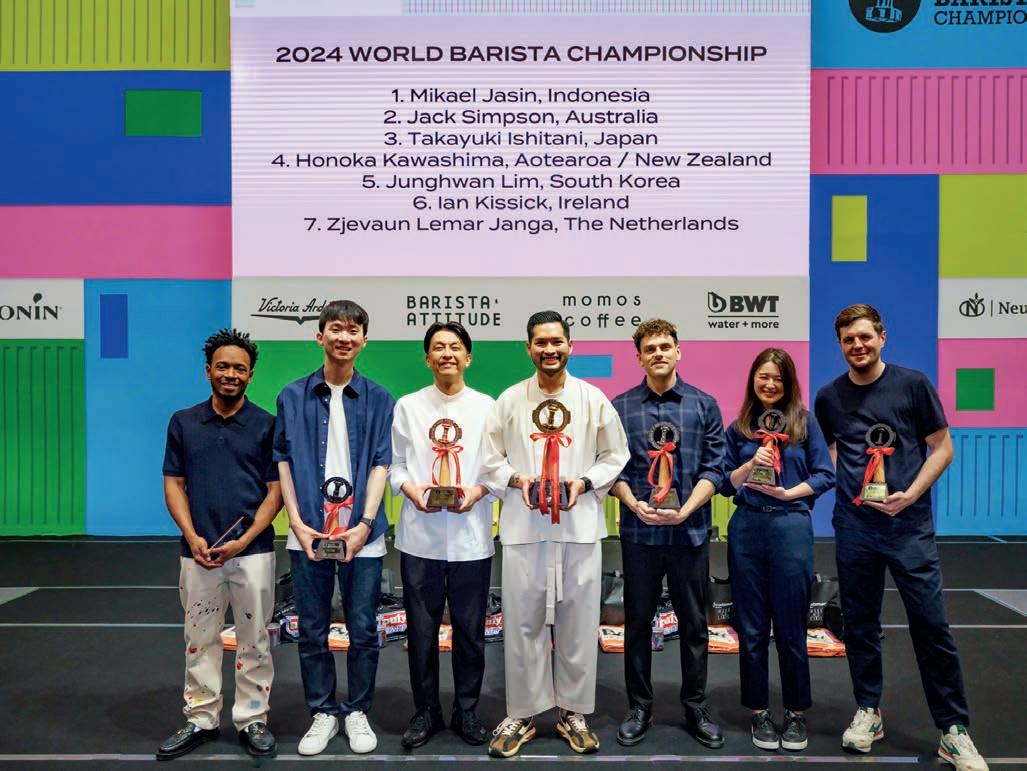
Following four days of thrilling competition and taking on 52 competitors from around the world, Mikael Jasin of Indonesia was crowned World Barista Champion 2024 at World of Coffee Busan on 4 May.
“It still feels surreal to be the World Barista Champion. After working for it for so long, I’m very grateful, and hopefully I can put the platform I’ve been given to good use,” says Mikael.
Australia’s Jack Simpson of Axil Coffee was runner up, Japan’s Takayuki Ishitani placed third, New Zealand’s Honoka Kawashima placed fourth, South Korea’s Junghwan Lim placed fifth, Ireland’s Ian Kissick placed sixth, and The Netherlands’ Zjevaun Lemar Janga placed seventh.
Mikael’s performance was centred around mindfulness.
“This idea came from my journey of
burning out after my last World Barista Championship (WBC). As a competitor, I didn’t achieve the ranking I wanted back then. Through that experience I had to detach a little and see competition from a different angle. I realised I could talk about this and how finding mindfulness helped me get back on track,” he says.
For the espresso round, Mikael showcased a Panama Geisha. For the milk and signature rounds, he used an Ethiopian landrace coffee from Colombia.
Australia’s Jack missed out on the top spot by a single point to Mikael.
“Personally, I’ve poured my heart and soul into this routine over the last six months. Falling short by one point stings, but that is competition. I’m so grateful to have the honour to represent Australia on the world stage, not just once but twice. I
has inspired me so much,” Jack said postcompetition.
Jack’s routine focused on the pursuit of constant improvement.
In his espresso course, Jack showcased a nitrogen macerated Geisha coffee, courtesy of producer Jamison Savage of Finca Deborah in Volcan, Panama. For his espresso, Jack described the tasting notes as blood orange, yellow, peach, black cherry, and an aftertaste of brown sugar, with a medium weight, juicy texture, and lingering rich finish.
For his milk course, Jack featured a Pacamara coffee from Jhonatan Gasca of Finca Zarza in Colombia. He used a combination of 90 per cent full cream milk waved for two hours, and 10 per cent cryodesiccation coconut milk. Jack described the flavour profile as “sweet cherry, melted chocolate ice cream, and shaved coconut”.
For his signature drink, Jack utilised a combination of the Geisha and Pacamara coffees. He used 80-millilitres of distilled peach honey using a rotary evaporator with a vacuum pump. This allowed Jack to collect the hydrosol, which is the water that’s normally lost through regular distillation. He added 80-millilitres to his drink, followed by 100-grams of chinotto. These ingredients were paired with two espresso shots of the Geisha, and two shots of the Pacamara coffee. Jack described the tasting notes of mango, passionfruit, dried apricot, and orange soda.
The Australian competitor called time at 14 minutes and 56 seconds in his final performance.
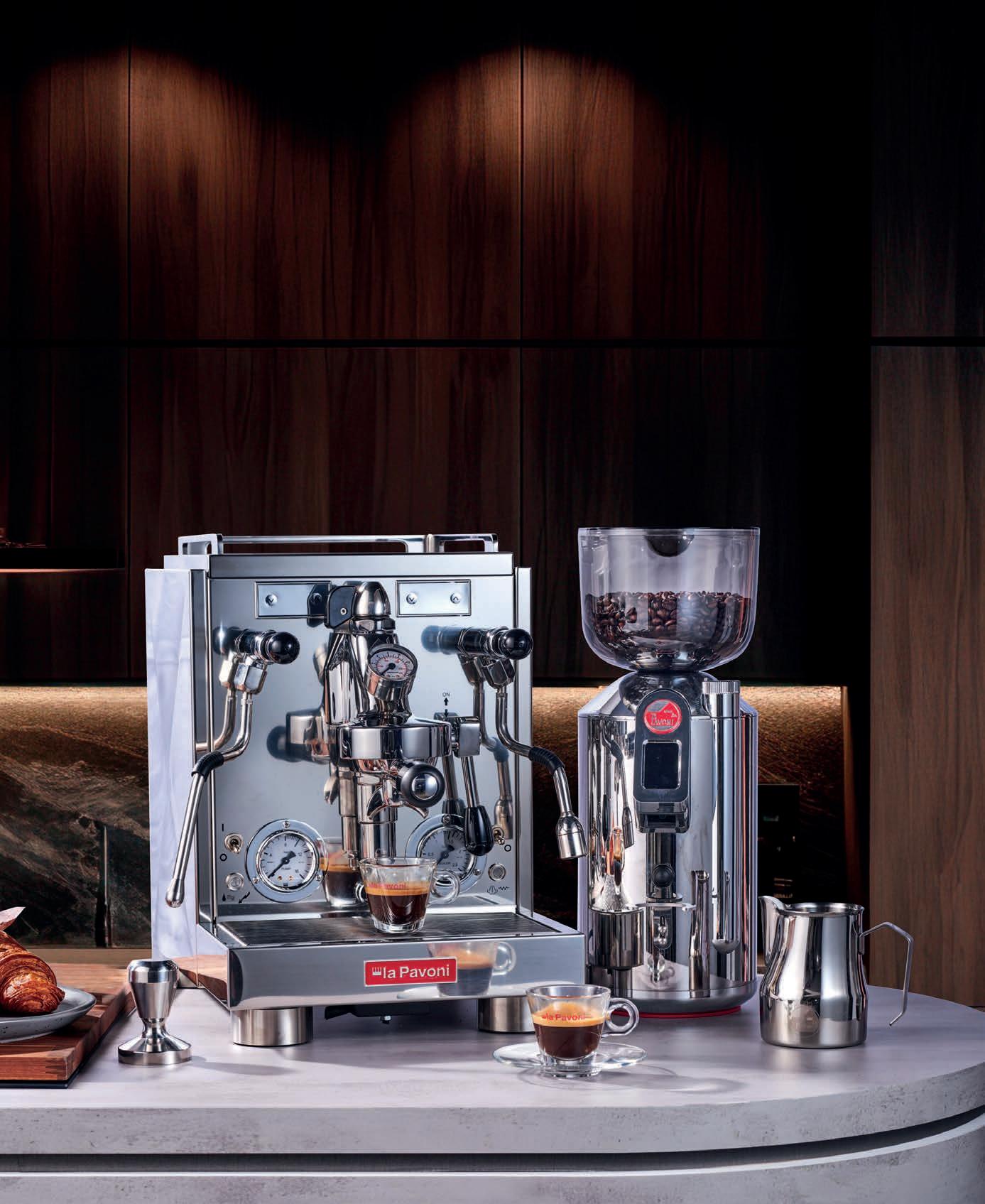
10 beanscenemag.com.au
The top seven WBC Finalists featuring winner Mikael Jasin and runner-up Jack Simpson (fourth and fifth respectively from left).
The top six World Brewers Cup Finalists including Australia’s Tom Hutchins (third from right).




The new La Pavoni Botticelli is equipped with a dual PID system that allows regulation of the water temperature, ensuring the control of thermal stability for a perfect coffee.
PANTONE 032 PERFECTLY IN
CONTROL
La Pavoni reflects the defining characteristics of Italian design, elegance, originality and premium performance. au.lapavoni.com THE SECRET OF REAL ITALIAN COFFEE. SINCE 1905
Stuff on the scene
Arkadia
Since 1997, Arkadia has served the industry with beverage solutions that keep café customers coming back for more. In 2024, the company is unveiling a contemporary new look, with refreshed packaging being rolled out over the coming months. While its branding gets a makeover, fans can rest assured the taste of Arkadia’s formulas, such as the crowd-favourite Chai Spice blend, will remain unchanged.
For more information, visit arkadiabeverages.com.au
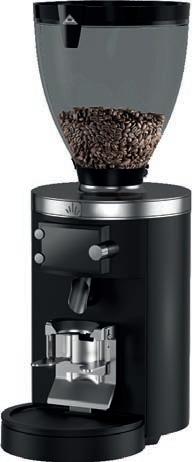
Mahlkönig E80W Grind-by-Sync
The Mahlkönig E80W Grind-by-Sync is equipped with cloud-enabled connectivity, and offers an electrical adjustment of the burr distance. This adjustment can still be controlled manually by the barista or, when synchronised with an espresso machine, aligned automatically with the target extraction time. The E80W Grindby-Sync incorporates an intelligent algorithm, enhancing its ability to manage burr distance with precision to ensure the optimum grind. The Mahlkönig Sync application, Hemro Group’s cutting-edge digital solution designed to enable customers to manage their E80W Grind-by-Sync grinders and coffee operations, is available for download at the Apple Store and Google Play. This platform harnesses the power of data to elevate the art of professional coffee preparation, benefitting equipment users, roasteries, coffee retailers, equipment distributors, and service partners alike.
For more information, visit mahlkoenig.com
GROSCHE Yukon Insulated Coffee Tumbler
The new Yukon Insulated Coffee Tumbler range is the latest addition to GROSCHE’s line-up of quality coffee and hydration gear, designed with a greater purpose. Made of stainless steel and BPA free, the Yukon is triple-wall vacuum insulated and dishwasher safe. Featuring a clear leak-proof sip lid, generous size options (20 ounce and 32 ounce), and car cup-holder compatible, the Yukon range is the ideal vessel for any beverage on the go. Additionally, every Yukon purchased supports GROSCHE’s Safe Water Project, which provides drinking water for those in need. The Yukon is available in five different colours.
For more information, visit coffeetools.supply/grosche



Mytico
Discover Franke’s Mytico line, a blend of tradition and automation. Its first two models, Due and Vario, are game-changing solutions for the hospitality industry. IndividualMilk Technology provides the ultimate coffee and milk fusion experience, catering to various preferences including lactose-free and vegan diets. The PrecisionFoam technology dispenses milk foam directly from a dedicated spout into the milk pitcher at the desired consistency, temperature, and quantity, while simultaneously brewing coffee. Both technologies are available with the Mytico Vario model. Franke’s Mytico line ensures consistency in every cup and promises an unparalleled coffee experience that will delight customers.
For more information, visit mytico.franke.coffee
Maltra Foods. Image: Hemro. Image: Franke. 12 beanscenemag.com.au PRODUCTS
Image:
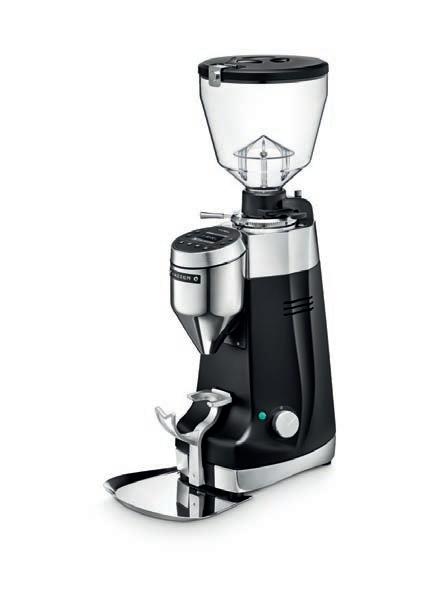
Tone Touch 01
Mazzer Kony Sg
The Kony Sg is Mazzer’s first commercial gravimetric coffee grinder, designed for medium-volume venues and specialty coffee shops. Its vibration control system ensures all doses are weighed, eliminating time-based dosing even when used in environments with many vibrations. The grinder features a professional-grade built-in scale that can weigh each dose within a precision of one hundredth of a gram. It also features 63-millimetre conical burrs, designed and produced in the Mazzer factory near Venice. With 420 revolutions per minute (50 hertz) and a double cooling system, the grinder protects the coffee beans from heat exposure, making it suitable for medium-volume coffee shops. Kony Sg also features the Grind Flow Control (GFC) system, which includes a removable aluminium outlet insert equipped with a through-flow wire damper that responds to the coffee flow.
For more information, visit
The Tone Touch 01’s multifunctional brewing solutions allow the barista to serve a variety of beverages from one device, delivering coffee and tea, hot or cold, at the touch of a button. The function to provide cold water dilutions for iced beverage preparation makes it unique in the market. All parameters are easily adjustable, which allows complete control over water quantity, time, and temperature. Highest temperature stability plus the specifically developed spray-head enables a uniform and gentle extraction to get the best out of every coffee and tea. The Touch 01’s intuitive interface facilitates programming and the barista’s daily operations. For recipe creation, the Tone recipe control system enables the barista to adjust key brewing parameters and find the optimal extraction. It has the operational capability to take the modern brew bar to the next level.
For more information, visit baristagroup.com.au

Build full bodied and balanced extractions with Mazzer’s first grind by weight with the Kony SG. Fitted with a low RPM conical burr grinder and a professional-grade built-in scale, deliver consistent and precise doses time and again.
Get the most from your bean with Mazzer Philos. Your premium light commercial grade grinder is choice for high demand in small spaces. Optimise workflow and minimise waste with zero retention – suited for a range of extraction methods.


Image: CWE. MELBOURNE | INFO@CWE.COM.AU | 03 9462 5055 WWW.COFFEEWORKSEXPRESS.COM.AU SYDNEY | SALES@CWE.COM.AU | 02 9533 2693
TO MEET MAJOR DEMAND KONY SG

Nathan Toleman grew up with a dream to be a hotel manager. He’s come close, becoming a hospitality visionary who, for more than 30 years, has established some of Melbourne’s most iconic cafés that pair quality food and coffee. They include Apte, Three Bags Full, Top Paddock, The Kettle Black, Higher Ground, Liminal, Square One Rialto, and he’s not done yet.
14 beanscenemag.com.au
HOSPO HEART
Images: Mulberry Group.
Nathan’s world
Founder and Executive Chairman of The Mulberry Group Nathan Toleman is a pioneer of the Melbourne café scene. He talks about hotel robberies, cutting costs, and the art of giving people what they want.
athan Toleman can’t help himself. Before taking a seat for this interview, he springs into action, greeting a guest, clearing a few tables, and helping wait staff prepare for the busy midweek lunch rush that the city of Melbourne so desperately craves.
“I still love it. It’s just the waiter in me,” Nathan says. “If I see a table that has a plate or glass on it, I’ve got to clear it.”
Nathan ushers over a latte at Square One Rialto and takes a rare moment to pause. He reflects on his busy week and that he’s flying on the red-eye to China tomorrow to assess a supplier fit-out deal that seems almost too good to be true.
The zeros at the end of the price tag are still eye-watering, yet Nathan says it’s a far cry from the first venue he recalls building, designing, and fitting out for $50,000 with his chef wife Sarah Foletta.
“We borrowed all the money we had. We bought the chairs at auction for $1. We even built the tables. My mum and dad helped me do the garden and painting. All our equipment was second-hand,” says Nathan of Apte, a former milk bar-turned restaurant in Alphington, Victoria. “Within a few months, it was a raging success with queues out the door. [Renowned food critics] Matt Preston and Dani Valent reviewed it early on, and in our first year we won the Delicious Café of the Year Award.”
Nathan single-handedly designed and built the next five or so venues, but over time, he has come to understand the value of using a good architect. The reality, he says, is that it still costs between $5000 to $6000 per square metre to design and fit out a café.
“Unfortunately, a lot of the money you just don’t see. It’s in consultants, service engineers, town planners, or building surveyors. The mechanical expenses can often cost upwards of $100,000, things the customer may not notice but definitely affects them,” Nathan says.
“We opened Lilac Wine in Cremorne last year on a really tight fit-out budget of around $1200 per square metre, way less than the industry average. We bought all the tables, chairs, and sofas secondhand, and my son and I painted the floors ourselves. We went back to basics to show it can still be done.
“People want to be in a nice, comfortable, welcoming space, and often that comes with lighting, music, and the people in it. The reality is, the more you spend on fit out, the more pressure there is on the business from the start, and ultimately, the customer is going to have to pay for that.”
To curb costs, Nathan says working within a budget and sticking to it is key. He recommends cost-effective ideas like giving a venue a fresh coat of paint, buying secondhand equipment and furniture at auctions, and only spending an affordable amount on new lighting, tables, and chairs.
“We buy a lot of plates from the op shop. That’s what we did for [restaurants] Hazel and Dessous. They cost $1 each and tell a story,” he says.
“HOSPITALITY IS ABOUT GIVING PEOPLE WHAT THEY WANT, AND WELCOMING THEM INTO YOUR PLACE. IF YOU DON’T, THEY’LL JUST GO SOMEWHERE ELSE.”
Nathan’s foray into hospitality was met with intrigue and excitement at eight years of age when he and his sister visited the now closed Marysville Hotel with their parents. It was five o’clock on a wintry Friday afternoon. Inside the venue, Nathan recalls a beautiful warm atmosphere with a real sense of energy. The owner provided a backstage pass for Nathan to see “where all the magic happens” before an unusual turn of events.
“My sister and I went exploring by ourselves in the basement and saw these guys taking all the money out of the pool
table pockets, filling up their bags, and we helped them do it,” Nathan describes.
When he eventually went back to his parents and chatted to the owner about helping the staff do their job, the owner had a puzzled look on his face. He eventually informed Nathan that the men were not staff but actually thieves.
“We had inadvertently helped rob the Marysville Hotel. But we managed to point the guys out in the bar and got them arrested. It just added to the excitement of this world of hospitality I was experiencing,” Nathan says.
“From that moment, when people asked me what I wanted to do when I grew up, I’d say ‘I want to be a hotel manager’.”
Nathan took his first steps towards that dream at age 15 when he started working in a pizza restaurant after school. When he finished Year 12, he went to William Angliss Institute to study hotel management and, one year later, landed a job at the newly refurbished Victoria Hotel on Little Collins Street. On opening night, there was a sea of mature-age wait staff, and 19-yearold Nathan.
“I learned so much from the experienced people – professional hospitality veterans – and I threw myself into it. I loved it,” Nathan says.
He worked his way up the hospitality chain, starting as a junior manager at The Victoria Hotel before taking the same role in a Cairns venue after graduating.
A few years later at age 23, Nathan went to Japan for six years to teach English and came back a little disinterested in hospitality. He grappled with the idea of becoming an architect and took a job as a design consultant working with a shop fitting company. This opportunity allowed Nathan to learn about metal work, joinery, design, and construction. He says it wasn’t until the opening of Apte at age 33 that he finally found the fire in his belly to create an inviting space from a blank canvas.
“All the energy in the room from the staff and customers helped create a life that really fuelled me,” he says.
Not long after, Nathan fitted out an old abandoned art gallery in Kinkora Road, Hawthorn, on a similarly low budget and opened his first café, Liar Liar, with original owners Nolan Hirte of Proud Mary, and Diamond Rozakeas. It was well received.
beanscenemag.com.au 15 KNOWLEDGE LEADER
Two years later in 2010, Nathan sold both venues to start Three Bags Full Café in Abbotsford. That’s when things “really took off”.
“That was the point when we went from being a little café to a serious café. At that time, there were lots of big and great restaurants and lots of good coffee houses, but there were no big, serious cafés with a serious kitchen. We noticed a real gap in the market. Imagine if you could merge the two,” Nathan says.
And that’s what he did. By adding six commercial chefs to the kitchen, producing restaurant quality food at a café price point, customers started queuing 45 minutes for a seat. Three Bags Full “moved the dial” and influenced a wave of other venues making quality food and coffee more accessible.
Nathan’s choice of roaster has also been an evolution, starting with Atomica Coffee at Apte before Three Bags Full became Five Senses’ first Melbourne account, which Nathan says “lifted our coffee game”. The Perth-based roaster went on to fuel Nathan’s other venues including Two Birds One Stone in South Yarra, Top Paddock in Richmond, The Kettle Black in South Melbourne, and Higher Ground in the CBD. The next natural progression was to start roasting his own coffee. Nathan launched Square One Coffee Roasters in 2015, just a few years before selling his café portfolio to Darling Group.
“We felt like we’d achieved everything we could in the café space. For me personally, [opening cafés] was no longer as fulfilling or rewarding as it used to be. Personally, I felt like something was missing,” Nathan says. “As a hospitality operator or restaurateur, I realised I needed to look after not just the chefs in the industry, but also the food system, because without food we’re in trouble. That’s where Common Ground Project started.”
Profits from Square One Coffee, and all Mulberry Group venues, go to Common Ground Project, a regenerative agricultural farm and social enterprise which also creates employment pathways for asylum seekers.
Nathan stepped away from café operations for a few years to focus on Common Ground Project before coming back to his roots and opening Heide Kitchen, Liminal, and Square One Rialto to break the mould and prove he and his team could manage bars, restaurants, and cafés simultaneously.
“A bar is just a coffee shop with alcohol,” Nathan says. “Both are just as hard in many ways. It still takes really good produce and really good people to make it work.”
In mid-June, Nathan will open Molli, a neighbourhood wine bar in Abbotsford,

for Melbourne’s hospitality businesses, with multiple lockdowns, declining city workers, and inflation rises putting more pressure of venues to deliver experiences where customers feel they’ve received not only a great meal, but more bang for buck.
“As an organisation, now more than ever, we need to find ways to offer guests more value, and then it’s about creating ‘hot towel’ moments, delivering unexpected, above and beyond surprises. They create moments where you can really connect with the customer and hopefully win them over for life,” Nathan says, noting examples of gifting a bag of Square One coffee to Danish tourists after bemoaning they hadn’t had time to visit a Melbourne café during their trip, or sourcing a Carlton Draught longneck that wasn’t on the menu for a customer while dining at Hazel.
“Fundamentally, hospitality is about giving people what they want, and welcoming them into your place. If you don’t, they’ll just go somewhere else,” he says.
Equally, Nathan says venues need to find ways to cut costs with food prices rising.
product oversupply that would otherwise go
terms of coffee prices]. When you think about it, coffee beans travel the furthest distance to get here, and our staff costs are higher than anywhere else in the world. It’s got to change. It’s about being honest with customers and making small incremental changes that don’t affect people too much because they’re already stretched financially,” he says.
In today’s climate Nathan anticipates further consolidation of the café market. While it is harder to enter, he says there’s still great opportunities for independent operators to make their mark with strong demand for quality food and access to great producers.
“It’s an exciting time. I’m really proud of Melbourne’s food scene,” Nathan says. “Fundamentally, people are hardwired for connection. Things are changing, but we still love to get out, enjoy a meal, and be around other people. We say food brings people together, and I think coffee does the same thing. From our perspective as a business, we see [hospitality] as a way to support our communities, and build a better world. How lucky are we to do just that.”


16 beanscenemag.com.au
All profits from Square One Coffee go to Common Ground Project, a regenerative agricultural farm and social enterprise.





From bold kick to mild brew, experience the ultimate flexibility in ground coffee brewing. Available exclusively through: www.coffeetools.supply

BORN TO EAT CURIOUSLY
Sofia Levin’s #EatCuriously movement encourages people to order outside their comfort zone. She has made a career through exploring culture and community through the lens of food, and this year becomes a MasterChef Australia judge alongside Andy Allen, Poh Ling Yeow and JeanChristophe Novelli, airing Sunday to Wednesday from 7.30pm on Channel 10 and 10 Play.
18 beanscenemag.com.au grfsgds
Images: Network Ten.

Levin her best life
MasterChef judge and journalist Sofia Levin talks to BeanScene about the café culture that helped kickstart her food career, and the cultural diversity found through Melbourne’s brunch scene.
hirteen years ago, an upand-coming journalist and blogger by the name of Sofia Levin contributed to an article in BeanScene about the influence social media was having on café preferences. Fast-forward a decade of success as a food writer and globally travelled eater, and Sofia has walked onto the MasterChef Australia set as one of the new judges for season 16.
“It’s wild. It’s still not real as far as I’m concerned. I keep waiting for it to stop feeling like a ‘pinch me moment,’ and so far it hasn’t happened,” Sofia tells BeanScene
“The first time I walked through those [MasterChef studio] doors, [chef] Jamie Oliver was there. Everybody was so energised by being around him and just how wonderful, kind, and generous a person he is. Skip forward nearly five months to the final week of filming; looking at the contestants and seeing how far they’ve come and their incredible growth, not just as cooks but people – and realising how much we’ve been part of that is really special.”
Sofia writes about food for a living, but under the MasterChef spotlight she hopes to make her own mark as a judge by encouraging the contestants with enthusiasm and her philosophy to ‘eat curiously’.
“I want to see them dive in and give it everything they’ve got, and not be afraid to cook dishes that may be deeply personal or cultural, because when they back themselves, the results are incredible,” Sofia says.
“It’s also about the opportunity to learn as judges. If you can feed somebody something they’ve never tried before, it’s such a special thing. You can decipher whether a dish is good or not from how it’s presented and the story behind it, as well as what it tastes like.”
The same can be said for a good coffee, Sofia says. She attributes her love for black coffee – and the occasional macchiato – to Sunday morning brunch with her family growing up, where her parents would order lattes and she would scream for a babycino until she was old enough to understand the complexities of coffee.
“Learning about quality coffee comes from being a Melburnian, and one who, dare I say, loves to eat and is in the lucky position of being able to visit many different restaurants and cafés,” Sofia says. “It feels
By Sarah Baker
like I’ve been subconsciously training my palate my whole career. The more you eat and consequently understand flavours, the more you can pick those flavours in foodadjacent categories, like coffee, wine, and even botanicals.
“For me, the best food has a real pureness and clarity to it – you know exactly where it’s from and what it’s trying to do. And I think it’s the same with coffee.” Sofia leans towards delicate flavour profiles without bitterness or a strong fruit or acidic profile, but equally something that’s not overly rich and chocolatey.
“FOR ME, THE BEST FOOD HAS A REAL PURENESS AND CLARITY TO IT – YOU KNOW EXACTLY WHERE IT’S FROM AND WHAT IT’S TRYING TO DO.”
At home, she uses her AeroPress for her first cup of the day, and maybe an hour or so later will visit local favourite Napier Quarter in Fitzroy for a $2 espresso at the bar.
Based in Melbourne’s inner north, Sofia’s list of go-to list places is based on level of enjoyment and proximity. For strictly coffee and nothing else, she enjoys Acoffee in Collingwood, to impress an interstater with interesting coffee and food she’ll visit Industry Beans in Fitzroy, and for the atmosphere and generous food it’s over to Terror Twilight in Collingwood.
“Terror Twilight is probably the only place I’ll order a non-traditional coffee because I like my coffee straight up and down, but they do a coconut cold brew that tastes like dessert. I’ll always ask for a little spoon so I can eat the coconut flakes off the top. I just love it, especially on a hot day,” she says.
Sofia has watched Melbourne’s café scene evolve firsthand. What’s been most interesting to observe in the past decade, she says, is its diversification, with more cafés serving cultural dishes that represent their owner’s identity.
“Everybody’s done the avocado and toast thing with some poached eggs, but I love it when operators answer the question: ‘What’s my version that speaks to my story?’ You will see people offering Sri Lankan hoppers alongside scrambled eggs, for example, or the many cafés serving Japanese food for breakfast, which I think is brilliant,” Sofia says.
The introduction of these diverse cafés are another revelation for Melbourne coffee, turning many travellers’ cherished food memories into a reality, from Vietnamese coffee with its sweet notes and condensed milk, to meticulously made Japanese filters, and rustically presented Ethiopian coffee with burning incense and popcorn served on the side.
“It’s such an amazing ceremony to witness. I love seeing the coffee poured from a height. It’s super strong to drink but so beautifully prepared and served,” Sofia says.
Despite all the interesting and vibrant coffee scenarios Sofia has witnessed around the world, she’s adamant her hometown does it best.
“I could be biased, but it’s also because it doesn’t matter if you’ve experienced great coffee here or overseas, you can get a brilliant version of it in Melbourne. We’re kind of a ‘jack of all trades’ when it comes to coffee, and pretty bloody good at all of them,” she says.
Also pretty good was Sofia’s family’s attitude about trying different cuisines and cultures when she was growing up. With half her family living in the United Kingdom and the rest in Australia, she was exposed to travel and different cultures from a young age, with both families often finding a halfway meeting destination.
“It’s that beautiful cliche where every culture is so deeply proud of their food, and they want to share it. It doesn’t matter whether you speak the language or not, there’s always somewhere you can eat, whether it’s at a café, restaurant, or around someone’s table. I found it completely enthralling,” Sofia says.
beanscenemag.com.au 19 CELEBRITY COOK

A career in food was never part of the plan. Sofia studied marketing and psychology for a year-and-a-half until she deliberately took the second semester off university to backpack for nine months across Europe with a friend.
“We loved it. We went and did all the cultural stuff and saw so much of Europe, so by the time we had done a clockwise loop and popped over to Morocco from Spain, it was like we had entered a different world. It was unlike anything I’d ever seen before. I was really affected by that experience and the night markets, the people, and how interesting the food was,” Sofia says. “I thought, ‘maybe I can do this as a job’. I didn’t know what that meant or how it looked, but I figured journalism was probably the best way to do it. I sought the lifestyle before the study.”
Back home, Sofia swapped the marketing component of her course with journalism subjects. She started a food blog initially to impress her journalism tutor, but it consequently ended up being a handy portfolio of work when she started to freelance.
“I didn’t set out to write about cafés, restaurants, or food. I just wanted to write about the things I enjoyed, which was the way food opens minds and doors, rather


CELEBRITY COOK
Sofia shares lesser-known food stories from around the world on her website, Seasoned Traveller.


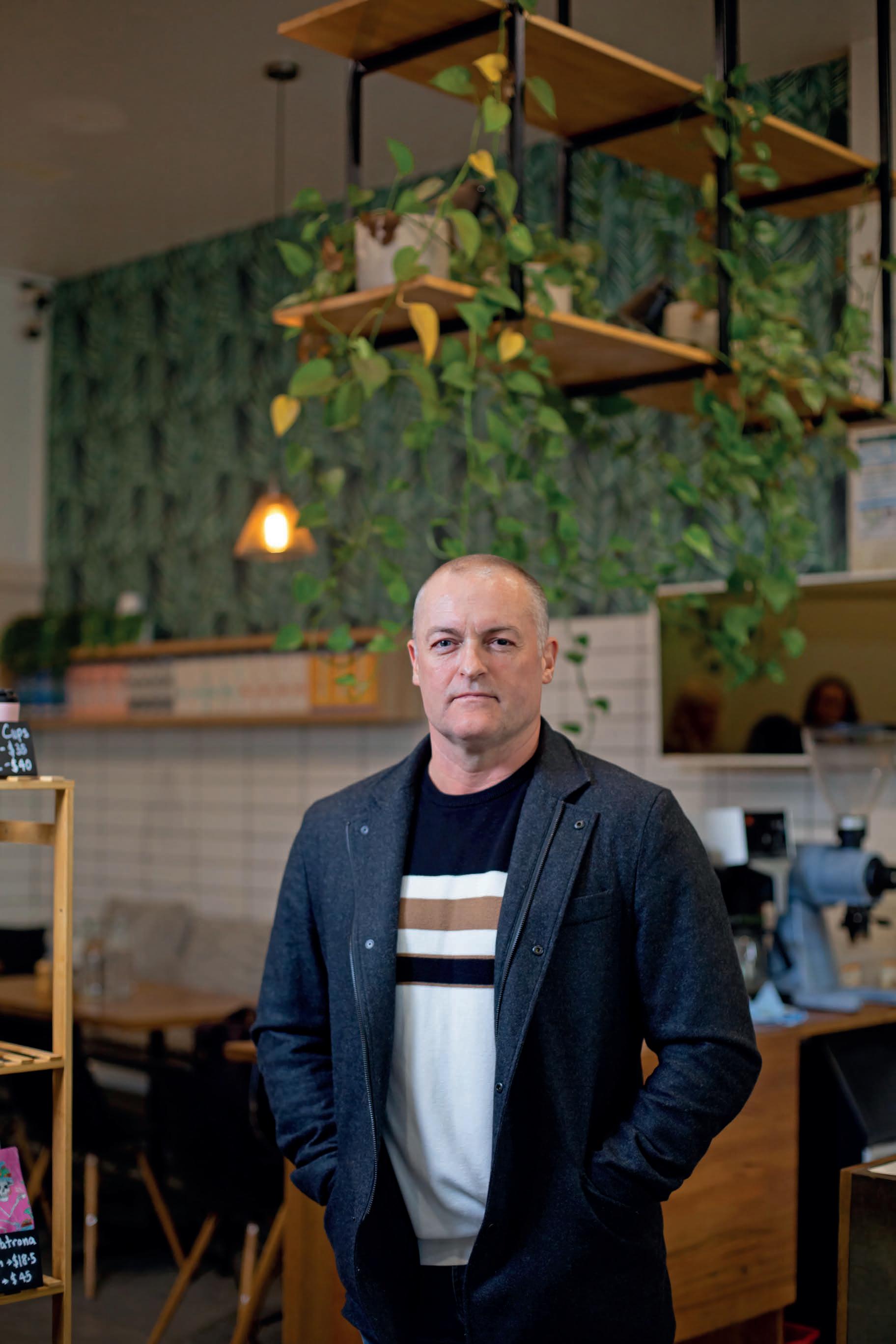
22 beanscenemag.com.au
Founder Stacy Visser started The Bean Cartel as an office coffee supply company.
Image: Prime Creative Media.

Against the odds
From losing everything to building a rapidly expanding coffee brand, The Bean Cartel Founder Stacy Visser shares his journey and the challenges that made him a better businessman.
mall business owners know success isn’t always linear, but for Stacy Visser it took hitting rock-bottom to shift his mindset, focus his vision, and establish a brand that would go the distance. Today, his company is one of Australia’s most rapidly expanding coffee roasters, with The Bean Cartel’s Melbourne roastery this year doubling its capacity. Despite this, it was through adversity that Stacy and wife Alison learned the essential skills for business success.
“It can be easy to look at how well we’re doing now and assume it’s always been this way and that it’s been easy, but that’s not the case,” says Stacy.
To understand where The Bean Cartel is now, you have to go back to before it was even an idea in Stacy’s mind – back to the late 1990s, to be precise. Young and keen to
bought the first Boost Juice franchise in the country. Seeing the success McDonald’s had with its breakfast bundle, Stacy introduced a three-group coffee machine to one of his Subway stores, which proved a huge hit. With his attention captured by coffee, Stacy decided to open two cafés in quick succession with the aim of creating his own franchisable brand.
“I got cavalier and thought everything I touched turned to gold,” admits Stacy.
“My first Subway store didn’t make any money for the first two or three years, but by doing 90-hour weeks and supporting ourselves with second jobs we managed to turn the tide on that business. I thought because I’d turned the first store around I could do it again and again, but that wasn’t the case.”
The two cafés quickly started pulling money from the other businesses and before
We eventually lost everything: we lost our house, my car was repossessed, I had to pull my children out of their school.”
Despite hitting rock bottom, Stacy wasn’t ready to admit defeat. Thankfully, there was one final shred of hope for him and his young family that allowed them to restart their lives in Melbourne and give the coffee industry another go.
“I didn’t want to feel like I’d failed. I could have gone back to my previous job in the pharmaceutical industry and earned good money but I wasn’t passionate about it, and I would have felt like I’d wasted 10 years trying. It was a mix of pride and ego,” he says.
“While we had lost everything, the bank had forgotten to remove a $20,000 overdraft from my account and that’s what we used to start the office coffee business that would grow to become The Bean Cartel as it is

beanscenemag.com.au 23 COVER STORY
Stacy says The Bean Cartel wouldn’t be where it is today without his team.
Image: The Bean Cartel.
his team but also to the skills and learnings gleaned from his previous mistakes.
“One of the greatest changes I’ve made as a businessman is being more patient. Everything is slower and more strategic now. Someone once said to me ‘I’m going slowly because I’m in a hurry’. I didn’t get what they meant until I had to start again and reflect on how I’d approached the business,” he says.
‘Timing is everything; you can’t rush success. You might want to be in a certain place, but you have to plan the journey to get there. The result is I’ve achieved more with this business in a shorter time than I did with the franchises in Adelaide.”
One of the other changes, on the back of a suggestion from wife Alison, was to introduce a female voice to the management team. With a strong background in the industry, Melissa Glentis joined The Bean Cartel as National Sales Manager in 2022.
“One of the best lessons I learnt was that business is not always about branding or even the product, but the most important factor is your team. Even at 50 years old, I’m still learning every day from the people around me,” he says.
For small business owners just starting out, Stacy believes following your ambitions is the key to success.
“Follow your dreams and don’t quit until you realistically can’t give any more. However, you also have to be conservative and if the writing is on the wall, you can’t let your ego get in the way of making the right decision,” he says.
It hasn’t been complete plain sailing for Stacy since he moved to Melbourne –
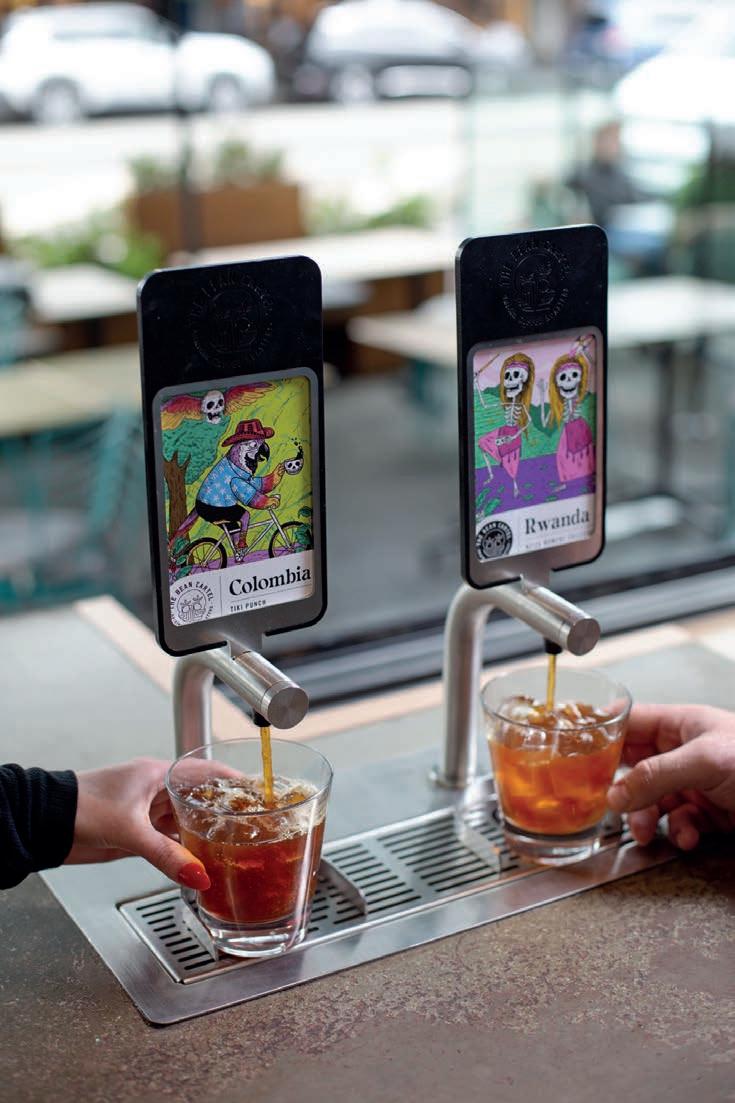
a bit later than the big boys and it takes time to gain respect in an industry like this, especially when there are so many wellknown brands. I’m very proud of what we have done in such a short amount of time.”
Rebranding was a major focus of the shift to specialty. The switch from what Stacy describes as “vanilla” to “crazy” branding has put the The Bean Cartel firmly
customers to introduce integrated batch taps
“The batch taps we’ve installed in places such as Fed Café in Melbourne’s Albert Park show that we’re not scared to push boundaries in the specialty space. In 2022, we launched our batch taps at the Melbourne International Coffee Expo, and were the only company at the show with this technology,” says Stacy.

The batch taps are a great way for café owners to showcase The Bean Cartel’s constantly shifting single origins, with unique graphics from Colombian artist Alejandro Giraldo displayed on the taps and signifying the characteristics of each.
“Tiki Punch, a natural anaerobic process coffee from Colombia, is by far the most popular on the batch taps. The flavours are incredible, whether prepared as hot batch or cold brew, with notes of almond, cranberry, papaya, and pineapple. We’re the only roaster in Australia working with it.”
And innovation won’t stop there for The Bean Cartel. Future plans for the company include taking the brand international, with projects already underway in Asia. Stacy says no idea is too out-there, and that his office door is always open to any team member who wants to share their suggestion.
“Whether they’re a delivery driver, a packer, or a sales manager, no idea will be shot down,” he says.
For more information, visit thebeancartel.com.au

 From left: Husband-and-wife team Alison and Stacy Visser, with The Bean Cartel National Sales Manager Melissa Glentis.
From left: Husband-and-wife team Alison and Stacy Visser, with The Bean Cartel National Sales Manager Melissa Glentis.
C M Y CM MY CY CMY K
The Bean Cartel has installed batch brew taps at partner venues across Victoria.
Image: Prime Creative Media.
Image: The Bean Cartel.



Go with the workflow
BeanScene chats to some of Barista Group’s key café partners about why they love collaborating with the Australian equipment distributor.
electing the right coffee equipment supplier is an important choice for any café owner to make, with margins, workflow, customer satisfaction, and more on the line if the wrong decision is made. For Lumos Café Owner Lynn Hu, partnering with Australian distributor Barista Group in 2020 solved many of the issues she was facing.
“At the time, there was a serious labour shortage in the hospitality industry and we were struggling to keep up with demand. We started looking for high-quality equipment that could replace human labour,” says Lynn.
“We had tried working with other distributor brands, but the quality of equipment wasn’t stable and needed regular maintenance. Then we found the Übermilk [automatic milk frother] through Barista Group and realised what an asset it was. It steams milk better than the average barista and made our lives a lot easier.”
Rather than using steam to heat and texture milk, Übermilk syphons the desired volume of milk from the refrigerator into an aerator, where a needle valve controls how much air is incorporated into the milk. The milk then runs through a high-power heater and filter, resulting in micro-foamed milk dispensing direct from the nozzle.
“As opposed to hand steaming, where there’s often wastage in the jug, with the Übermilk you only dispense the milk needed,” Lynn says.
“Übermilk takes away the worry of whether your staff are burning or under steaming the milk. It also attracts better quality baristas; when I’m hiring and a barista sees we have an Übermilk, it excites them because they know the burden of watching milk steam isn’t on them.”
After the success of Übermilk, Lynn started looking at the other products Barista Group offered. It wasn’t long before she also saw the Tone Touch 03 single serve brewer as a “must-have”.
The Tone Touch 03 features an intelligent recipe development system, which enables 100 per cent customisation of coffee beverages, including the ability to vary product, volume, flow, strength, and temperature.
It also offers controlled agitation, programmable flow rates, and detailed adjustment of pulse patterns at different stages of brewing (blooming, turbulence, and development). The boilerless standalone brewing system channels brew water through a highly innovative heating element that eliminates the need for a traditional heating phase.
“The barista can easily adjust brew recipes to profile a range of coffee beverages by varying temperature, brew time, and a host of other parameters. The brewer has all the operational capability to take the modern brew bar to the next level,” Lynn says.
“Both the Übermilk and Tone Touch 03 can stand on their own, but together they
26 beanscenemag.com.au INDUSTRY PROFILE
Lumos Café uses the Übermilk, Tone Touch 03, and Markibar Izaga W grindby-weight grinder. Image: Lumos Café.
create an extremely efficient workflow.”
Lynn says Barista Group also provides support by improving her barista workstation and constantly upgrading equipment.
“Whenever we install new products, Barista Group will help us set up the machine and give us a very detailed introduction of how to use it. They’ll even suggest where we should put it in the café to improve our workflow,” she says.
“They also update their product line continually to include the latest models. I first bought the original Izaga Key without the scale inside. After just one or two years, they had upgraded the machine to the grind-by-weight version. This has helped me save one kilogram of coffee a day, as it each shot is weighed out and distributes the exact amount of coffee needed.”
Botero Coffee is another partner that appreciates the service and quality Barista Group provides.
“Two years ago, I met [Barista Group General Manager] Joe Chalhoub at the Melbourne International Coffee Expo and was keen to check out the Markibar Izaga W grind-by-weight coffee grinder. He provided all the useful information we needed to get on board and we’ve been working together ever since,” says Botero General Manager Jayc Salter.
Designed for efficient workflow, the Izaga W grinder combines practicality and functionality in two operating modes, Instant Dose and Grind on Demand.
In Instant Dose mode, the grinder delivers an instant grind-by-weight dose, eliminating the need for baristas to weigh doses, saving up to seven seconds per espresso drink. The Izaga’s traditional setting Grind on Demand caters to offpeak periods.

“The grinder’s innovative grind-byweight technology with instant scalecontrolled dosing guarantees maximum consistency and quality in all coffees, without barista adjustment,” says Jayc.
According to Jayc, the Izaga delivers constant doses despite changing the grinding point, which can be altered to finer or coarser without affecting the coffee dose delivered to the filter.
“It also isn’t affected by natural burr wear and tear, changing the type of coffee used in the grinder, or environmental factors like temperature, humidity, or sunlight,” he says.
Jayc was blown away by the service and attention to detail he experienced when visiting the Barista Group headquarters in Sydney, New South Wales.
“Joe spent the day with our technicians explaining the inner workings of the grinder. We loved seeing the workshop and appreciated the personalised service. We’re located in a rural area, so it’s nice to know
I can shoot him a text and he’ll always reply straight away, whether I have a simple question about the machine or need a spare part. Anything we need, Barista Group has us covered,” he says.
“Usually company higher-ups don’t get involved in small tasks like that, but Joe is hands on and immerses himself in the business.”
Little Italy Coffee Roasters Owner Adam Bortz is another partner of Barista Group that views the company as more than just an equipment supplier.
“The team at Barista Group don’t just sell us machines, they actually give us suggestions about what equipment could ease our workload and take on board market feedback. This has encouraged us to purchase more and more equipment from them and is why we started using the Izaga W grind-by-weight grinder,” says Adam.
Adam has worked with Barista Group for five years due to the distributor’s reliable and competitively priced equipment.
“Joe told us to test out the Izaga W before giving us a tutorial on how it worked. We trialled it in one of our cafés on Christmas Day, which is always busy. I think we did 1000 coffees in six or seven
hours. When I saw what the Izaga did for our workflow, efficiency, and the consistency of the coffee, I was sold straightaway,” says Adam.
“The following month I bought 10 to 15 Izaga W grinders for our café customers. The ease of training the grinder offered, especially for cafés outside of Sydney that we didn’t have the ability to see on a weekly basis, was amazing. The simplicity of the grinder empowers our baristas and gives them confidence in the consistency of our coffee.”
Adam says working in such a dynamic, fast-paced industry requires constant equipment updates and insider knowledge, which is what Barista Group provides.
“Working with someone like Joe who always has his finger on the pulse builds loyalty with us. For example, a few of our customers told us they didn’t like the Izaga stepped collar. Six months after we mentioned it to Joe, the new Izaga W models no longer included stepped. That close relationship is super important to us,” he says.
For more information, visit baristagroup.com.au

beanscenemag.com.au 27
The Izaga W grinder is designed for efficient workflow. Image: Botero Coffee.
ROASTING ON BIOENERGY FOR 15 YEARS.
After-hours café culture
MONIN Creativity Cup Australian finalist Jake Mai shares his tips for maximising afternoon sales with ingenious signature serves.
he current economic climate is making it harder for small businesses like cafés to balance the books, with owners exploring all avenues to maximise sales. As some choose to close their doors early to cut staffing costs, others are extending them to capitalise on the hours they’re still paying rent.
The flavour specialists at MONIN are partnering with coffee shops venturing into the afternoon and early evening market across Australia, helping them to devise signature drinks, cocktails, and mocktails. Jake Mai of Stitch Coffee in Sydney is a 2023 MONIN Creativity Cup finalist and loves working with the brand’s psychedelic range of syrups to craft bespoke drinks.
“A lot of people think of vanilla, caramel, and hazelnut lattes when they imagine syrups, but at Stitch we don’t actually offer any of those on our menu,” says Jake.
“Instead, we use MONIN’s syrups and purees in a range of different serves, our most popular being the yuzu and watermelon nitro cold brews. They’re a huge hit and make great pairings to brunch or as afternoon alternatives to a cocktail.”
Working as both a roaster and barista at Stitch, The Coffee in Good Spirits 2024 competitor enjoys nothing more than devising creative drinks. He says the majority of afternoon customers are looking for something less caffeinated, so the addition of a few specials alongside the coffee options on the menu will appeal post 12pm.
“Traditionally, non-caffeinated beverages at coffee shops have centred around juices and smoothies, but they’re very general – they don’t tell you anything about the character of the venue. This is where I think signature drinks can help your café stand out from the crowd,” says Jake.
“Currently, I’m really into crafting cold-brew teas. One of my favourite combinations is jasmine tea, steeped in cold water overnight, then mixed with MONIN lychee syrup and a squeeze of lemon. It’s super refreshing and easy to prepare in advance.”
For the cooler months, when café goers seek comforting non-caffeinated options, Jake recommends creating a twist on the classic chai latte.
“Whereas traditionally you would steam chai syrup with milk, I like to steep it in hot
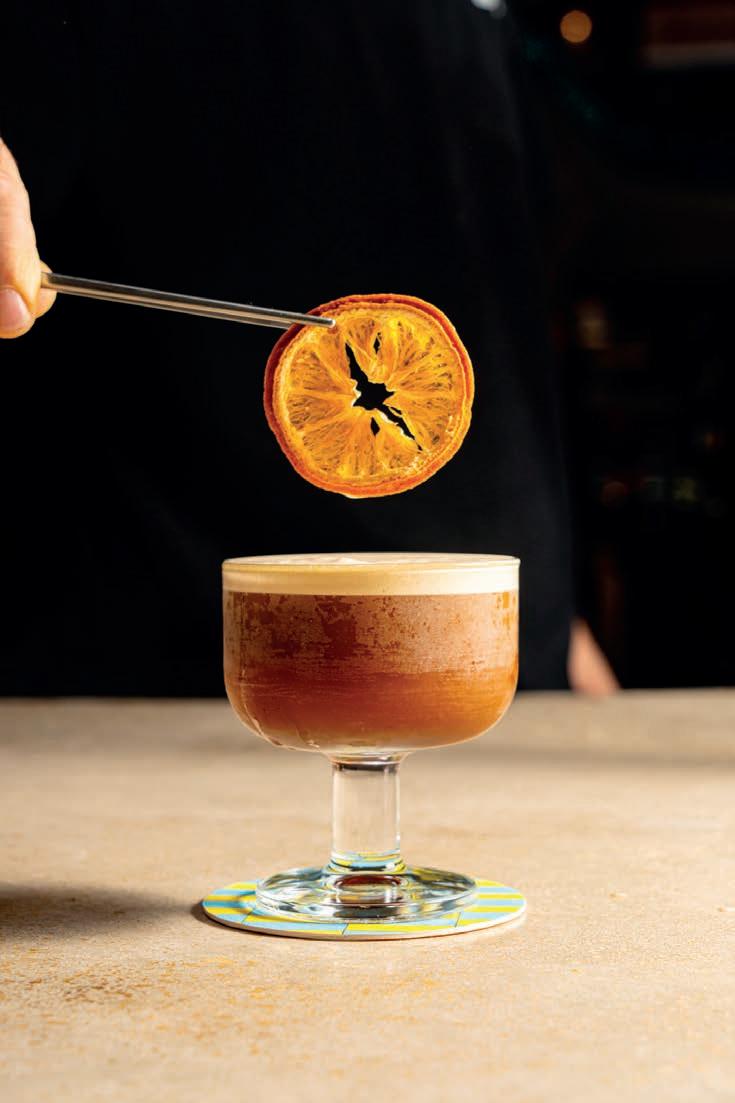
water with lemongrass and honey. It creates a cleaner flavour profile, but is equally soothing in winter,” says Jake.
Customers love variety, and one way to keep them coming back for more is by shaking up the menu on a regular basis. Jake doesn’t believe you have to rewrite the drinks list each season, but that introducing a few signature serves is away to keep regulars on their toes and attract people to visit after the morning rush for coffee.
“Switching up the menu every month seems like a great idea, but in reality most cafés don’t have the staff or the time to devise and prep a whole new menu of drinks that regularly,” he says.
Every artist’s method is unique and there is no right or wrong way to approach the creation of a new drink. For Jake, it’s all about the visuals.
“I’ll usually start out with a brief idea, but nothing concrete. I’ll first think
with something such as berries,” says Jake.
“Say I’m creating a coffee cocktail, I’ll start with the coffee as that’s the main component and find something that can stand up to the flavour and intensity of the alcohol. From there, I’ll look for either complementary ingredients with similar taste profiles or something that will contrast.”
For venues thinking of expanding their beverage repertoire after dark with an alcohol licence and a cocktail menu, Jake recommends putting a spin on the signature espresso martini by adding a MONIN syrup.
“Nutty and chocolatey flavours are the natural pairing here. Roasted hazelnut or macadamia work really well,” he says.
For more information, visit monin.com
beanscenemag.com.au 29 INDUSTRY PROFILE
Image: Stitch Coffee.
Jake Mai recommends switching up the classic espresso martini with a dash of MONIN syrup.
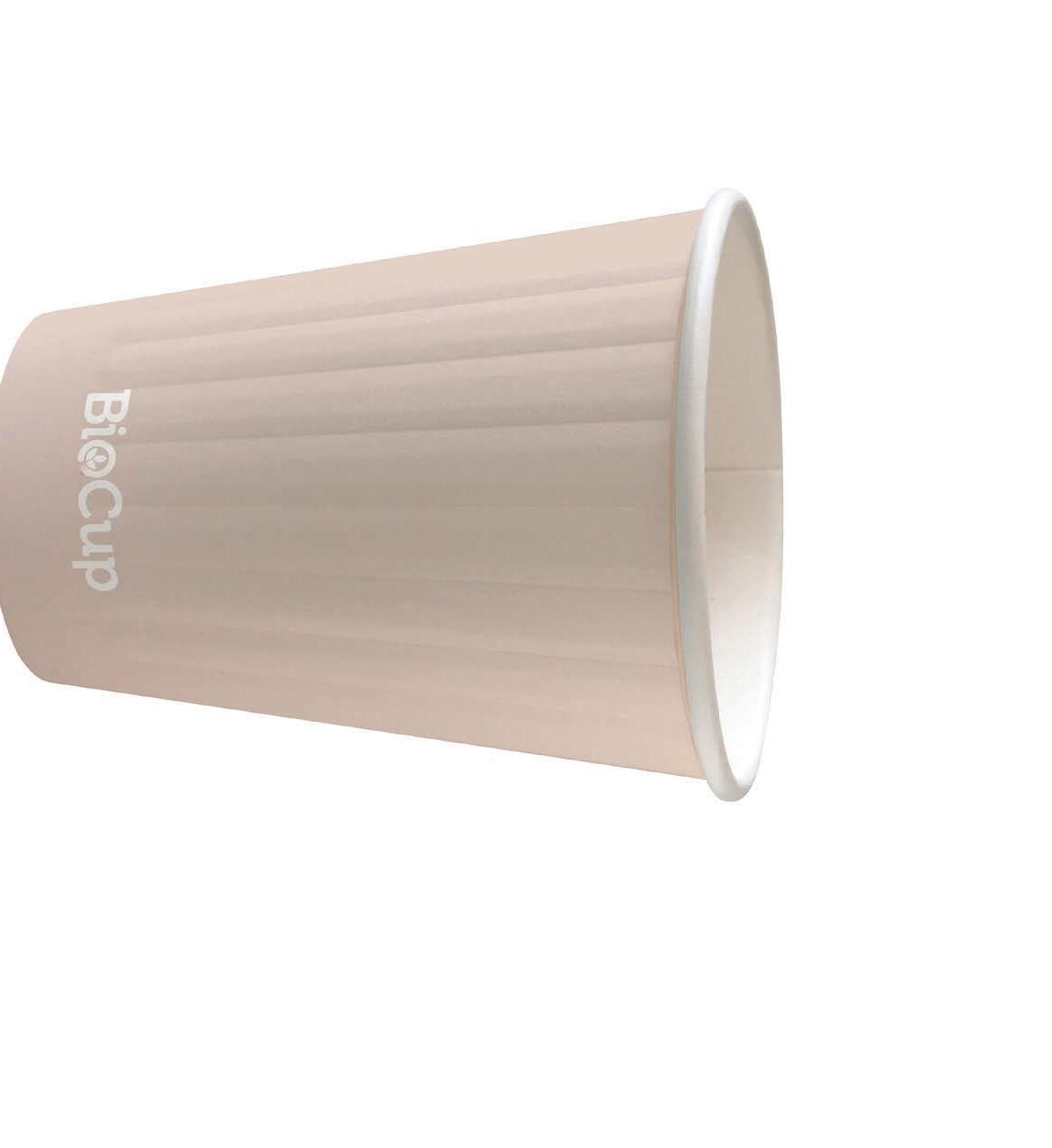




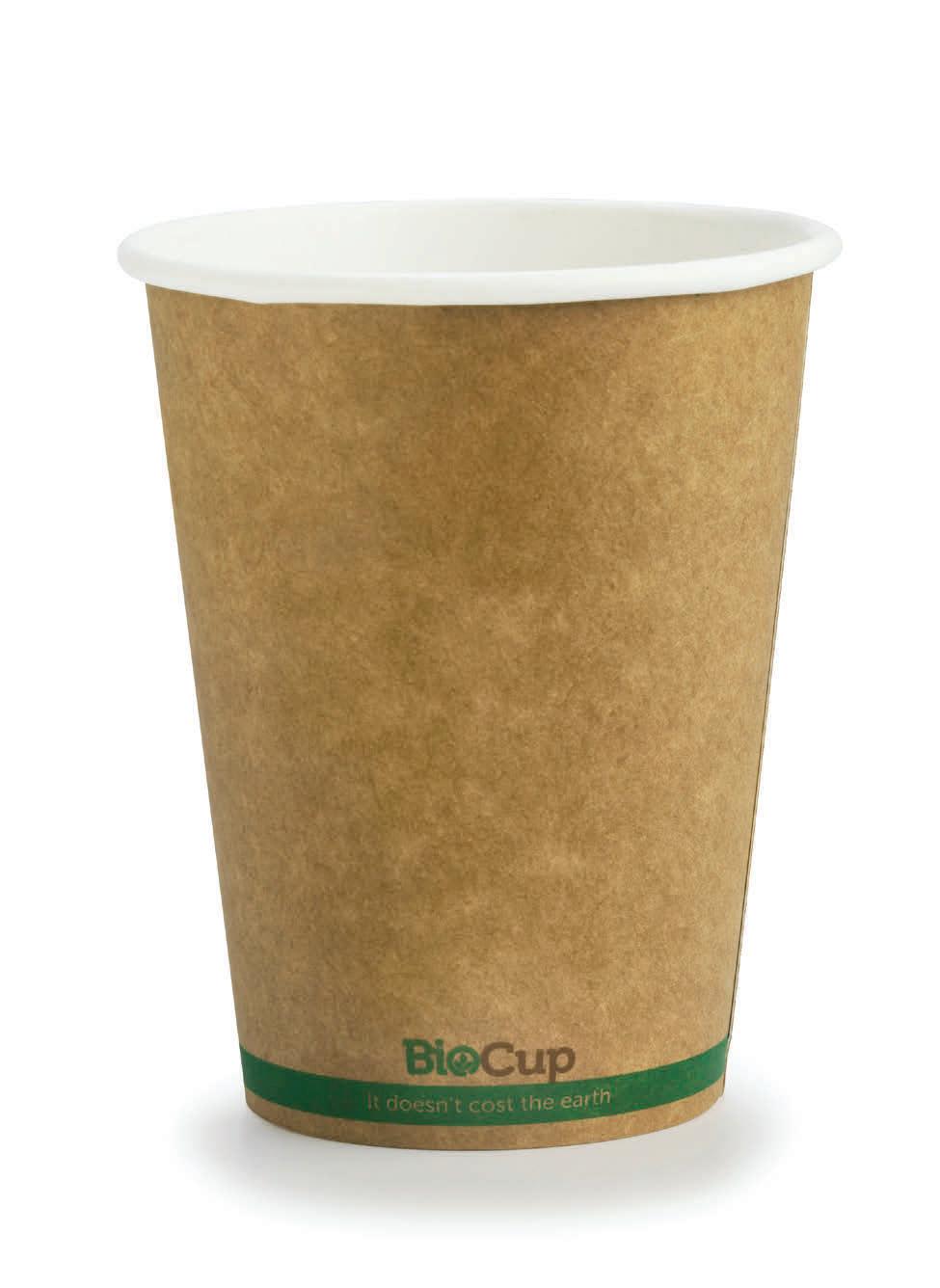



MAKE THE SWITCH TO OUR HOME COMPOSTABLE BIOCUP RANGE!
www.biopak.com
Water-Based Aqueous Coated Cups



Land of milk and coffee
Zentveld’s discusses its partnership with Milklab and their shared passion to operate sustainably.

or most people, the early stages of a new relationship is all about excitement, exhilaration, and fireworks. That initial buzz was experienced by coffee farm and roastery Zentveld’s and premium barista milk brand Milklab when they started working together.
After just a few meetings, both brands saw great potential to grow together sustainably, and collaborated to stock Zentveld’s New South Wales coffee house with Milklab products, including its popular reusable coffee cups.
“We see Milklab as an industry leader for alternative milks in Australia. The company has strong vision and branding, and it’s easy to see they are committed to partnering with other businesses in this space that share their values and sustainability ethos,” says Rebecca Zentveld, Director of Zentveld’s.
“We use Milklab in our coffee house on our family farm and have combined our social channels to bring audiences high-quality content, which showcases and
promotes both our businesses.”
Milklab milks are specifically designed to complement espresso coffee. Its range features almond, oat, soy, macadamia, coconut, full-cream dairy, and lactosefree milks.
Rebecca says Milklab’s oat milk is her biggest seller. It’s made from 100 per cent locally sourced Australian oats from growers across Victoria and South Australia.
“We are excited to now also offer Milklab macadamia milk, made from 100 per cent Australian macadamias. Choosing local has been our ethos since we started, so it feels like a perfect pairing to celebrate local nut milk with our local coffee blends,” Rebecca says.
“Offering the full crop-to-cup experience is pretty unique and we are pleased to share it. From the veranda, our farm views extend across macadamia hillsides. Serving Milklab macadamia milk, with our homegrown coffee, is the epitome of localness in a cup.”
Rebecca set up Zentveld’s coffee roastery on her 18-hectare family farm in the hills
behind Byron Bay in 1993, five years after the first arabica coffee trees were planted in New South Wales. Her parents, June and John Zentveld, are a driving force behind the area’s coffee farming industry.
“We grow coffee that’s naturally free of pesticides, which is remarkable as coffee is one of the most heavily sprayed crops in the world. With our cooler climate in the subtropics, we are free of coffee rust and berry borer, so do not spray any herbicides or pesticides on our trees,” she says.
Over the past 35 years, Rebecca and the Zentveld’s team have made a conscious effort to increase biodiversity on the farm to avoid a monoculture.
“The farm grows rainforest plantings, native shrubbery borders, orchard trees, flowers, fruits, vegetables, ground covers, and cover crops among the coffee rows. These benefit biodiversity and soil cover, and create an animal-friendly habitat. Because we don’t use sprays, we’ve welcomed collaborations with beekeepers, and now have over 36 native bee boxes and loads of honey hives on-site all year round. We even
beanscenemag.com.au 31 INDUSTRY PROFILE
Zentveld’s Director, Rebecca Zentveld, partnered with Milklab due to its likeminded business approach.
Images: Sam Down.
sell our own coffee blossom honey,” she says.
The focus over the last few years under Rebecca and husband John’s watch has shifted to looking after life below the soil, as well as life above it.
“Seasonal cover crop planting between the coffee rows adds life to the soil and encourages nutrient transfer naturally. Feeding the microbiome and activating the roots’ fungal pathways replace the use of commercial fertilisers,” says Rebecca.
“We are building plant resilience. We are producing coffee with minimal inputs, energy use and water use.”
Zentveld’s also makes its own compost. Plant trimmings, roastery chaff, spent coffee grounds, processing waste, and even plasticfree paper coffee cups are composted.
“What is waste to others is a valuable compost food source to us, so we accept local farm processors’ waste such as macadamia shells, wood chips, and even protein rich hemp seed husks,” says Rebecca.
“Spreading compost under the coffee trees cools the soil, holds moisture, and slowly releases nutrients. We also have a solar-powered roastery and coffee house with two big storage batteries that provide most of our electricity needs, cost-free from the sun’s rays.”
One of the reasons Milklab was eager to partner with Zentveld’s was the companies’ shared sustainable ethos. Milklab is Australian-owned and operated in Shepparton, Victoria, and Ingleburn, New South Wales, and its products have no artificial flavours, colours, or preservatives.
“We installed 10,000 solar panels on our Shepparton production plant, which cover 20 per cent of the site’s total usage. It’s the largest installation of its kind in Victoria and one of the largest in all of Australia,”

says Milklab Brand Manager Melanie Ung. Milklab’s product packaging is made with Forest Stewardship Council board, which supports responsible forestry and carries the Australasian Recycling Label logo to inform consumers on the best approach for pack recycling through kerbside streams.
“We encourage people to reuse our cartons as carry trays to give them a second life,” Melanie says. “We’ve also recently launched new reusable coffee cup designs, which are available on our online merch store. We’re collaborating with Zentveld’s to promote the cups to their community and give back to local charity organisations like the Byron Bay Wildlife Hospital and Australia’s Biggest Morning Tea for the Cancer Council.”
For the second year running, Milklab’s
stand at the 2024 Melbourne International Coffee Expo in May was made with saveBOARD, a low-carbon building material made from hard-to-recycle liquid paper board used in long-life milk and juice cartons.
“saveBOARD is focused on building a circular economy by turning composite packaging waste, such as milk cartons, ingredients bags, coffee cups, and soft plastics, into low-carbon products that can re-enter the local supply chain and eliminate future waste,” Melanie says.
saveBOARD manufactures highperformance building materials from its facilities in Hamilton, New Zealand, and Warragamba, Sydney.
The company upcycles packaging waste in Australasia through the implementation of scalable technologies which turn locally collected waste into locally distributed, recyclable building products.
“Each board saves 500 used beverage cartons from landfill, with each saveBOARD plant capable of recycling 4 million kilograms of soft plastics and fibre every year,” Melanie says.
“As a brand, we’re constantly looking for ways to increase the sustainable initiatives we undertake, including partnering with roasters and partners who share the same ethos. Whether that’s partnering with The Common Good Company to create sustainable merchandise which uses eco-friendly materials and ethical production practices, or promoting our recyclable milk cartons, we always try to put the environment first.”
For more information, visit milklabco.com or zentvelds.com.au


32 beanscenemag.com.au INDUSTRY PROFILE
Zentveld’s coffee roastery is situated on an 18-hectare family farm in the hills behind Byron Bay.
Milklab has released a range of reusable coffee cup designs.

Roasted to perfection, packed full of flavour, and now delivered to our café partners in a fresh new look.
Enquire today about how we can help inspire your tomorrow with the best training, equipment, and freshly roasted specialty coffee. ENQUIRE
Flagship ahoy
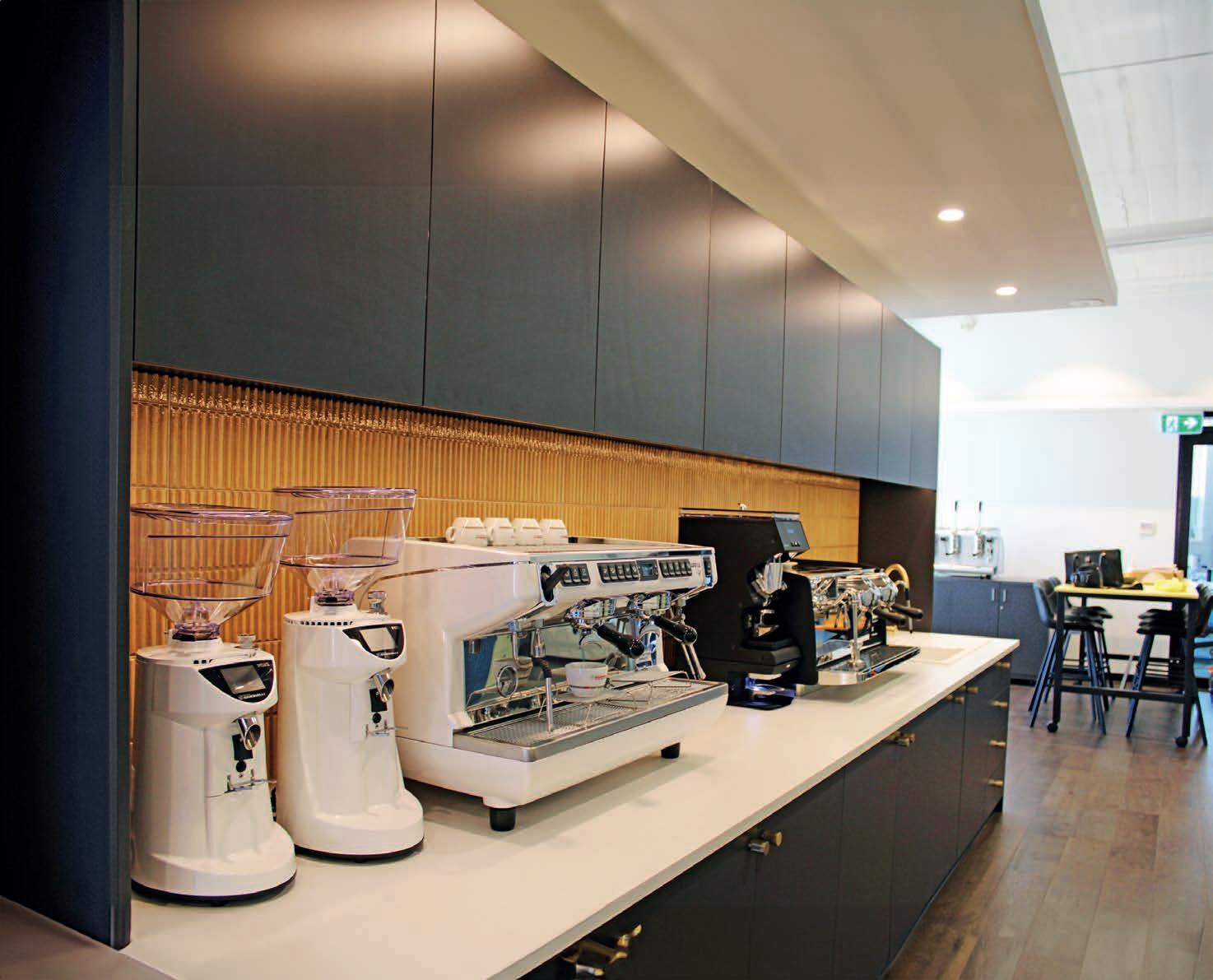
Simonelli Group has launched a new flagship branch office and experience lab to be even closer to the Australian market. The manufacturer explains how the lab is a space for customers to road-test the latest products and gain more technical support.
uova Simonelli and Victoria Arduino, sister companies under the Simonelli Group umbrella, have been active in the Australian coffee scene for more than 30 years.
While Victoria Arduino has gained momentum as one of the leading espresso machine and grinder manufacturers in the speciality market, Nuova Simonelli has long been known to produce traditional Italian workhorse machines.
Yet, despite their authority in the market, it wasn’t until recently that the Italian manufacturer has had a flagship venue in Australia.
On 13 May 2024, when the coffee world gathered in Victoria for the Melbourne International Coffee Expo, Simonelli Group launched its first Italian branch office in Australia.
Between cocktail, canapés, and music, industry movers and shakers were introduced to a little slice of Italian manufacturing heritage in the heart of Melbourne.
“Opening a Simonelli Group flagship branch office in Australia gives us a physical presence here and enables us to better support our Nuova Simonelli and Victoria Arduino brands,” says Andrea
Calvio, Simonelli Group Australia Managing Director.
“The flagship provides our customers with the opportunity to draw from our extensive technical expertise, global knowledge, and innovative training platforms across the full suite of the Group’s equipment and technologies.
“It also enables us to better oversee the brands and communicate our products within the market, Australia being one of the most influential coffee markets in the world. The branch will allow us to be more proactive and responsive in order to improve the ongoing natural evolution of our equipment.”
The Australian flagship is one in a large network of international branch offices around the world.
“A branch office is essential in achieving our human-oriented approach to the industry,” says Hannah Fielding, KA Sales and Marketing Manager at Simonelli Group.
“While our brands have been loved by the Australian coffee community for a long time, as a group we have so much more to offer. It is important how our brands show up in market and we want to ensure we add value to our partners – cafés, roasters, chains, and distributors – in a bigger way than ever before while also delivering
a better experience. We want them to feel closer to Italy and have a greater understanding of our values, innovation, sustainability, and education. What better way to achieve this than with a dedicated, highly experienced team right here in Australia?
“An Australia branch office not only allows us to respond quickly in a fast paced, ever evolving industry, but also enables our wider business to keep our finger on the pulse from a global scale.”
Due to the rapid evolution of coffee machines and grinders, together with the constantly developing technologies within the industry, Andrea says it can be daunting for some customers to choose the right product or solution for their business needs. He believes that now, more than ever, it is particularly important to have a dedicated team on the ground to ensure customers and partners are well informed and trained accordingly.
“Since I first worked with Nuova Simonelli 20 years ago, the Group’s machines and grinders have evolved drastically. In order to offer the very best brand experience, it’s now essential to be present and directly represent our brands in the Australian market,” he says.
The new Australian venue in
34 beanscenemag.com.au INDUSTRY PROFILE
The Australian flagship features a kitchenette.
Images: Prime Creative Media.

Melbourne’s Southbank is multifunctional, with a glass-encased showroom taking up the lion’s share of the floor space to display the latest Nuova Simonelli and Victoria Arduino models.
It’s flanked with a technician’s lab, training facility, board room, and small warehouse for stock.
“We see it more as an experience lab than a showroom. It’s a place where our distributors and customers can come and test our equipment and get to know the products and brands. It’s important for them to be able to feel, touch, and understand the machines,” says Zane Subritzky, Simonelli Group Australia’s Technical and Training Manager.
While the display space is the main event for visitors, the technical lab is where Zane applies his knowledge and expertise. Having a hub where he can listen to feedback from customers and filter it back to headquarters allows the engineers in Italy to tailor equipment and install optional accessories during the manufacturing stage. The latest round of updates on the Victoria Arduino Eagle Tempo, for example, focused on improving the new Easy Cream steam technology to ensure it produces consistently high-quality milk-based drinks in countries like Australia where a high percentage of coffees are paired with milk.
“Having a technical lab in Melbourne
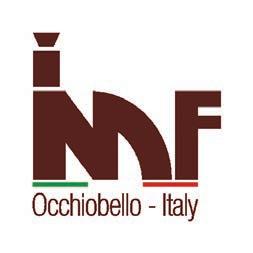

allows us to offer superior after-sales support, it’s also where Zane holds training sessions with partners that service our equipment throughout Australia. This is designed to give them a deeper understanding of our products and therefore resolve any issues quicker. It is also where we hold stock of spare parts to cater for any ongoing maintenance or warranty claims,” Andrea says.
Another benefit of the new space is being able to present and launch new products rapidly in Australia.
“Our experience lab is an open space, anyone in the industry can come in and test equipment – whether it be to trial one of our grinders with their coffee, see new models in person, or experience the full capabilities
of the Maverick and our PureBrew technology,” says Andrea.
Asia Pacific Sales Director
Piergiorgio Cannara believes having an Australian branch will further improve and expand Simonelli Group’s partnerships within the region, enabling the company to build stronger collaborations and an overall better brand experience for all of its customers.
On the back of the successful launch in May, the team are looking forward to hosting more events – both their own and in collaboration with the industry partners – at the central Melbourne experience lab.
For more information, visit simonelligroup.com
Incredible Coffee Roasting Equipment

• Consistent roasting to one degree accuracy (auto or manual control)
• 50 adjustable parameters per profile.
• 1000 profile storage.
• Recirculating heat technology saves up to 47% gas consumption.
• Cropster/Artisan datalog integration.
• Over 80 plants in Australia & NZ since 2012 installed by Roastquip.
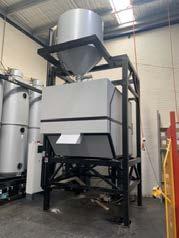
BLENDERS SHOP ROASTERS

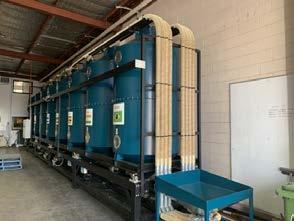
SILOS 0404-879-107 | sales@roastquip.com.au | www.roastquip.com.au
The new showroom highlights Nuova Simonelli and Victoria Arduino machines.

United through coffee
DaVinci Gourmet debuts its Barista Craft Championship, an event to highlight coffee’s artistry, craftsmanship, and shared passion that transcends borders.
n 2024, being a barista involves a lot more skill and ingenuity than simply brewing a cup of coffee.
For many years, beverage solution brand DaVinci Gourmet, part of Kerry Group, has been an advocate for the coffee community. As part of its supportive approach, it introduced DaVinci Gourmet Flavour Geniuses. The band of baristas recently developed an online video series designed to embrace the latest trends and insights, leveraging their creativity and expertise to craft unique and inspiring drink creations.
“Our Flavour Geniuses are baristas or mixologists by profession who use DaVinci Gourmet sauces and syrups to create masterpiece beverages. It’s all part of our mission to create unique sensory experiences for the consumer,” says Kerry Senior Brand Manager Wendy Lim.
In 2021, it launched the first digital Flavour Genius Academy platform including a full suite of online courses –covering topics such as basic knowledge, flavour profiles, equipment and tools, skills
and techniques, and recipes – to provide professional training and resources for baristas and mixologists in the Asia Pacific/ Middle East/Africa (APMEA) region.
To expand on this knowledge sharing and further support the coffee community, this year DaVinci Gourmet will launch the inaugural Barista Craft Championship.
“We are looking for the most innovative, progressive, and creative coffee-inspired drinks in the APMEA region to celebrate the diverse yet unifying essence of coffee culture,” Wendy says.
The competition will begin with national preliminary rounds in up to 20 competing countries, including Australia, Malaysia, the Philippines, Singapore, Thailand, Indonesia, Vietnam, Turkey, India, United Arab Emirates, Saudi Arabia, Bahrain, Qatar, Kuwait, Lebanon, South Africa, Kenya, China, Korea, and Japan.
In the first stage of the competition, baristas will be invited to submit one coffeebased beverage that must feature at least one DaVinci Gourmet product via digital submission. In Australia, this will take place
from 1 to 15 July and each beverage will be judged against a 20-point system.
“Six finalists from Australia will be selected to compete in the national finals, with face-to-face contests taking place on 13 September in Sydney, New South Wales. In this round, baristas will be asked to create one hot and one cold coffee-based beverage, using at least one DaVinci Gourmet product in each,” Wendy says.
All six finalists will receive prizes for making it through to the national round.
The top three placeholders in each country will be decided, with third place taking home AU$500, second place AU$800, and first place receiving AU$1000, plus flights and accommodation to Singapore for the grand final.
The Barista Craft Championship will culminate at the Food and Hotel Asia (FHA) HoReCa tradeshow in Singapore from 23 to 24 October, where a representative from each of the competing countries will present their perfected hot and cold beverages to a panel of judges.
“There will be three placeholders, with

36 beanscenemag.com.au INDUSTRY PROFILE
Image: MISTER DIN/Shutterstock.com.
In the Australian final, baristas will create one hot and one cold coffee-based beverage.
first place receiving US$3000 and a coffee experience trip to Korea,” says Wendy. “We’re offering very generous prizes and hope to attract some new talent across the APMEA region.”
The theme of this year’s competition is ‘United through Coffee’ and enhancing the sensorial coffee-drinking experience through flavour, where participants will present their signature blends that capture the essence of their respective coffee cultures.
“Our aim is to highlight the unifying power of coffee through flavour. Despite the diversity in brewing methods, preferences, and cultural rituals, one thing remains constant: the profound love and appreciation for coffee. It’s a reminder that amid our differences, a shared passion unites us all,” says Wendy.
As a partner of the café industry, DaVinci Gourmet understands the importance of cultivating its customers’ appreciation and passion for the complexities of the barista craft.
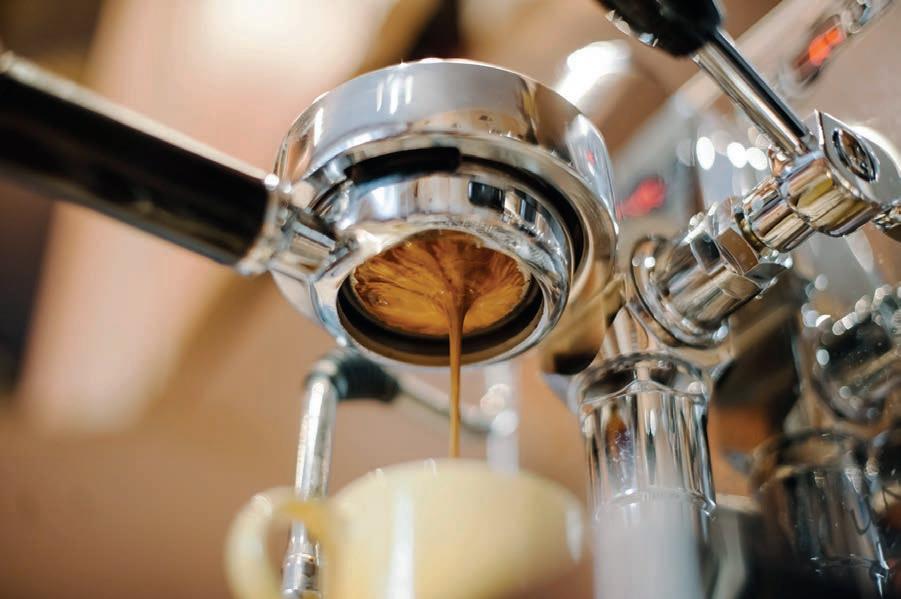
“When we talk about specialty coffee, many brands don’t want to use syrups. But the reality is a lot of cafés include syrups on their menus, not just for profitability but because the demand is there. Our goal is to elevate coffee, not overpower it,” Wendy says.
“We know the need for classic beverages like lattes or cappuccinos will never change, but we see the younger generation of coffee lovers are eager to create new and exciting beverages, and we want to stay relevant by working with cafés to continue that journey.”
Wendy says she is excited to watch the competition unfold.
“This competition is an opportunity to
expose new talent and connect the global community. We want to learn from this experience and find ways to deliver even bigger, better competitions that our barista community and the regional foodservice industry would be excited, and honoured, to be part of,” she says.
For more information, visit apmea.davincigourmet.com

In 1924, amid Hamburg's bustling industrial scene and renowned for its green coffee trade, the legacy of Mahlkönig began.
In reflecting on a century of craftsmanship, Mahlkönig looks forward to the next 100 years, which are sure to be filled with a continuation of the innovation, passion, and the relentless pursuit of perfection for which this global grinding pioneer is known.
DaVinci Gourmet aims to enhance specialty coffee with its syrups.
Image: AnastasiaNess/Shutterstock.com.



Passion for innovation
Coffee Machine Technologies on the evolution of Fiorenzato’s coffee grinder burrs and how its latest blades deliver maximum performance.
s the industry’s knowledge continues to grow, so too does grinder technology and mechanics in a bid to deliver the most accurate, efficient, and evenly distributed coffee.
The latest innovation from coffee grinder manufacturer Fiorenzato is its Dark-T grinder burrs. Australian distributor Coffee Machine Technologies says the burrs are designed to care for high-quality coffee.
“The Dark-T burrs are a great allrounder blade. Not only do they enhance the overall coffee experience, but they are also extremely durable, meaning you don’t need to switch out burrs as frequently and can therefore save money,” says Coffee Machine Technologies Assistant General Manager Gianluca Colangeli.
Developments in grinder technology have improved versatility as well as consistency and quality.
Burrs can be made from a range of materials, each suited to different budgets and requirements. One of the most common materials is titanium, which has a longer lifespan than standard hardened-steel blades. Red Speed blades are a combination of titanium and aluminium, and have an extended grinding life intended for highvolume venues.
“When Fiorenzato started making grinders in 1936 it used a standard steel burr. Eventually that evolved into a steel burr with red speed coating, ensuring the highest possible durability for a tool steel burr and lasting four times longer than a standard burr,” Gianluca says.
“The process of developing burrs can take between 18 months and two years. When developing the Red Speed burrs, Fiorenzato undertook many trials to understand how taste, grind size, and speed were impacted.”
The next burr evolution for Fiorenzato was the exploration of using M340 stainless steel, with a diamond-like coating derived from titanium, aluminium, carbon, and nitrogen.
“The diamond-like coating is even harder than Red Speed burrs and lasts five times longer than a standard burr. This means instead of getting somewhere around an 800-kilogram lifespan out of the burrs, you get almost 4.5 tonnes,” he says.
Thanks to the Australian distributor,

the latest iteration of Fiorenzato blades, the Dark-T coated blades, have been available here since November 2023.
“The Dark-T burrs are an evolution of Fiorenzato’s M340 burrs, created to further enhance grinding performance,” says Gianluca.
“THE DIAMONDLIKE COATING IS EVEN HARDER THAN RED SPEED BURRS AND LASTS FIVE TIMES LONGER THAN A STANDARD BURR.”
Fiorenzato has moved to manufacture its burrs entirely in-house to allow for greater control over each individual component, and the assembly phase.
“The burrs start as a raw piece of steel before getting cut, shaped, and coated inhouse,” Gianluca says.
Grinder burrs come in all shapes and sizes, each offering different benefits. Two of the most common types of burr blade shapes are conical and flat.
Conical blades, shaped like a cone, sit closely inside one another. The coffee bean is broken down as it moves between both of the burrs. Conical blades often feature low retention, whereas flat blades sit parallel to one another while the coffee beans travel between them.
“Fiorenzato’s three main commercial grinders are the F64, F71, and F83. The F64 comes with 64-millimetre flat blades, the F71 has 71-millimetre conical blades, and the F83 comes with 83-millimetre flat burrs. The Dark-T burrs are available for each blade diameter,” Gianluca says.
Coffee Machine Technologies has seen an increase in Fiorenzato grinder sales thanks to the upgraded burrs.
“A lot of our customers are telling us that the Dark-T burrs are enhancing the flavour of their coffee. The new and improved coating as well as the geometry of the blades is producing nothing but high-quality coffee,” he says.
One of those customers is specialty coffee roaster The Bean Cartel.
The roaster has utilised Fiorenzato grinders from Coffee Machine Technologies for many years. National Sales Manager Melissa Glentis says the Fiorenzato F83 E Pro is a tried-and-tested model at many of its wholesale locations, and that she’s noticed the superior quality since using the Dark-T burrs.
“The consistency and ease of operation in-store is unmatched. Fiorenzato provides the best of technology in a single grinder,” she says.
“The Dark-T burrs have an 83-millimetre diameter, which guarantees a larger grinding surface and avoids damage to the coffee beans. The coating also ensures our grinders will uphold the highest quality for years to come.
“CMT has always looked after us and provided The Bean Cartel with the best service and technical help. We rely on partnering with the right people, and our long-standing partnership with them has proven very beneficial for us.”
For more information, visit coffeemachinetechnologies.com.au
beanscenemag.com.au 39 TECH PROFILE
Image: Coffee Machine Technologies.
Fiorenzato’s Dark-T coated blades are manufactured in-house.
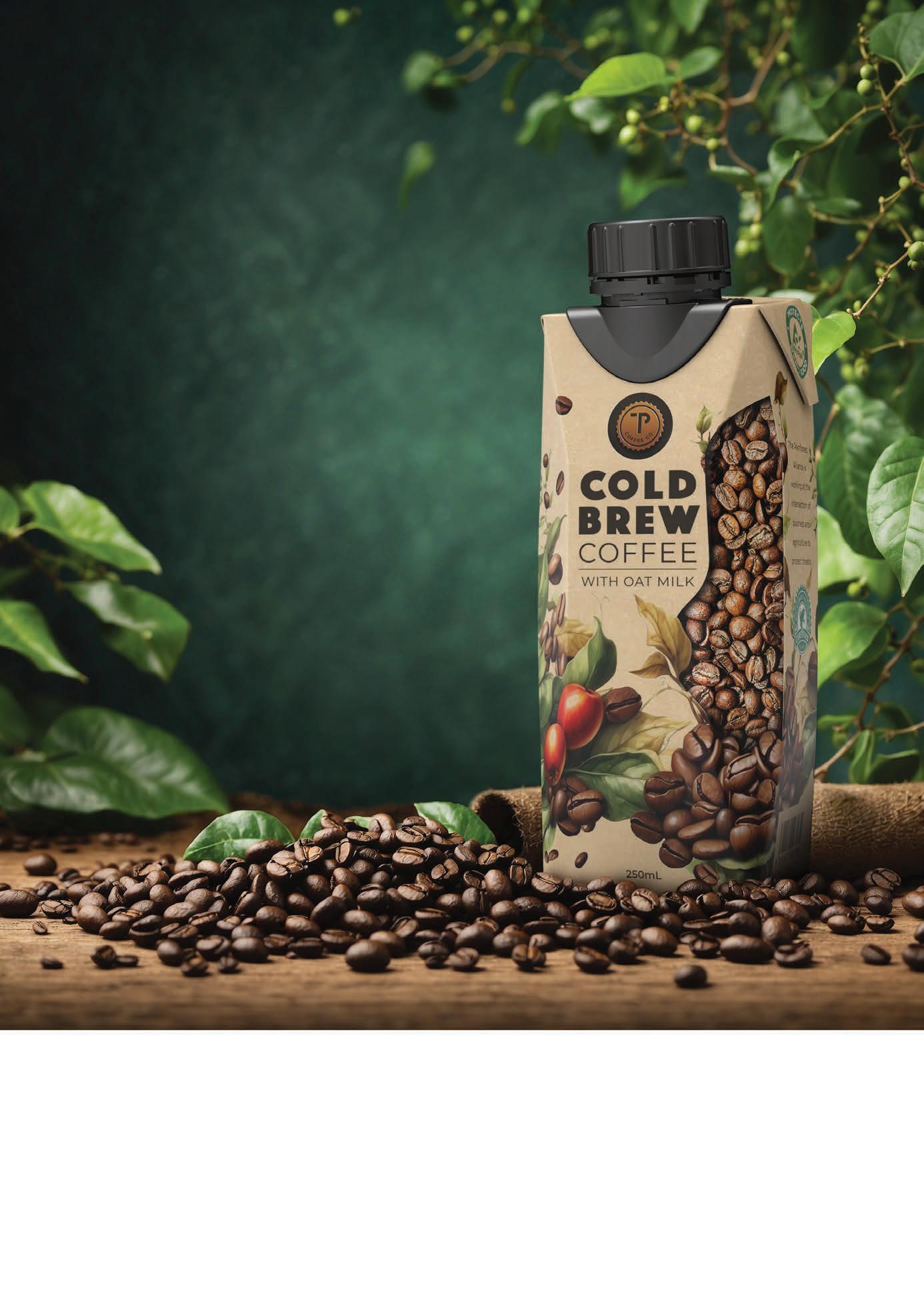

Put your money where your waste is
Veneziano Coffee Roasters’ sustainability team share their easy wins for café owners looking to make their businesses greener.
n the past five years, Melbourne coffee roaster Veneziano has upped its sustainability game and made huge changes to the business to reduce its impact on the planet. The dedicated team at Veneziano, and its parent company Nomad Coffee Group, have made great strides in their mission, implementing eco-focussed initiatives across the company to gain both B Corp and Carbon Neutral certifications and cut the carbon emissions of its operations by around 50 per cent.
While the team’s ambitions to make the roaster as planet positive as possible continue – certifications must be maintained, and new targets achieved – their attention has also turned to their café partners, and how Veneziano can share its learnings to help cultivate a more sustainable coffee culture in Australia.
“Climate change is a big concern for a business like ours. Coffee is a high at-risk crop, with forecasts predicting around 50 per cent of current coffee arable land not being suitable by 2050,” says Nick Percy, Group Sustainability Manager of Nomad Coffee Group.
“The stuff we control is the most straightforward to adjust, and we’ve seen huge reductions in the carbon intensity of our products. However, we know we can go further and that includes sharing our knowledge with our café partners to help make positive changes.”
That knowledge has been garnered from real-world experiences. In 2018, Veneziano opened a café in the Melbourne suburb of Richmond as a place for people to enjoy its locally roasted coffee. However, the team also had a second purpose for the venue: to be a benchmark café experience where they can road-test products, equipment, and ideas before offering them to their wholesale network.
This includes sustainable initiatives, and over the past six years the sustainability team have trialled a range of green practices at the café – from reusable cup schemes to diverting organic waste from landfill. Nomad Coffee Group Customer Experience Manager Kate Maher was on the ground in Richmond overseeing these initiatives for four years, and says they have plenty to share with their wholesale partners.
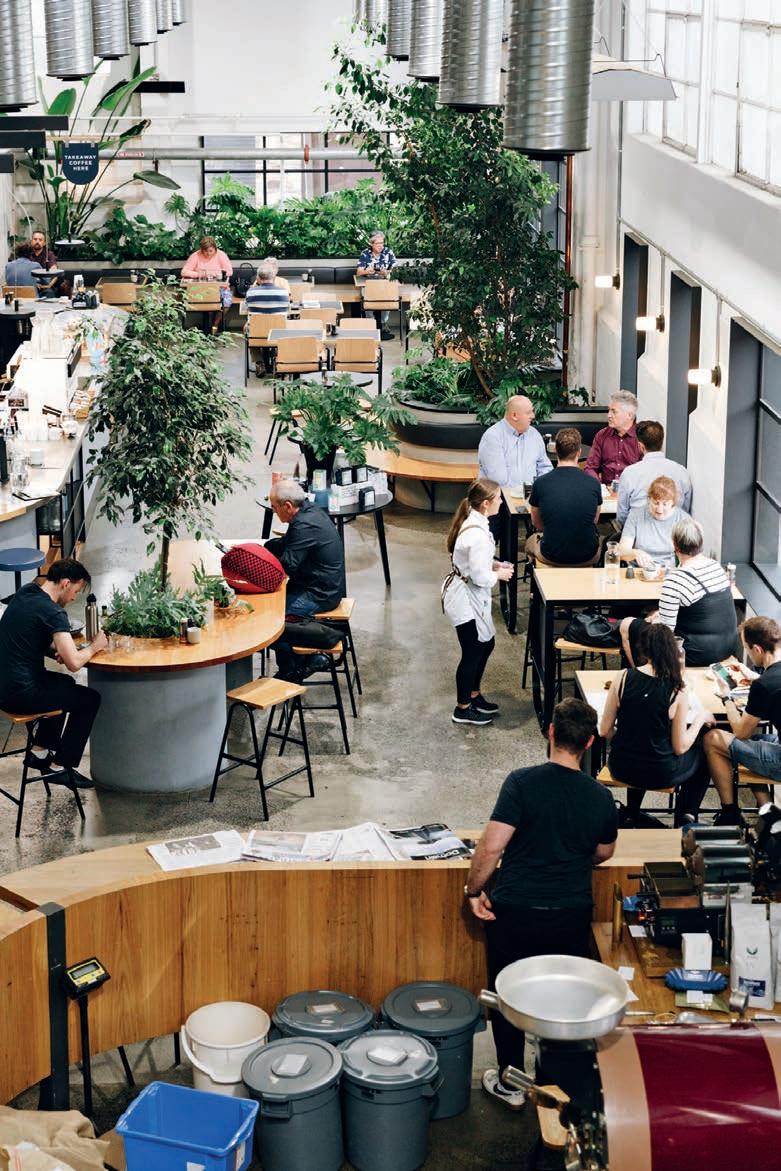
customers having to alter their usual routine. If you want to start changing people’s behaviour, you have to find the path with the least resistance.”
Communication is a key factor here. Kate says it’s important for all your team to be on the same page about the messaging
it’s got to be a positive conversation, you can’t shame someone for their actions or choices. Choose the right audience and build on your already-established relationships with long-term customers,” says Kate.
It’s often assumed sustainable swaps are
beanscenemag.com.au 41 INDUSTRY PROFILE
Images: Veneziano Coffee Roasters.
Veneziano’s Richmond café was established as a testing ground for its latest coffees and innovations.
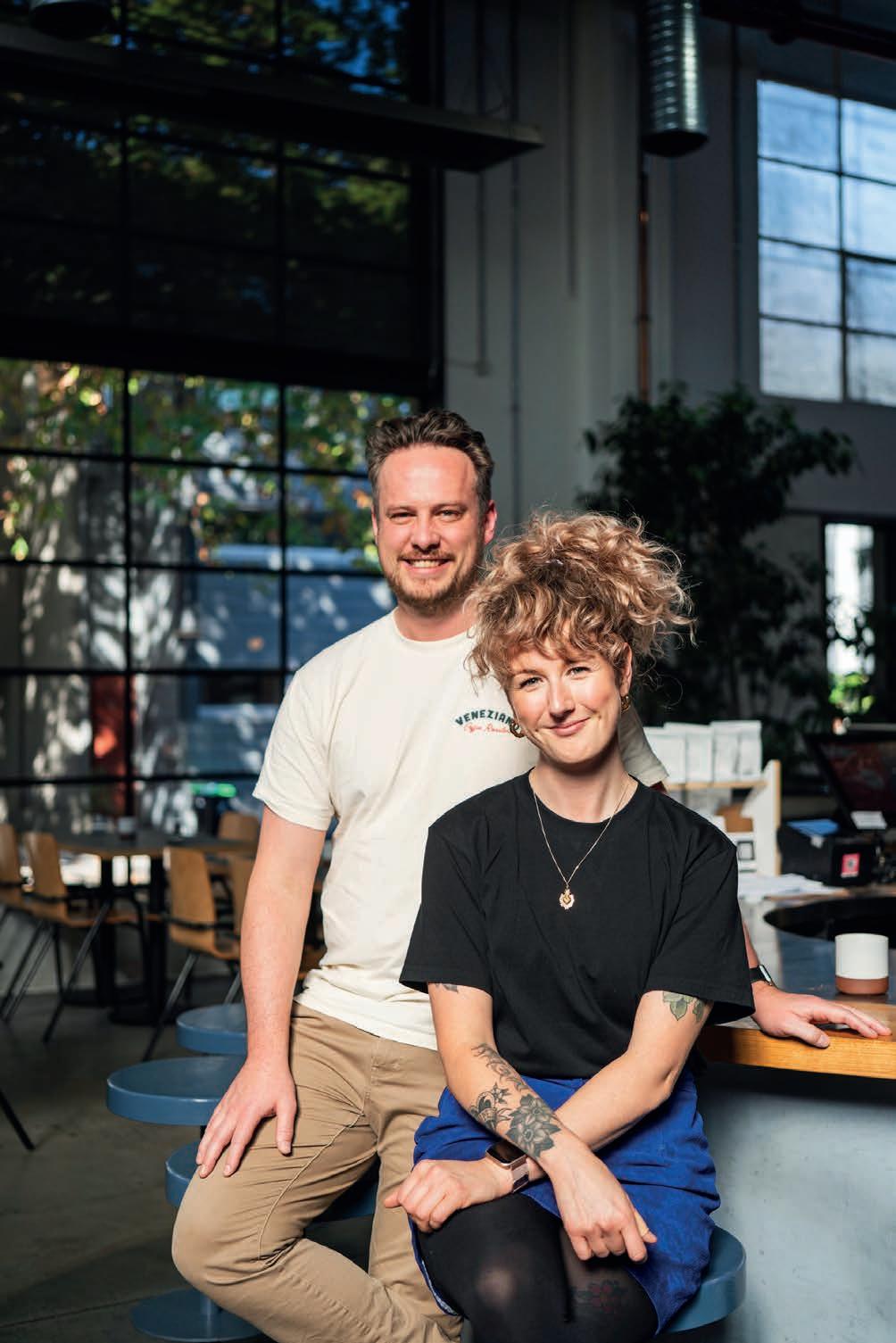
more expensive for business owners, but Nick and Kate are confident some practices will actually save café owners money, such as reducing energy consumption and reviewing waste management.
“If you can’t afford to switch to green energy, take the time to review your energy usage and see which items could be switched off or used for less time,” says Nick.
“In terms of waste, disincentives such as levies on general waste often make collection expensive, so it’s worth reviewing what is being recycled and composted to reduce costs and divert waste from landfill. You can lower your bill purely by utilising your bins better.”
Kate adds that reviewing portion sizes can drastically reduce food waste, which
will not only decrease the amount to be collected but also cuts produce costs. That might not necessarily involve making everything smaller, but giving customers options such as whether they want that second slice of toast, or one poached egg instead of two.
Due to the current economic climate, a lot of consumers are looking for ways to cut costs. Kate says customers are seeking out ways to save money, so offering discounts for using a reusable for coffee or food is a great way to encourage sustainable behaviours.
Over the past few years, Veneziano has worked in collaboration with several of its wholesale partners to introduce Simply Cup recycle streams at cafés across the country
in a bid to reduce single-use waste. To date, the roaster has helped to recycle over 50,000 single-use coffee cups.
Madera Northcote in Melbourne is one such café. When Owner Pete Widdows established a coffee bar within his brother’s carpentry shop in 2021, sustainability was already at the heart of the business that made custom furniture from upcycled wood (‘Madera’ translates to ‘wood’ in Spanish).
Looking for a roasting partner to supply the café, Veneziano was the clear choice for Pete.
“From my first conversation with the team at Veneziano I knew they were going to be as helpful as possible,” says Pete.
“I wanted to work with a roaster that put sustainability at the forefront, and Veneziano’s resources have helped Madera to achieve its own sustainability goals. If I have an idea or need advice on something, they’ve always got sound knowledge.”
The coffee shop is located just across the creek from CERES community environment park, so the local community is very supportive of Pete’s eco initiatives. As it opened during lockdown, at first it had to use single-use takeaway cups, but Pete approached the team at Veneziano for a solution that would align with Madera’s values.
“I told them I wanted to keep buying compostable cups from them, but we needed to find a way to dispose of them properly,” says Pete.
Veneziano helped Pete and team find the answer, which was adopting the Simply Cup scheme that provides a recycling station for both standard and compostable disposable coffee cups. Once the cups are collected, they’re used to make eco products such as environmentally friendly asphalt and concrete.
“In order to introduce these sustainable changes, we needed to raise the prices but didn’t want to pass on the additional costs to everyone that drank coffee – whether they used a reusable cup or not. We came up with the idea to add a 50c surcharge for each single-use cup,” he says.
“It’s worked amazing well. The local community have wholly embraced it and lots of customers have switched to reusables. In the past year, we’ve ordered far fewer compostable cups despite being significantly busier.”
Nick and Kate say Veneziano is committed to continue working alongside its café partners to find bespoke sustainable solutions for their setups, and believe that doing good for others only benefits business.
For more information, visit venezianocoffee.com.au




42 beanscenemag.com.au
Nomad Coffee Group Sustainability Manager
Nick Percy (left), and Nomad Coffee Group Customer Experience Manager Kate Maher.


Traceable and Sustainable Supply Chains Continuous Improvement & Regulatory Compliance





NKG Bloom and NKG Verified are both recognised by the Global Coffee Platform as equivalent, 2nd party assurance. Get in touch to learn how our traceable and audited supply chains can assist your business to meet its compliance requirements and sustainability targets.
daniel.vella@nkg.coffee, Tel: 02 9138 9456











responsiblysourced. nkg.coffee
Every refill counts with HuskeeSteel.

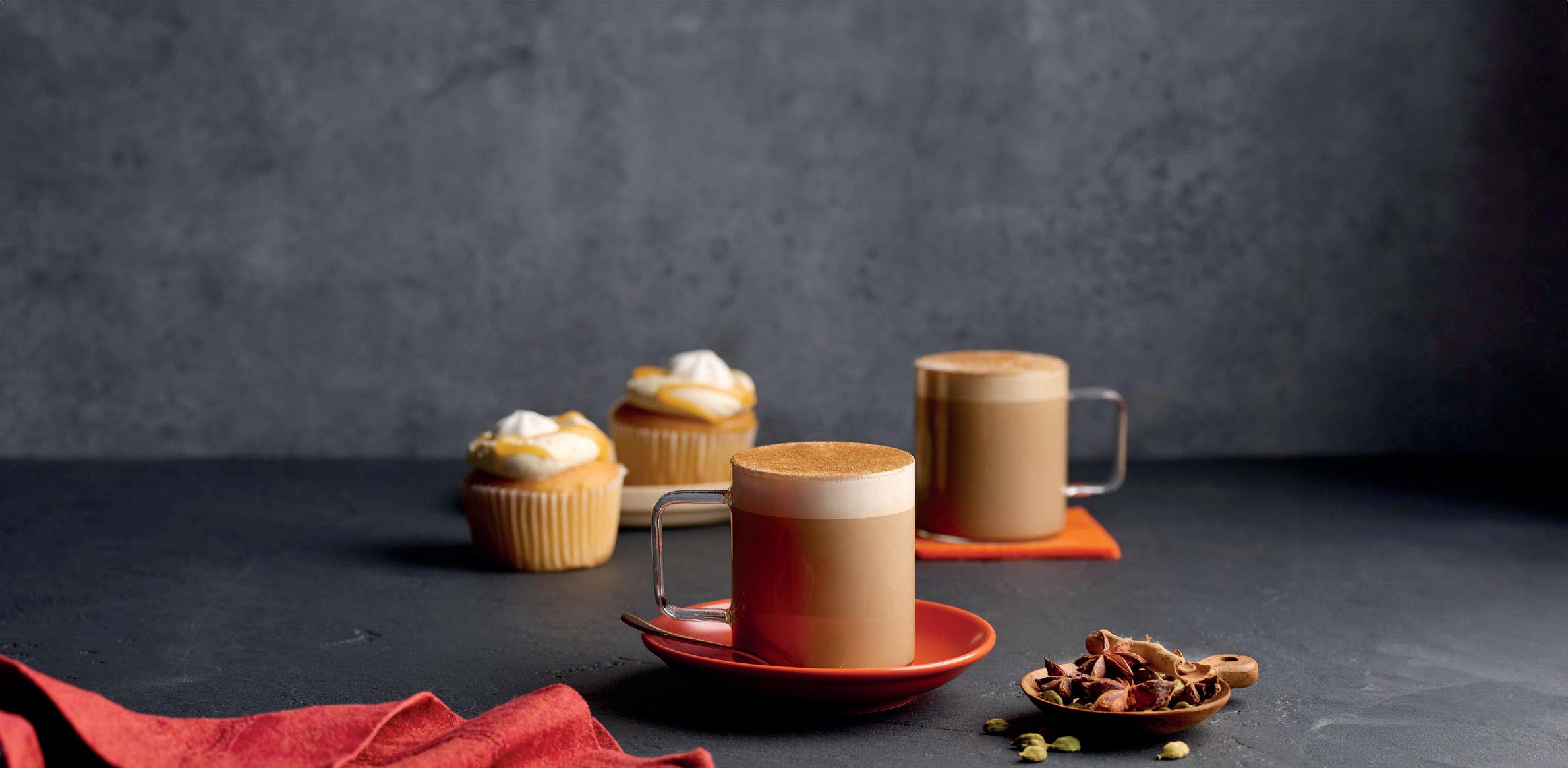
Dual walled and vacuum insulated Available with ceramic lining Made of 91% recycled stainless steel Reusable and durable BPA free Stackable Closed-loop end-of-life Rethink your coffee. Refill your Huskee. Co-brand with us.

Elevate the experience

Chai has been a staple of Australian café menus for decades, but for the flavoursmiths at Arkadia, the crowd-pleasing coffee alternative continues to grow and evolve.
hen family-owned beverage specialist Arkadia started crafting chai latte blends for cafés in the mid 2000s, it was one of the pioneers of the chai movement that would sweep Australia. Today, it’s hard to find a coffee shop in the country that doesn’t offer chai as a pillar of its drinks menu, with baristas continuously coming up with clever combinations and signature serves.
With origins in India, chai is traditionally made by brewing black tea with a blend of aromatic spices and herbs, including cinnamon, cardamom, ginger, cloves, and black pepper. This combination of warming spices inspired Arkadia’s original Chai Spice blend, which Arkadia Brand Manager Kylie Chan says remains the original recipe since it was first launched more than 25 years ago due to its loyal fan base.
“Our original Chai Spice has such an iconic and delicious flavour and aroma, which is why our chai following continues to evolve and grow,” says Kylie.
The secret to a great chai, according to Kylie, lies in the balance of spice flavours and black tea. She also recommends taking the time to select the right milk to maximise the flavour.
“It’s best to pair a great chai powder with full-cream milk or dairy alternatives that contain higher levels of natural fat as they’ll add creaminess and body to the drink. For
those avoiding dairy, alternatives like soy or oat milk work well as they have a good mouthfeel and naturally add sweetness,” she says.
While Chai Spice is an iconic favourite, Arkadia has created a range of chai blends to add more variety to café menus. Each caters to different customer preferences, with the collection offering different levels of sweetness as well as a variety of complementary flavours.
The collection includes Chai Vanilla, for original Chai Spice drinkers who want a little vanilla twist on the classic; Chai Masala, a subtly fiery chai which is vegan friendly and gluten free; Chai Turmeric, incorporating the earthy flavour and orange hue of the superfood; Chai Matcha, matching the mild tones of matcha with aromatic chai; and Natural Sticky Chai, crafted by the Arkadia master blenders to offer the traditional flavours with a touch of honey sweetness.
“The natural Arkadia Sticky Chai is a favourite with chai connoisseurs,” says Kylie. “It’s made from whole spices, Ceylon black tea, and Australian native honey, and delivers an authentic chai experience as it can be decanted and strained at the table.”
The Arkadia team are always looking for the latest beverage trends, and regularly post recipe inspiration on their website and social channels. Simple but delicious ideas for winter include Chai Hot Chocolate, Biscoff Chai Latte, Matcha White Choc Chai, and Chai Mulled Wine.
“Our recipes are inspired by global drinks trends. Consumers are increasingly looking for fun ingredients and flavours, so we’ve introduced easy-to-follow recipes that cafés can effortlessly create and will have customers returning for more,” says Kylie.
“The Matcha White Choc Chai is particularly eye catching. It simply compiles our Matcha Chai, White Chocolate Syrup, and full-cream milk, with a sprinkle of matcha powder and white chocolate shavings as a finishing touch.”
Considering its long history as a stalwart of Australian coffee culture, Kylie says the popularity of chai will only continue to rise.
“Chai is a great alternative for consumers who want to reduce their caffeine intake but also don’t want the sweetness of hot chocolate. A lot of our café clients offer different chai blends from our range to cater to their customers’ diverse tastes,” she says.
The company will soon unveil its new branding, which includes fresh packaging designs for its whole range, including chai.
“Our brand has evolved alongside us over the 25 years we’ve been in business. We decided it was time for a refresh and a contemporary look that reflects who we are as a brand today and in the future,” says Kylie.
“While the packaging gets a makeover, rest assured the delicious taste of our iconic formulas will remain unchanged.”
For more information, visit arkadiabeverages.com.au
beanscenemag.com.au 45 INDUSTRY PROFILE
Image: Arkadia.
Arkadia’s Chai Spice blend launched 25 years ago.

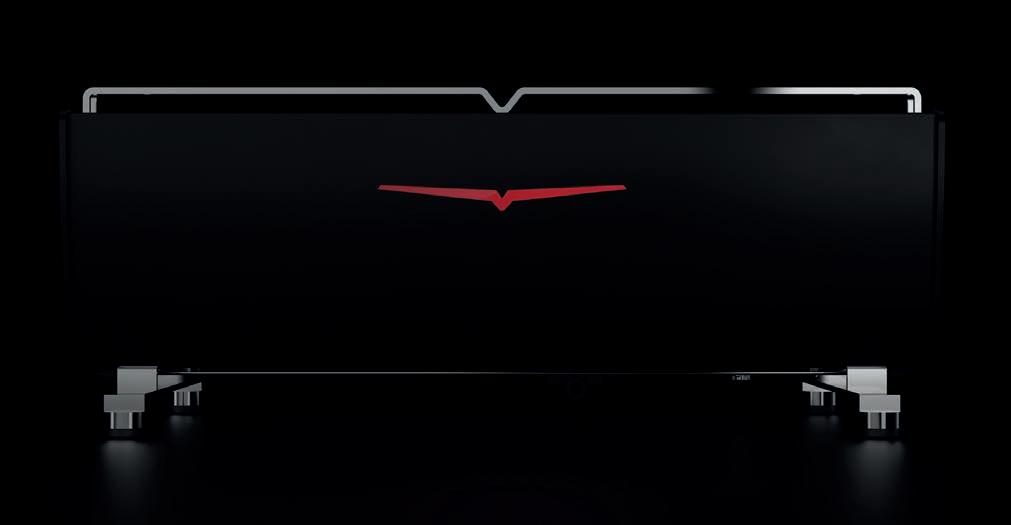

The next step in our history of innovation and design. victoriaarduino.com/blackeaglemaverick DISCOVER the Black Eagle Maverick at the new Victoria Arduino Experience Lab in Melbourne Follow us on info.au@simonelligroup.com
Home is where the coffee is
Now in its 14th year, CafeSmart is collaborating with cafés and roasters to encourage
conversation about homelessness and respond to the needs of those experiencing it.
ccording to the Australian Institute of Health and Welfare, there are more than 122,000 people experiencing homelessness in Australia. Not-for-profit organisation StreetSmart is on a mission to reduce this number via its annual CafeSmart campaign.
“The current cost of living and housing crises mean many new faces are seeking support from homelessness services,” says StreetSmart Australia Impact Coordinator Isabella Stanley. “It’s hard not to have homelessness front of mind when you can see there’s a great increase of people sleeping on the street in your local neighbourhood.”
CafeSmart is an annual coffee-led campaign that unites roasters, cafés, and coffee enthusiasts around the country to fight homelessness and support those at risk in their local area. This year, CafeSmart is focused on supporting those who are sleeping rough. Donations will help respond to the immediate needs of people and families who are experiencing homelessness, providing support like food relief, medical care, essential clothing and material aid, and housing assistance.
“When people think of homelessness, rough sleeping comes to mind. We know this isn’t the only form of homelessness, but instances of rough sleeping have increased over the past few years. We are seeing a rising number of people forced to sleep on the street, in their cars, or in unsafe accommodation. People who are employed are sleeping in tents or couch surfing because they’ve been pushed out of the housing market,” Isabella says.
“Our community partners tell us there’s a 30 per cent increase in people seeking basic essentials, such as food, clothing, and shelter. Our focus on rough sleeping is a response to emerging trends and current needs. We want to be able to respond quickly through our communityactivated event.”
Last year’s CafeSmart campaign saw 717 cafés and 44 roasters join forces to raise $147,585 for 133 local grassroots charities and community partners.
“Thanks to CafeSmart, countless cups of coffee have been enjoyed for a good cause. Year after year, the event continues to showcase the incredible community-driven efforts of the Australian coffee industry
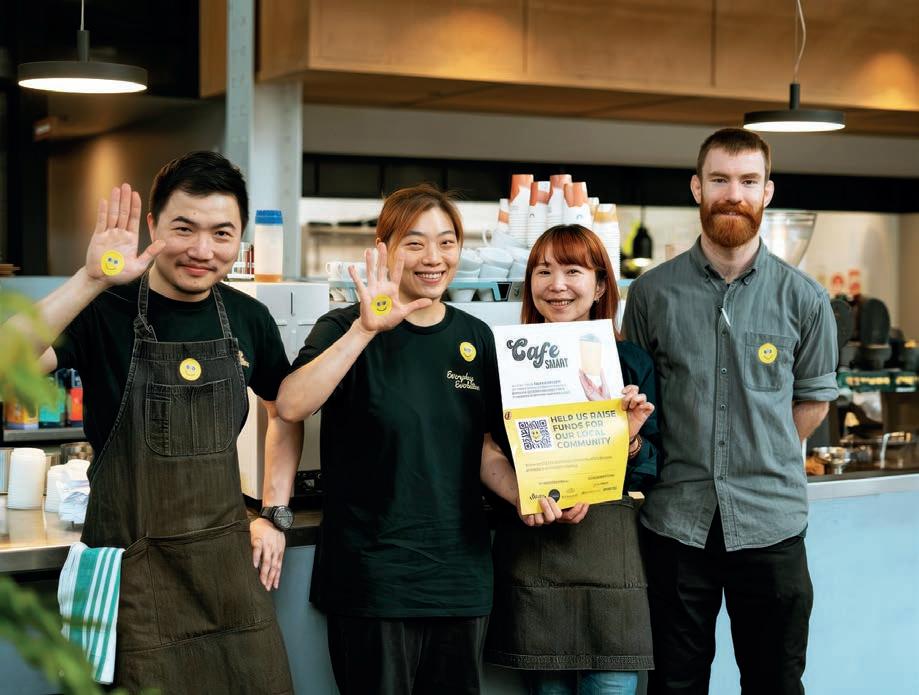
and offers everyone an easy way to give back through our shared love of coffee,” Isabella says.
“The great thing about CafeSmart is that it leverages the social nature of coffee to drive collective action, and channels support in a localised way. Homelessness can be quite a heavy topic to discuss, and CafeSmart helps to create tangible change and engage the community in a positive way.”
In 2024, CafeSmart will run from 10 to 16 August during Australian Homelessness Week, uniting hundreds of roasters, green bean suppliers, cafés, and coffee lovers around the country. Cafés will donate $1 for every coffee sold on Friday 16 August, and are encouraged to get their customers involved via QR codes and posters.
“We always hope for a bigger and broader impact each year, so we’re eager to continue to recruit partners across the coffee supply chain and engage more people in all areas of Australia,” says Isabella.
“It’s always so heart-warming to see how excited café owners and baristas get to dress in yellow for the week, decorate their venues, and promote the initiative to
their customers. It’s a reminder that what the whole coffee industry is doing isn’t just paying lip service, it’s about standing together and taking action.”
All donations raised through this year’s event will help fund CafeSmart’s community partners across Australia. This includes drop-in centres with showers, laundry facilities, and food pantries; neighbourhood centres providing meals and basic essentials like clothing; and women’s refuges which provide safe accommodation to women and children fleeing domestic and family violence. Grant recipients will also include outreach programs that give medical care and support to those sleeping rough, and housing programs that provide safe accommodation.
“CafeSmart is such a powerful social impact campaign, which so many different aspects of the community can take part in. We’re excited to expand our network and make a difference for people experiencing homelessness in Australia – one coffee at a time,” says Isabella.
For more information, visit streetsmartaustralia.org/cafesmart
beanscenemag.com.au 47 INDUSTRY PROFILE
Image: Veneziano Coffee Roasters.
Last year 717 cafés across Australia participated in CafeSmart.
Sustainability Sustainability
Make it count
Coffee Tools Distributing on its commitment to the environment, the sustainable organisations it supports, and how small contributions can make a difference.
quipment specialist Coffee Tools Distributing believes sustainability is key to preserving the world we live in. Company Director Curtis Arnold is focused on creating a healthy company that can survive in the coffee industry and contribute to the greater good of the planet.
“In addition to our sincere concern for our world, we believe in a fair and ethical coffee trade – not just for the farmers who grow the coffee we enjoy but also for their families and the communities they live in. Coffee is the source of what we do at Coffee Tools Distributing and is an essential part of the lives of the people who work here,” says Curtis.
“For these reasons, we have chosen a handful of not-for-profit organisations to support who we believe are making a significant difference to the issues that are close to our hearts.”
Coffee Tools Distributing is a proud member of 1% for the Planet, a global movement inspiring businesses and individuals to support environmental solutions through everyday actions. Each year, the company donates 1 per cent of its total sales to approved sustainable organisations.
“Joining 1% for the Planet enables us to partner with organisations entirely focused on solving some of our greatest environmental challenges. By harnessing the power of business and the vision of these not-for-profits, together we can make a lasting positive impact,” says Curtis.
The company also donates to Gondwana Rainforest Trust, previously known as Rainforest 4 Foundation. This charity focuses on rainforest protection, conservation, and regeneration in Australia and Southeast Asia.
“The organisation is dedicated to safeguarding the future of the world’s rainforests by implementing conservation programs to purchase, protect, and restore endangered rainforests and indigenous wildlife,” Curtis says.
“They help mitigate the devastation climate change is causing by saving and regenerating more forest cover. Each square metre of forest their donors buy back to protect mitigates climate change, and ensures biodiversity is not lost to development.”
To reduce food waste, Coffee Tools Distributing also supports OzHarvest, a

purpose to nourish the country. It saves surplus food from ending up in landfill and delivers it to charities that help feed people in need.
“We are incredibly proud to continue our ongoing partnership with OzHarvest. The organisation is committed to halving food waste by 2030, inspiring and influencing us to do the same. We hope to help OzHarvest continue to make a positive impact, both for our planet and for those in need,” says Curtis.
When on the lookout for new suppliers, Curtis tries to find companies that have similar attitudes towards the environment and sustainability.
“Even if the products themselves are not specifically reducing waste or having a positive impact, we like to work with companies that are conscious of these issues and trying to operate sustainably themselves,” he says.
One of those companies is GROSCHE, a social enterprise that uses coffee equipment to fund safe drinking water systems for people in need.
“We’ve recently added a new line of GROSCHE water bottles. The Yukon Insulated Coffee Tumbler range is the latest addition to GROSCHE’s line-up of quality coffee and hydration gear, designed with a greater purpose,” Curtis says.
Made of stainless steel, the bottles are triple wall vacuum insulated and dishwasher safe. Featuring a clear leak-proof sip lid, generous size options (20 ounce and 32 ounce), and car cup-holder compatibility, Curtis says the Yukon range is the ideal vessel for any beverage on-the-go.
“Every Yukon purchased supports
community members in remote and poor locations access to safe drinking water by installing Biosand water filters. The project currently impacts communities in South Sudan, Uganda, Malawi, India, Pakistan, and the Philippines,” says Curtis.
“We share a similar ethics of putting the environment first. Coffee Tools Distributing is grateful to contribute to the Safe Water Project by distributing GROSCHE’s products here in Australia.”
Curtis is also eager to continue the company’s partnership with CafeSmart, an annual event organised by StreetSmart Australia, which raises funds to support Australians affected by homelessness.
“Sponsoring CafeSmart is something I’m really excited about. I’m looking forward to our participation this year, raising awareness, and taking action against homelessness,” he says.
Due to its ever-growing product line, Coffee Tools Distributing has moved into a bigger warehouse and office space in Brisbane, Queensland, just 700 metres from the original space it outgrew. As the company continues to expand, Curtis says there’s one aspect that will remain the same: its commitment to the environment.
“Our new warehouse has a massive 23-kilowatt solar installation, ensuring we’re harnessing energy in a sustainable way,” he says. “Even small actions get noticed and can influence others to act. Specifically for the coffee industry, we need a healthy environment for coffee to grow. Anything we can do to help, we will.”
For more information, visit coffeetools.supply
48 beanscenemag.com.au
Image:
FEATURE
Gondwana Rainforest Trust.
Gondwana Rainforest Trust Founder Kelvin Davies with the purchased rainforest land.
Sustainability

Waste made beautiful
Huskee describes the evolution of its products, from the original HuskeeCup to the newly released HuskeeSteel.
ince its inception, Australian brand Huskee has championed the benefits of reusables in place of single-use plastic cups. CEO Saxon Wright was working on a project to reduce waste at coffee farms in Yunnan, China, when he and other founders came up with the idea to turn coffee husk waste (a nutrient-free component of the coffee cherry produced at the milling stage) into a unique reusable cup.
“Saxon was looking for ways to reduce and find value in the by-products of coffee production. Husk was seen as both a significant problem because of the large volumes created during coffee processing, and an opportunity due to its versatility. He wanted to turn this waste husk into a sustainable material to make cups, and in turn reduce dependence on single-use disposables,” says Huskee Head of Sales and Marketing Michael McFarlane.
Michael says the brand quickly made a name for itself, receiving positive feedback from customers following its Kickstarter campaign in 2017.
“The initial response was fantastic. We loved being embraced by both consumers and baristas who were using the product as a tool of the trade. We really focused on the barista as the key to its design, which separates us from many of the other reusables on the market. Our goal was, and still is, to consider all stakeholders when it
comes to transitioning away from singleuse, and café operators are foundational to that process,” says Michael.
“We’ve gone from strength to strength in Australia, but we don’t plan to stay where we are. We want to transition from being a cup people love to a company that designs new products and systems to assist the broader transition towards reusables.”
Recognising the need to cater to different customer preferences, in 2023 Huskee branched out with two new ranges.
“HuskeeRenew cups are made from a co-polymer, using 50 per cent recycled materials, which give new life to plastic waste while offering a clear and refined aesthetic,” Michael says.
“HuskeeSteel is a premium, ultradurable, and heat-saving option for those on-the-go. The dual walled, vacuum sealed cup is made of 91 per cent post-consumer high-grade recycled stainless steel, ensuring coffee stays hotter for longer.”
Michael says by introducing these new ranges, Huskee caters to a wider audience and offers a variety of sustainable materials to suit different preferences.
“We’ve gone from a single innovative cup to a comprehensive range promoting reusability and waste reduction, with circularity at our core,” he says.
Sporting the same HuskeeCup silhouette, HuskeeSteel can be co-branded with a company logo or design.
There are laser etched and screen printed options on Huskee’s base range of colours, with custom colours available for larger volumes.
“Many cafés love having a quality cobranded BYO cup option as part of their retail collection,” Michael says.
“The Stopper Lid is the ultimate solution for preventing spills when on the move with takeaway coffees. Its flexible silicone plug seals the lid and can be easily rotated or removed to allow drinks to flow. It’s also simple to deconstruct for cleaning.”
HuskeeSteel was released in Australia in December 2023 in an eight-ounce cup size. Two more cup sizes – six ounces and 12 ounces – will be released later this year.
According to Michael, Huskee will continue to focus on facilitating a wastefree world and scale up its solutions to address waste.
“We believe business can be a key instrument of change in society, and our entire ethos was built on this premise. The way we operate, the products we make and the systems we build are entirely focused on creating a positive impact, so we have to live and breathe that as our reality,” he says.
“The next few years will be exciting and instrumental in the application and growth of reuse systems to provide an attractive alternative to single-use cups.”
For more information, visit huskee.co
FEATURE beanscenemag.com.au 49
Image: Huskee.
FEATURE Sustainability
The HuskeeSteel cup is dual walled, vacuum sealed, and made of 91 per cent highgrade recycled stainless steel.
Sustainability Sustainability
Sprocket science
How a group of scientific engineers combined their skills to create a space-age coffee roaster that transforms spent grounds into fuel.
wo chemical engineers, a viticulturist, and a lawyer walk into a bar … this isn’t the start of a cringe-worthy joke but rather the rough origin story of Sprocket Roasters.
In 2008, John Winter, Chelsea D’Aoust, and Nick and Ross Ciavarella relocated to Newcastle, New South Wales, to use their industry knowledge to establish a biofuels business. Unfortunately, a change in government scuppered their original intentions, so instead they pivoted their plans to apply their knowledge in bioenergy technology to their hobby of coffee roasting.
“What makes us unique as a roaster is that the business was founded on sustainability, and then coffee followed. When the biofuel project didn’t work out, we applied our skills to roasting,” says Sprocket Roasters Co-owner Ross.
“John is an engineer and he’d been working on a more efficient coffee roaster. Traditional roasters are reliant on fossil fuels that contribute to harmful carbon emissions. The answer was to develop a roaster powered entirely by biofuels, specifically spent coffee grounds and organic material. The result is what we believe to be the world’s first clean-air commercial roaster.”
The roaster is designed to avoid the use of fossil fuels and produce zero smoke, while also solving the problem of spent coffee-ground waste. In Australia, 90 per cent of the six million tonnes of used coffee grounds produced each year currently go into landfill. John, Chelsea, Nick, and Ross came up with a solution to convert this waste into fuel.
Unlike conventional drum roasters, their machine uses air to move the beans. By transferring the heat generated by combusting organic waste, the machine creates its own fuel using an enclosed system that drastically reduces emissions. It also captures the chaff that would usually be disposed of using afterburners and recycles it as fuel.
The unique roaster was manufactured by local fabricators in the Hunter Region of New South Wales. With the technology patented, the group officially established Sprocket Roasters. The name was inspired by the engineering company in the classic carton series The Jetsons – a nod to their new futuristic approach to roasting.
Shortly after, John and Nick left

The Sprocket Roasters team outside its New South Wales roastery.
Newcastle to run their respective farming operations, and Ross and Chelsea took the reins of the business. Over a decade on, the roaster is still firing on all cylinders and producing coffee blends and single origins for Sprockets’ wholesale and retail customers in a roasting facility in Lambton. Yet, the roaster is only a part of Ross and Chelsea’s initiatives to make the business as sustainable as possible.
“We have 62 solar panels on the roof that provide most of our energy. It’s reduced our traditional usage by up to 90 per cent – this summer our electricity bill at the roastery was under $10,” says Ross.
Since it was established, Sprocket has ensured its packaging is planet-friendly too. It was the first roaster in Australia to provide beans in reusable tin cans, which are still used to this day to deliver coffee to some of its wholesale customers. Its retail coffee is bagged in fully compostable packaging.
The roastery’s rotating selection of single origin coffees are organic certified and sourced exclusively through greenbean partners that adhere to EcoVadis’ sustainability standards. Its range of blends reference the space theme, with names such as Green Galaxy, Supa Nova, Cosmic, and Milky Way.
“From the outset we’ve been fully committed to doing the best for the environment,” Ross says.
“When we started out, no one in the roasting world really cared about their environmental impact – especially here in Newcastle, the industrial heartland of
Australia. However, in the past five years there’s been a huge shift in collective consciousness, and we have a lot of customers who specifically seek us out because of our sustainability principles.”
In 2018, the Sprocket team travelled to Parliament House in Canberra with Bioenergy Australia to make coffee on the front lawn and showcase their roasting technology. Their efforts have also earned the roaster the title of Most Sustainable Business at the Australian Green Global Awards, seen them recognised at the Hunter Innovation Awards, and, most recently, commended at the Australian Bioenergy awards for their commitment to environmental sustainability.
Ross and Chelsea are currently working on developing methods to dry the coffee as they can’t be used as a fuel for the roaster if they contain too much moisture. The plan is to redirect wasted heat energy from the roaster to a machine that will dry the grounds. Feedstock such as recycled pellets are also used for fuel, but Sprocket is always on the hunt for more efficient alternative bioenergy sources.
“We’re committed to continue to selfeducate and apply what we learn to our business to make positive contributions to our environment,” says Ross.
“Our aim is to minimise our impact at the roasting stage as the bean travels from producer to consumer.”
For more information, visit sprocketroasters.com.au
50 beanscenemag.com.au
Image: Sprocket Roasters.
FEATURE
BioPak’s new home-compostable lining will launch in Australia this year.

Next-gen compostables
BioPak is set to launch a new single-use packaging lining that will revolutionise the home-compostable cup industry.
ustralian company BioPak has been at the forefront of the compostable packaging revolution since it was established in 2006. It disrupted the plastic-obsessed singleuse market by introducing compostable foodservice packaging made from renewable materials, and became carbon-neutral in 2010 before most businesses had even heard of the term.
Throughout the company’s almost two-decade history, BioPak CEO Gary Smith has been on a mission to ensure his products have the smallest possible impact on the planet. An internal research and development team work alongside industry engineers to continuously develop new materials and technologies, and their latest innovation is set to change the homecompostable game.
“Currently, our single-use coffee cups are lined with PLA (polylactide) bioplastic or a water-based coating [used in the Aqueous range] to keep them watertight. They are both better options than conventional plastic, but each has room for improvement,” says Gary.
PLA is made from plant-based resources such as corn, cassava, and sugarcane. It needs to be relatively thick to function correctly, which means it can’t usually be home composted because a standard domestic compost bin will almost never reach the required temperatures for PLA to break down completely. Therefore, PLA-lined products are only industrially compostable.
The Aqueous cups, on the other hand, uses significantly less material thanks to a much thinner lining. As a result, they can be composted at home and biodegrade within the required time frame (the Australian Standards for home compostability requires compostable plastics to disintegrate after 180 days and completely biodegrade after 12 months). However, unlike PLA which is a bioplastic, the Aqueous lining contains a small amount of synthetic polymer created using fossil fuels. As a brand that strives to create plastic-free alternatives, BioPak wanted to introduce a solution that contained zero fossil fuel-based plastic and was also home compostable.
The company’s push to develop products that users can compost at home stems from the current waste system in Australia. Gary believes there is significant room for improvement in the country’s composting and waste infrastructure, with greater support needed at a federal level to support circular solutions.
“In states like Victoria and New South Wales, there’s currently no easy route to compost packaging industrially as composting facilities don’t accept them due to EPA regulations or capacity issues. We need national change, but in the meantime we want to ensure those who want to compost our products at home are able to do so,” says Gary.
“After years of development we’ve come up with a solution: polyhydroxyalkanoate (PHA). The lining is produced by microbes during the fermentation of renewable resources such as plant sugars and vegetable oils.”
The new material ensures the cups don’t contain fossil fuel-based materials and are certified home compostable.
“The PHA resin biodegrades so quickly that it is certified marine degradable. This is a breakthrough in bioplastics. However, our products are not designed to be disposed of in the marine environment, so it is not a licence to litter,” says Gary.
The new PHA cups are due to launch this June and will be the first in the Australian market. They’ll initially be available for BioPak’s long-standing partners and then introduced to the wider industry.
“We know there’s going to be a lot of interest in these cups from the café market which has a keen awareness of sustainability,” he says.
For years, BioPak has endeavoured to make it as easy as possible for café owners to introduce sustainable initiatives at their venues. In 2021, it launched Compost Connect, a not-for-profit platform to link foodservice businesses to commercial organic waste pick-up services. There are currently 23 compost partner services covering over 2000 postcodes across Australia and New Zealand. Businesses can find out if they have a local service on the Compost Connect website.
“Our company vision is to disrupt the current take, make, and waste model and provide the tools to create a truly circular economy,” says Gary.
For more information, visit biopak.com/materials/pha
beanscenemag.com.au 51
Image: BioPak.
FEATURE Sustainability
Sustainability
Sustainability Sustainability
Certifying sustainability
InterAmerican Coffee Australia explains why traceable, sustainable supply chains are becoming increasingly important, and how it’s helping roasters meet their compliance requirements and continuous improvement objectives.
nlike terms such as ‘organic’ and ‘carbon neutral’ that must meet strict criteria to earn certification, the word ‘sustainability’ has no mutually agreed standards. What one business considers sustainable could be very different to that of another.
This ambiguity is something green-coffee sourcing specialist InterAmerican Coffee Australia, together with its parent company Neumanm Kaffee Gruppe (NKG), strives to avoid when supplying its Australian roaster partners with quality coffee beans from the 19 origins from which it sources.
“The messaging around sustainability isn’t always verifiable and this is because people often have different interpretations of the term,” says Rudy Huemer, InterAmerican Coffee Operations Manager.
“Realistically, the most objective way of assessing sustainability and traceability is through certifications that are validated by a third party and provide an evidencebased approach.”
According to General Manager Daniel Vella, the time is coming where greenbean suppliers and roasters will have to demonstrate the credentials of their coffee in measurable terms.
“While it’s not an Australian regulation, the new European Union Deforestation Regulation is a sign of things to come in terms of compliance,” says Daniel.
“Corporate customers like contract caterers and airlines are seeking coffees that are demonstrably traceable, while financial institutions and governments are also looking to ensure their partners operate in a way that is compliant and sustainable.”
With core company principles that focus on preserving the planet and empowering producers, InterAmerican Coffee Australia and its fellow NKG export companies are committed to making the supply chain more sustainable. They aim to bridge the gap between farmers and roasters, and provide businesses with the credentials they need to succeed.
“We understand roasters have constraints, such as the rising costs of labour, rent, and energy, and need to make ends meet. However, we are also aware of coffee producers’ challenges, and we believe certifications and cost-effective sustainability programs are a great way to

fulfil the requirements of both farmers and roasters,” says Rudy.
Since it was established in 2020, InterAmerican Coffee Australia has offered coffees with Fairtrade, Rainforest Alliance, and organic certifications as part of its catalogue. Alongside these widely recognised markers, in 2021 parent company NKG also introduced its own internal programs, NKG Verified and NKG Bloom.
“NKG Verified serves to assess the supply chains and ensure minimum requirements are met, such as the European Union’s sustainability goals. For example, it ensures there is no slave labour, acceptable working conditions, and access to essential facilities such as toilets and dormitories,” says Rudy.
For InterAmerican Coffee’s customers, this verification comes at a premium of AU $0.15 to $0.20 per kilogram, which Rudy says pays for the auditors who visit the farms and the financial incentives farmers are given to take part in the program.
Another option of certification is NKG Bloom, a finalist at the Specialty Coffee Association’s 2023 Sustainability Awards. The program covers the basic principles of NKG Verified but also provides additional services to coffee farmers, such as access to financial services and agronomists.
“Because agriculture is a risky endeavour in developing countries, it can be very hard for small producers to access finance, which leads to less than optimum farm care and ultimately lower yields. Through NKG Bloom, we can provide financial services,
farmer education, and develop stronger partnership with producers,” says Dan.
“It also provides access to agronomists, who help with soil assessments, health checks on trees, and recommending best practices. The agronomists have access to the latest knowledge and suggest sustainable changes that can make the farms more efficient, such as turning coffee pulp into fertiliser.”
Rudy says the main goal of NKG Bloom is increasing yield for producers and therefore improving their income, with increased quality as by-product of better farm care. For coffee roasters, it’s an opportunity to know exactly where their coffee is procured and that it has a positive impact on the people who produce it.
Daniel believes this is particularly important because many of the producers they work with are smallholders, not large farms.
“NKG Bloom gives roasters an opportunity to provide life-changing support to smallholders, and share the positive outcomes with their customers,” he says.
“The vast majority of the world’s coffee farmers are smallholders, not larger scale producers who can operate and trade as a single farm and who are often well established, financed, and benefit from economies of scale. The producer group requiring the most support in our industry is smallholder farmers.”
For more information, visit interamericancoffee.com.au
52 beanscenemag.com.au
Interamerican
Image:
Coffee Australia.
FEATURE
InterAmerican Coffee’s verification programs aim to improve working conditions for smallholder farmers.
A journey of impact
Specialty roaster Pablo & Rusty’s is on a mission to be known as one of the best and most sustainable companies in the coffee industry.
he team behind Pablo & Rusty’s believe making great coffee and operating sustainably can be achieved simultaneously. That’s why, according to CEO Abdullah Ramay, its business model and every product it sells is directly linked to either reducing its impact on the planet or making it a better place.
“Creating delicious coffee is at our core. It’s what we are known for and that will never change. However, our second love is the planet. We want to do as much good as possible, not because we’re perfect but because there are a lot of things that can be improved. We want to play our part in creating a better future for our planet,” says Abdullah.
Abdullah considers Pablo & Rusty’s to be a trailblazer in the specialty coffee industry. He says the roaster is constantly looking for ways to improve its practices and operate sustainably in every sense of the word.
“A few years ago, as a Leadership Team, we came across and read the book Let My People Go Surfing by Yvon Chouinard, which introduced us to the B Corp Movement. Finally, we found a certification that could keep us accountable to our mission and also enable us to improve with each passing year,” says Abdullah.
B Corp certification recognises that a business is meeting high standards of verified performance, accountability, and transparency on factors from employee benefits and charitable giving to supply chain practices and input materials. Businesses must demonstrate high social and
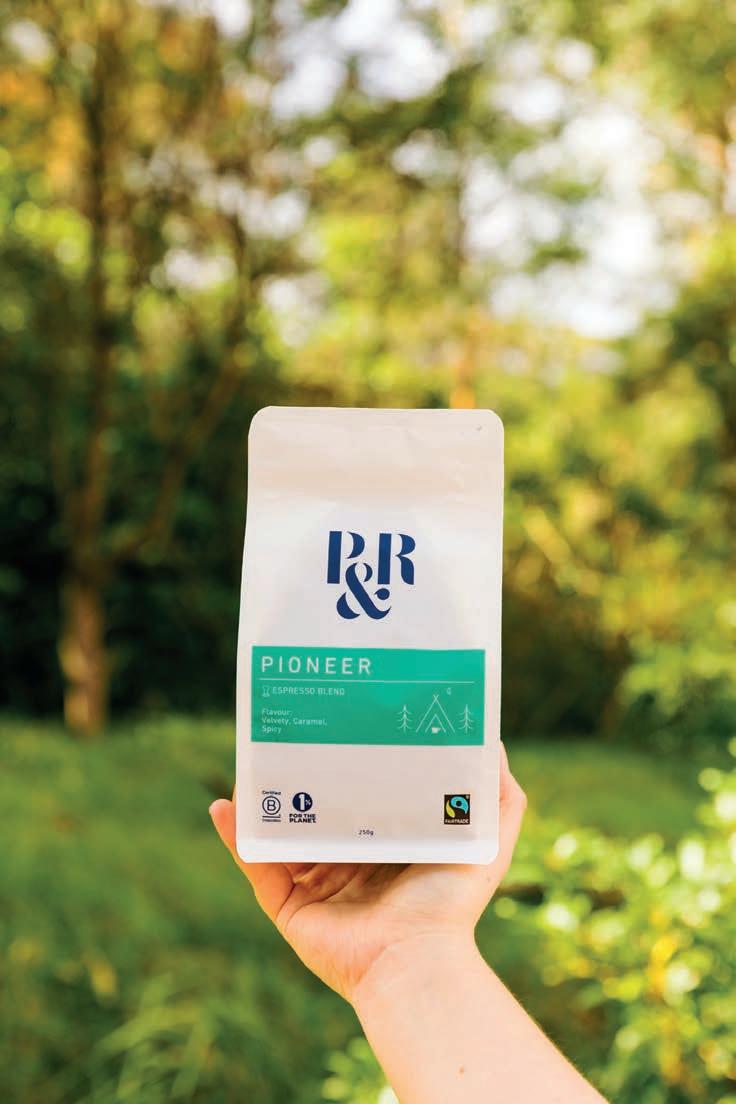
environmental performance by achieving a B Impact Assessment Score of 80 or above and passing a risk review.
“In 2017, our first B Impact Score was 80.9. An average company is estimated to have a score of 50 to 55. We barely made it but were over the moon to be part of a small group of companies at the time in Australia that were B Corp,” says Abdullah.
“We implemented sustainable initiatives early on such as installing solar panels on our roasting warehouse roof and composting coffee grounds, and were one of the first companies to make our takeaway cups biodegradable in 2015.”
B Corp companies are recertified every three years. When the roaster underwent its second certification in 2020, it achieved a B Impact Score of 89.8.
“Our most recent certification gave us a score of 97.1. While it was a surreal feeling and incredible achievement, we’ve already identified areas where we can improve to increase our score again for the next certification,” he says.
“There’s no end to the B Corp process, but that’s the beauty of it. It’s a constant yardstick to measure our progress and identify areas of improvement. We look forward to our next recertification to see our progress and advance further.”
Pablo & Rusty’s is one of the only specialty coffee roasters in Australia to have B Corp, Carbon Neutral Organisation (through Climate Active, the Australian Government’s carbon-neutral certifying body) and 1% for the Planet certifications. The 1% for the Planet initiative sees
annual sales to support not-for-profit environmental causes.
“It’s not one per cent of profit, it’s one per cent of revenue, which means a portion of every single product is directly helping the planet. Our customers can feel proud their partnership with us is helping to create a better tomorrow. Our contributions have already surpassed $200,000,” says Abdullah.
“It’s hard to articulate the feeling of achievement our team experience every time we improve our B Impact Score, contribute to the 1% for the Planet program, or renew our Carbon Neutral Organisation certification. The point is not just to celebrate the progress but also to continue to improve. Small, consistent steps over time make a big impact.”
In the spirit of continuous improvement, Abdullah says Pablo & Rusty’s has three big goals: becoming 1% for the Planet certified, which it has already achieved; making all its packaging recyclable or compostable; and achieving a B Impact Score of over 100 in its next recertification.
“We want to challenge the assumption that you can’t be a successful and sustainable business,” he says.
“Cafés may be doing it tough out there, but now is the time to imagine a better future by changing the status quo and doing things differently. We can create a future together where cafés are financially, environmentally, and socially sustainable.”
For more information, visit pabloandrustys.com.au
beanscenemag.com.au 53
Image: Pablo & Rusty’s.
FEATURE Sustainability Sustainability
One of Pablo & Rusty’s goals is to make all its packaging recyclable or compostable.
The sustainable sip
How Tetra Pak is working with industry partners to turn used cartons into sustainable building materials, and introducing new initiatives to
ustainability has been at the core of Tetra Pak’s purpose since it was established in 1951. When Ruben Rausing introduced the first tetrahedron-shaped paperbased milk carton more than 70 years ago, his vision was to make food safe and available everywhere. Today, those founding principles remain rooted in social sustainability, but the focus now fully encompasses the company’s impact on the planet.
“Ruben Rausing once said that a package should save more than it costs,” says Tetra Pak Sustainability Director Vikas Ahuja.
“Today we apply this to our social and environmental impacts: not just comparing the cost of the package to that of the product it holds, or to the wastage it prevents, but to the cost to the environment and the benefits to society through better nutrition.”
The global brand works with companies of all sizes to find processing and packaging solutions for the food and beverage industries. Ready to drink (RTD) coffee beverages are just one of its specialties, yet the Tetra Pak team are working to ensure each carton of cold brew and family pack of oat latte has the smallest environmental footprint possible.

and RTD coffee producers ensure all their cartons are recycled.
“Take milk as an example. Distributors will deliver crates of Tetra Pak-packed milk and plant milk, and then pick up the empty crates,” says Vikas.
One of its key focuses is on creating a circular system for its paper-based cartons, which are fully recyclable when in the right hands. The wood fibre in Tetra Pak products, which is already a renewable resource, makes it a great material for producing things such serviettes and tissues, as well as more solid items like cardboard boxes.
“In Australia and New Zealand, we’ve partnered with startup saveBOARD, which transforms food and beverage cartons, coffees cups, and the like into a sustainable building material similar to plywood,” says Vikas.
“The cartons, including any caps, are shredded and pressed in an industrial-size sandwich press. Because of the composition of the materials, there’s no need to use chemicals or glues.”
Container deposit schemes across Australia accept RTD coffee cartons and enable consumers to recycle their used packaging. saveBOARD then turns them into building materials such as ceiling tiles and wall panels, but Tetra Pak is eager to go the extra mile and help the café community
“We want to help facilitate a system where those distributors don’t have a van of empty milk crates by the end of the day but instead a van full of empty cartons that are a resource for initiatives such as saveBOARD.”
Championing recycling isn’t the only way Tetra Pak is working towards a greener future. The team are constantly evaluating the makeup of their products, assessing the materials and their composition.
“We’re working to increase the renewable content of our products, so instead of fossilfuel derived plastics, we’re using plant-based materials,” says Vikas.
“Completely removing the aluminium foil from our packs is also one of our goals. We are working on an alternative fibrebased barrier that will still ensure a long shelf life without the need for refrigeration or preservatives.”
As Tetra Pak’s eco credentials continue to grow, so does the number of coffee brands that choose to partner with the company to create their own RTD beverages. Beyond offering sustainable packaging, it works alongside its customers to research, develop, test, and launch their products.
“The process starts with looking at consumer insights and trends, and then seeing how we can work together with the client to apply that to their innovation journey. We’ll also consider things such as the optimal pack size, shape, and cap, as well as ensuring the best design outcomes,” says Tetra Pak Communications Manager Michael Grigg.
“One format that works particularly well in the RTD coffee space is the Tetra Prisma® Aseptic Edge, which has a DreamCap designed for optimum mouthfeel.”
In the United States, Tetra Pak recently worked with Wandering Bear Coffee to develop a range of cold brew family-size cartons and portion packs.
“The team at Wandering Bear summed up our approach perfectly when they said ‘nothing makes us happier than finding that beautiful intersection of functionality and sustainability, where user-friendly meets ecofriendly’,” says Michael.
“We believe the RTD coffee sector has huge potential in Australia, and we encourage established and new brands considering launching a product into this space to reach out to us for a discussion on how we can support their innovation journey from concept to commercialisation.”
For more information, visit tetrapak.com/en-anz
54 beanscenemag.com.au
Image: Tetra Pak.
FEATURE Sustainability
Tetra Pak worked with Wandering Bear to find the ideal RTD packaging solution for the brand.
Sustainability
beanscenemag.com.au 55 Melbourne International Coffee Expo PLATINUM SPONSORS www.internationalcoffeeexpo.com Melbourne Convention and Exhibition Centre 20-22 March 2025 ENQUIRE NOW The World’s Destination for Coffee Save the date as the world returns to MICE in 2025

Put the grind to the test
Two-time Australian Barista Champion Jack Simpson demonstrates the Mazzer Philos grinder’s versatility by sharing his filter recipe.
The first thing I noticed about the Mazzer Philos single-dose grinder was the simplicity of the machine and how versatile it is. With its minimum retention [the amount of coffee grounds that remain in a grinder after it’s been used] and ergonomic design, you can grind for espresso, cold brew, or filter using light or dark roasted coffee.
A single on/off switch on the side of the machine fires up the grinder, making the coffee grinding experience super easy for both domestic and commercial users.
Simply set the coarseness of the grind by turning the dial in single-step increments. Clear measurements and markers help to navigate the direction of the step grinder, with an index ranging from zero to 145 to cover all extraction methods.
The Philos is a premium commercial single dose grinder designed for baristas looking for high quality in small spaces. It is suitable for all extraction methods, from espresso to batch brew, and can easily be converted into a stepless grinder.
Users can access the grinding chamber at the front, in order to clean the grinder or replace burrs. This can be done easily without tools, while retaining the grind setting. The dose finisher collects any ground coffee residue while cleaning the chute.
Powered by an asynchronous motor and crafted with precision machining, Philos is engineered for long-lasting durability. Constructed from recyclable and premium materials such as stainless steel, brass, and anodized aluminium, the 12.5-kilogram grinder not only delivers reliability, but also
prioritises sustainability. With minimal frequencies and an integrated vibrationdamping system, Philos operates quietly and remains stable even during prolonged use.
Vertically oriented flat burrs, a carefully engineered pre-breaker, and a geometrically optimised grinding duct control the popcorning effect and ensure that a constant flow of beans feeds the grinding chamber at the correct rate. The long auger (prebreaker) prevents clogging, regrinding, and non-uniformity of the particles.
The grinder does its job extremely well; then it’s down to barista technique. Let me show you how to create a perfect filter recipe using the Philos.
For more information, visit Australian Mazzer distributor Coffee Works Express www.cwe.com.au
HOW-TO 56 beanscenemag.com.au
Image: Mazzer.


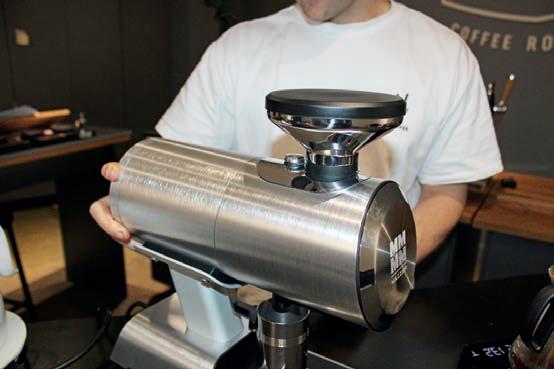
Dial in the coffee grinder by turning the step dial located at the back of the grinder. The dial can be navigated left and right in six-micron increments or stepless.

Using Mazzer’s magnetic dosing cup, measure 20 grams of beans and place them in the hopper. Turn the grinder on and open the hopper gate to release the beans and begin the grinding process.
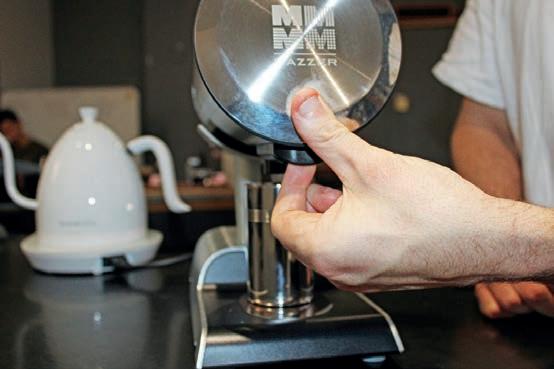
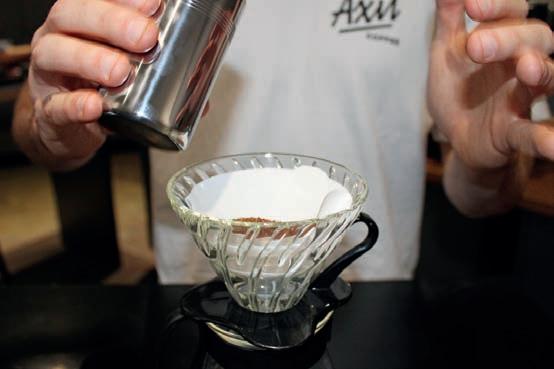

Using 300 grams of water in total at a temperature of 90°C, pour 60 grams into the filter paper to saturate the coffee grounds. Allow the coffee to bloom. Repeat this four more times at 30-second intervals.

Complete the brew time within 2:30 and 2:40 minutes. Serve, and enjoy.
beanscenemag.com.au 57
Using a Hario V60 Glass Dripper, put the ground coffee in the filter paper.
Once the coffee is ground, pull and release the chute knocker multiple times to discharge the coffee grounds until you have 20 grams weighed.
Jack Simpson is the two-time Australian Barista Champion, 2024 WBC runner-up and Mazzer brand ambassador.
Images: Prime Creative Media.

Automating generosity
How a partnership between Franke and The Common Good Coffee Company is helping to brew kindness across Australia.
he Australian coffee scene is known around the world as being a supportive, inclusive, and collaborative industry that shares knowledge and rallies around its local communities. The Common Good Coffee Company in Sydney embraces that spirit and takes it a step further by raising money for local causes and nationwide mental health projects all year around.
Since it was established in 2018, The Common Good Coffee Company has raised more than $65,000 for good causes across Australia. From every kilogram of coffee sold, the roastery donates $1 direct to Beyond Blue, a mental health charity that offers 24/7 telephone support for those who need it. The team are so passionate about highlighting mental health that their compostable takeaway cups are adorned with uplifting messages, such as ‘think happy thoughts’ and ‘wake up and smile’.
The company also runs ad-hoc fundraising initiatives, such as donating 50 cents from every coffee sold at partner venues, as a localised response to natural disasters such as wildfires, droughts, and floods. It also supports other continual community projects like women’s refuges.
“We offer total coffee solutions, but at our core we’re a community-based business,” says The Common Good Coffee
Company General Manager Kate Greaney. “We get behind our partner venues, many of which are in rural areas, to help them support their local communities.”
The company provides complete coffee solutions to more than 200 businesses across the country, from far north Queensland to Western Australia – and every state in between. Venues range from petrol stations and convenience stores to office spaces and mining sites, with The Common Good Coffee not only providing beans but also environmentally friendly cups and automatic machines for a complete bean-tocup experience.
“The idea is to be a one-stop-shop for our customers. We’ll recommend a machine and a blend based on their location, foot traffic, and clientele,” says Kate.
The Common Good works exclusively with Franke Coffee Systems to supply their venue partners with automatic coffee machines. Kate says Franke was the clear choice for the company because of the diversity of its range and the consistency of the machines.
“Franke leads the way in terms of technology and innovation. They’ve got such a wide range of modular units suitable for any type of setup or footprint,” she says.
“These days, customers are looking for an end-to-end experience: they want
to be able to walk into a petrol station or convenience store and know they’re going to get a quality cup of coffee. They’re also looking for options, and that’s where Franke’s machines can really deliver.”
According to Kate, the Franke A600 is the most popular machine among The Common Good Coffee Company’s customers because of its ability to deliver consistently high-quality drinks.
“In times gone by, automatic machines would use powdered milk and poor-quality coffee but now customers expect baristalevel beverages. The A600 grinds whole beans and can offer two different types of fresh dairy milk or plant-based alternatives, thanks to its dual milk system, and two modular powder-dosing units which give additional options of chocolate and chai,” she says.
“The user interface is very easy to navigate and allows the user to customise their order. You can create anything from a long black to a double-shot cappuccino. We recommend the A600 because of its allround capabilities, offering a wide range of choices to cater to various preferences. With its ability to consistently deliver delicious coffee, the A600 ensures every cup is a satisfying experience for the customer.”
The Franke SB1200 Speciality Beverage Station, one of the Swiss manufacturer’s
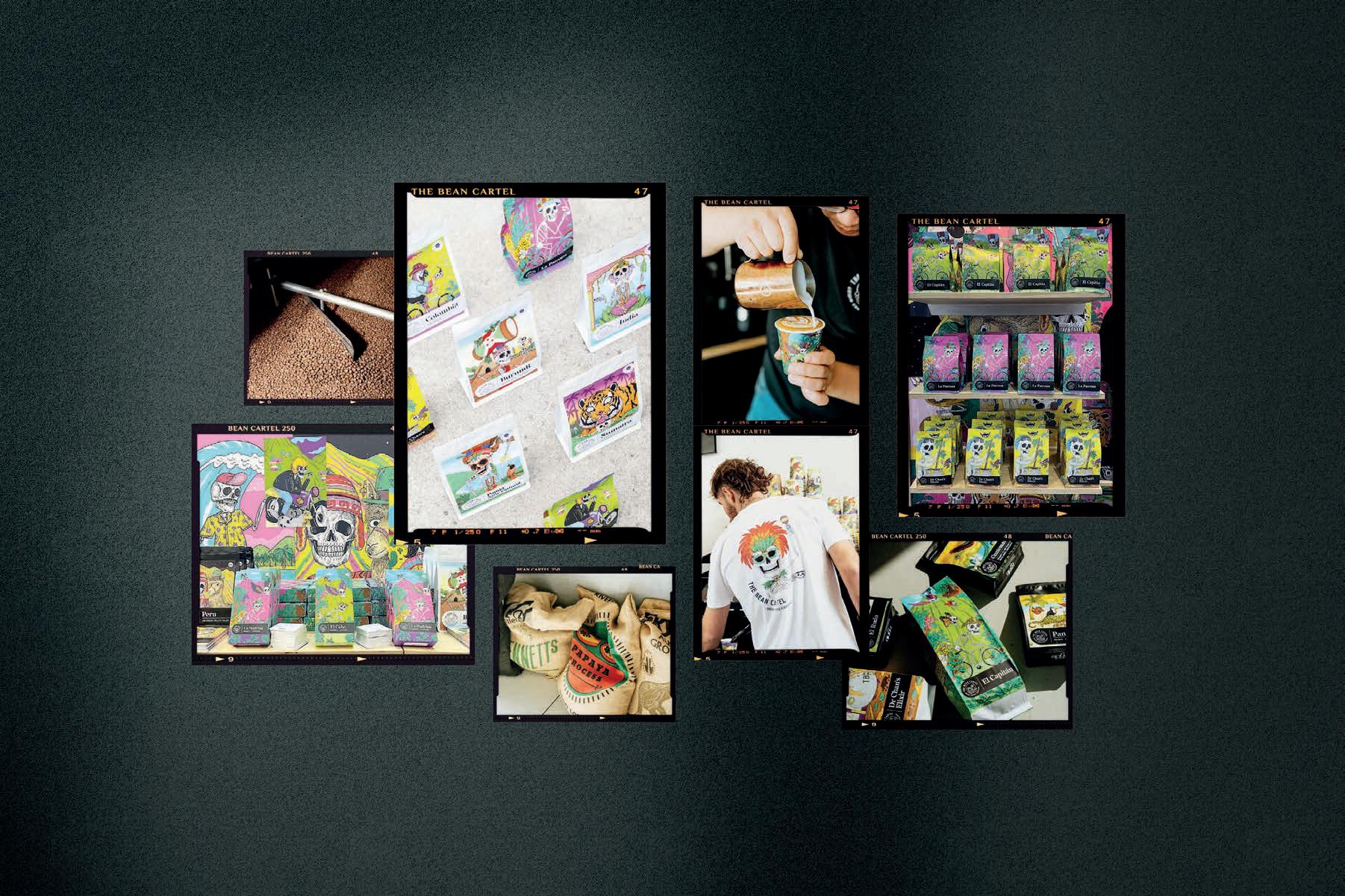

58 beanscenemag.com.au
TECH PROFILE
The Common Good Coffee Company cups deliver uplifting messages.

more recent releases, is also gaining interest thanks to the vast range of beverages that can be crafted from the machine.
“Everything a barista can create from a café counter can be done at the touch of a button by the SB1200. With a rise in consumers choosing to avoid dairy, its ability to offer four different milks – full cream, skimmed, and two dairy alternatives – through separate lines to avoid cross contamination is greatly received,” says Kate.
The machine’s inbuilt Flavor Station is another key feature, giving users the ability to customise their drinks with a variety of flavoured syrups. It also has the option to create hot and cold varieties of popular beverages.
“The feedback from our partners has been amazing. Many are reporting that the machine’s ability to deliver the perfect cup every time is building customer loyalty, with many coming back to the venue every day just to get their morning coffee,” says Kate.
The fact that the Franke coffee machines can perform many of the cleaning tasks automatically appeals to busy venues such as

“Cleaning the Franke coffee machines is a breeze. All the shop owners need to do is simply add the specialised Franke cleaning solutions and press a button. The machine will take care of the rest, efficiently and effectively cleaning all the internal components,” says Kate.
The team at The Common Good Coffee Company work very closely with Franke to ensure their fleet of machines run smoothly.

very quickly, so it’s essential to us that any technical issues are sorted quickly,” she says.
“David Downing [Business Development Director Oceania] and the team at Franke have been amazing; they feel like an extension of our own team. Problems are resolved quickly and efficiently, and our customers really appreciate that. They’ve been fantastic to work with and endlessly supportive of our wider mission.”

SPECIALTY COFFEE ROASTERS FOR WHOLESALE & HOME
Explore our world of dangerously good coffee anytime at thebeancartel.com.au
The Franke SB1200 offers four different milks through separate lines to avoid cross contamination.
@thebeancartel Unit 5/39-43 Duerdin St, Notting Hill VIC 3168 1800 232 622 · thebeancartel.com.au
Dream builder
Mat Picone of Merchant Coffee Roasters reveals how Roastquip and IMF helped him scale up his operation and fulfil his dream of putting regional Victoria on the coffee map.
hen Mat and Lee Picone moved from Melbourne to Mansfield, regional Victoria, in 2014 to open a roastery café, they had vague plans they’d dabble in a bit of wholesale roasting on the side of their main operation. For experienced barista Mat, the main agenda was introducing the kind of specialty coffee he knew and loved in Melbourne to his new local community.
Like all good things, word spread fast about the café, Mansfield Coffee Merchant, and the own-roasted coffee his team were
serving. Requests for beans to brew at home soon turned into wholesale enquiries from other businesses in the area.
“I wanted to create a Melbourne café in the middle of the country,” says Mat. “We bought a five-kilogram Roastmax and put it in the window. I didn’t anticipate we’d get as busy as we did as quickly as we did. It took off straight away and the requests for wholesale coffee soon started rolling in.”
Within just 18 months, the five-kilogram roaster was being outpaced by orders. The acquisition of a few key clients meant the team were roasting around the clock.
“When you start roasting eight hours a day, seven days a week on a single roaster you realise something has to change,” says Mat.
“In 2015, we took the plunge and bought a 15-kilogram Roastmax from Will Notaras at Roastquip and signed the lease on a standalone roasting venue. It was at that point we split the café business from the roasting side, establishing Merchant Coffee Roasters.”
Over the next few years, the Merchant Coffee Roasters brand continued to grow, acquiring café partners across Victoria and beyond.

“We got to that point again when we were roasting all hours of the day and needed to decide where the business was going,” he says. “With young kids at home, moving more into the roasting side of the business was going to give me a better work/ family life balance.”
The answer for Mat was buying a plot of land and investing in a 60-kilogram IMF from Italy with the help of Will at Roastquip, IMF’s Australian agent. Keen to stay in his local community, in 2019 work started on a new roastery in Mansfield with an adjoining café including views into the working roastery.
“It was very important for me to keep the roastery in Mansfield,” says Mat. “It’s part of who we are and it’s a point of difference for us. We’re always eager to spread the word that you don’t have to be in Melbourne to get great coffee.”
Since the new roastery was completed in 2021, Merchant Coffee Roasters has rapidly increased its production output to around 2.1 tonnes a week – growing to up to 3 tonnes a week during the winter thanks to the popularity of its partners in the nearby alpine resorts.
“Using the IMF, the growth has been seamless,” says Mat. “I know with this size we’ve got plenty of room to continue to grow, it’s just a case of putting a few more roasts through the machine.”
Working with Will previously, for Mat it was an obvious choice to collaborate with Roastquip to take his business to the next level.
“We’ve always had a really good experience with Will, so knowing we’d get that unrivalled support was really important,” he says. “It has been in here for
60 beanscenemag.com.au INDUSTRY PROFILE
Images: Merchant Coffee Roasters.
With the IMF RM60, Merchant Coffee Roasters has increased its output to over two tonnes per week.

nearly two years now and it’s never missed a beat. We love it.”
One of the features of the IMF RM60 that appealed to Mat and team most was its energy efficiency and low carbon-footprint.
“The fact it reuses the heat and can operate on much less gas than standard machines really appealed to us for both environmental and economic reasons,” he says.
In fact, the machine’s gas saving features and recirculating heat technology saves up to 47 per cent in gas consumption thanks to a single burner. The clean recirculating heat from the combustion chamber is controlled electronically to provide one-degree air temperature accuracy inside the drum. Once the 12-step profile is programmed, every roast will be consistent whether it’s the first or last roast of the day.
Mat says it’s a machine almost anyone can get a handle of in just a few hours of training. The IMF automatically loads the green coffee, precision roasts, cools, destones the coffee, and empties the chaff into a bin.
“We can be packing coffee while we’re roasting, saving valuable time and labour costs. When developing new blends or single origins, we can operate the roaster in manual, semi-automatic, or fully automatic mode. It also connects with Cropster and Artisan data loggers, and has a modem
fitted for remote assistance which is peace of mind for us since we are in a regional area. The technology in the machine is incredible,” says Mat.
The installation of the 60-kilogram roaster has enabled Mat and team to continue to expand the Merchant Coffee brand throughout regional Victoria. Yet, however big it may become, their focus will always remain on supporting other regional businesses.
first focus,” says Mat. “When I initially opened the café in Mansfield, before we started roasting for ourselves, I quickly realised I wasn’t getting the support from coffee suppliers that I would have received if I was in the city.
“Delivering that high level of service became a real focus of ours and will continue to be so.”
For more information, visit

beanscenemag.com.au 61
Mansfield Coffee Merchant was established in 2014.
The café focuses on delivering a high level of service.
Toby’s takes on Queensland

Toby’s Estate experience for the coffee curious of Brisbane.
ith a vibrant specialty café scene, a coffeeconscious demographic, and a growing community of businesses popping up in its former wool stores, the riverside suburb of Newstead was a nobrainer for the Toby’s Estate team when searching for a home for their Brisbane flagship café. It’s the kind of place that leans into its industrial past: breweries, wine bars, and coffee shops make the most of the heritage buildings’ high ceilings, open-plan layouts, and polished concrete floors.
“Over the past few years, Newstead has established itself as a real contender in Brisbane’s specialty coffee space,” says Toby’s Estate QLD State Manager Sam Bennett.
“What the Toby’s Estate team love about this area is its diversity; it’s the place to be in Brisbane, but it also has an established demographic who embrace it as it changes. It’s got a great mix of business and residential, and we love that energy.”
The Sydney-based brand has a flagship café and roastery in Chippendale, New South Wales, where it was established more than 27 years ago, as well as venues in the Middle East, Singapore, Indonesia, and the Philippines. With the Olympics on the horizon and a strong following in Queensland, Toby’s Estate saw 2024 as the perfect time to introduce a Brisbane flagship café to the family.
The venue, which opened on 1 May, is set within the historic former Wilcox Mofflin
wool store. The team have consciously refurbished the space, showcasing original features such as exposed brick walls and concrete floors alongside the contemporary vision of Melbourne architect Russell & George.
“It’s a heritage-listed building with a beautiful, historic exterior. Inside, we’ve done a complete fit-out so it’s really young and fresh,” says Sam.
“The centrepiece is the circular bar at the heart of the space, which has seven tiers of cavity-lit retail shelves. The central counter also features espresso, filter, and training bars, which allow customers to get up close and personal with the coffee making process.”
Each of Toby’s Estate’s flagship stores
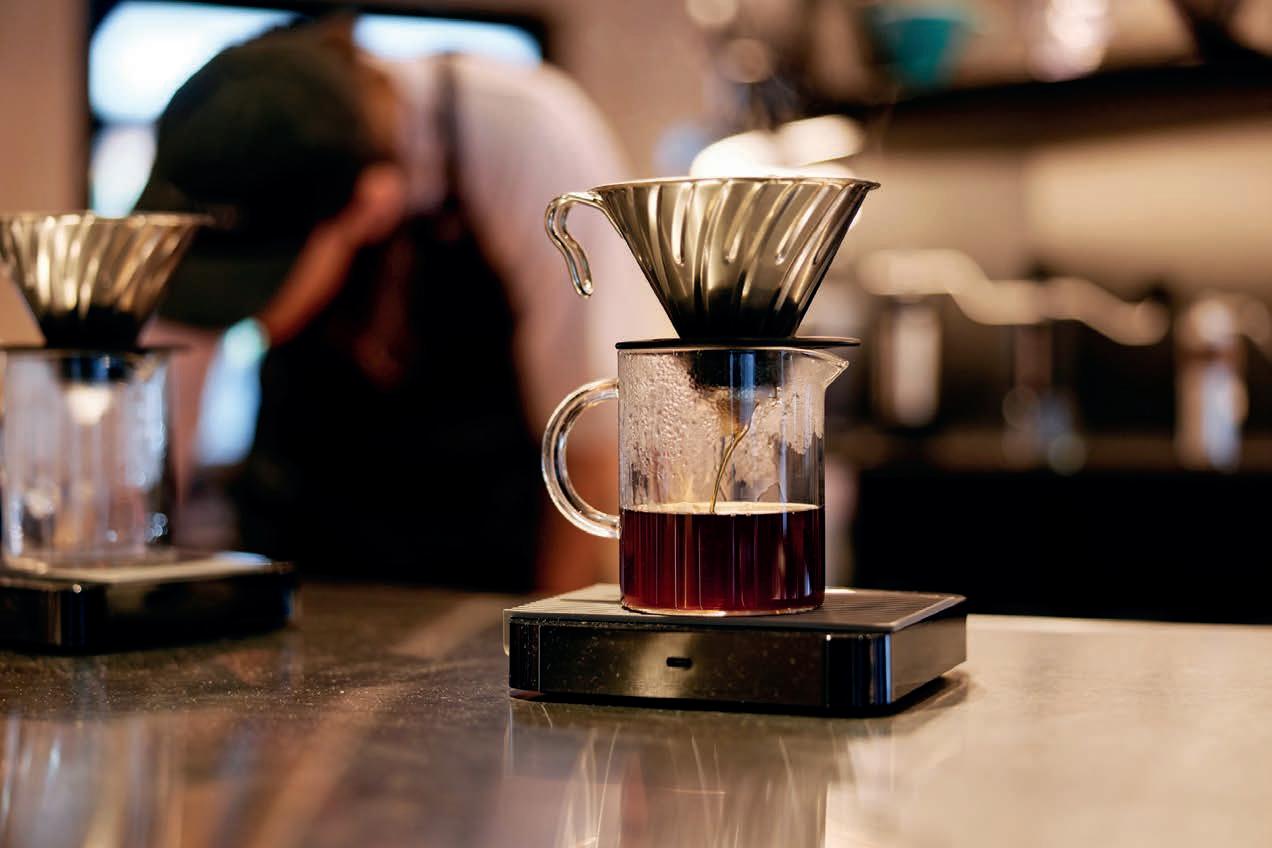
62 beanscenemag.com.au INDUSTRY PROFILE
Toby’s Estate’s new Brisbane flagship is located in the historic former Wilcox Mofflin building.

has a unique design to complement its local setting, yet Sam says they all have common threads that signify they’re part of the wider family.
“They all have a New York loft-style vibe, with coffee front and centre. The colours, textures, and materials used continue the theme throughout each venue,” he says.
While the team have worked hard to design a cool place for locals to hangout and catch up with friends, the core aim of the Brisbane outpost is to create a space where Queensland’s coffee geeks can nerd out over Toby’s Estate’s vast spectrum of coffees.
“Alongside our espresso menu, which is served on a beautiful Slayer Steam EP threegroup machine, we have a full filter bar with around seven or eight different single origin options available at any time,” says Linda Maksic, Toby’s Estate Coffee Trainer.

“We run free monthly sessions for the local community who want to sample and learn about the single origins we’ve got on offer that month. They can come in and ask the team questions and discover how to get the best out of their coffee.”
The highlight of the coffee offering, however, is the Freezus menu. A selection of Toby’s Estate’s best coffees from that producing year, the beans are roasted and
“THE FROZEN MENU IS A TIME CAPSULE OF TOBY’S ESTATE’S BEST COFFEES.”
then frozen to stop the aging process. The rotating collection of coffees is updated regularly as the roasters continue to add the best coffees from each country as the year goes on.
“The frozen menu is a time capsule of our best coffees. We freeze each coffee at its peak to preserve the beans’ unique characteristics, which allows us to enjoy them for years after roasting. It’s a curated selection of our most elite and interesting roasts that we’re super proud of,”

While getting the Brisbane venue ready for its launch day in May, where the team served free coffee to locals throughout the morning, the Toby’s Estate team were also working on the revamp of its Singapore flagship, which reopened following a refit at the end of the same month.
The Robertson Quay café has been a favourite among Singapore’s specialty coffee fans since it opened 15 years ago. The site has received a top-to-toe makeover, with Australian designers Atelier and Alpha giving the space a contemporary new look to reflect the company’s modern approach to coffee roasting.
Alongside the unveiling of the new space, the Toby’s Estate team also launched the latest release in their Flavour Series in Singapore. Pandan Waffle, a limited-edition blend, embraces traditional Southeast Asian flavours and delivers tasting notes of pine lime ice cream, coconut cream, and melon.
All the brand’s specialty coffees can be experienced at the café’s new interactive espresso and filter bars, where customers can watch the baristas work their magic. There’s also an Aussie-inspired food menu to complement the coffee, creating a little slice of Antipodean café culture For more information, visit tobysestate.com.au
beanscenemag.com.au 63
The Freezus menu of frozen coffees features the roaster’s top-flight beans.
The flagship features a circular bar at the heart of the space.
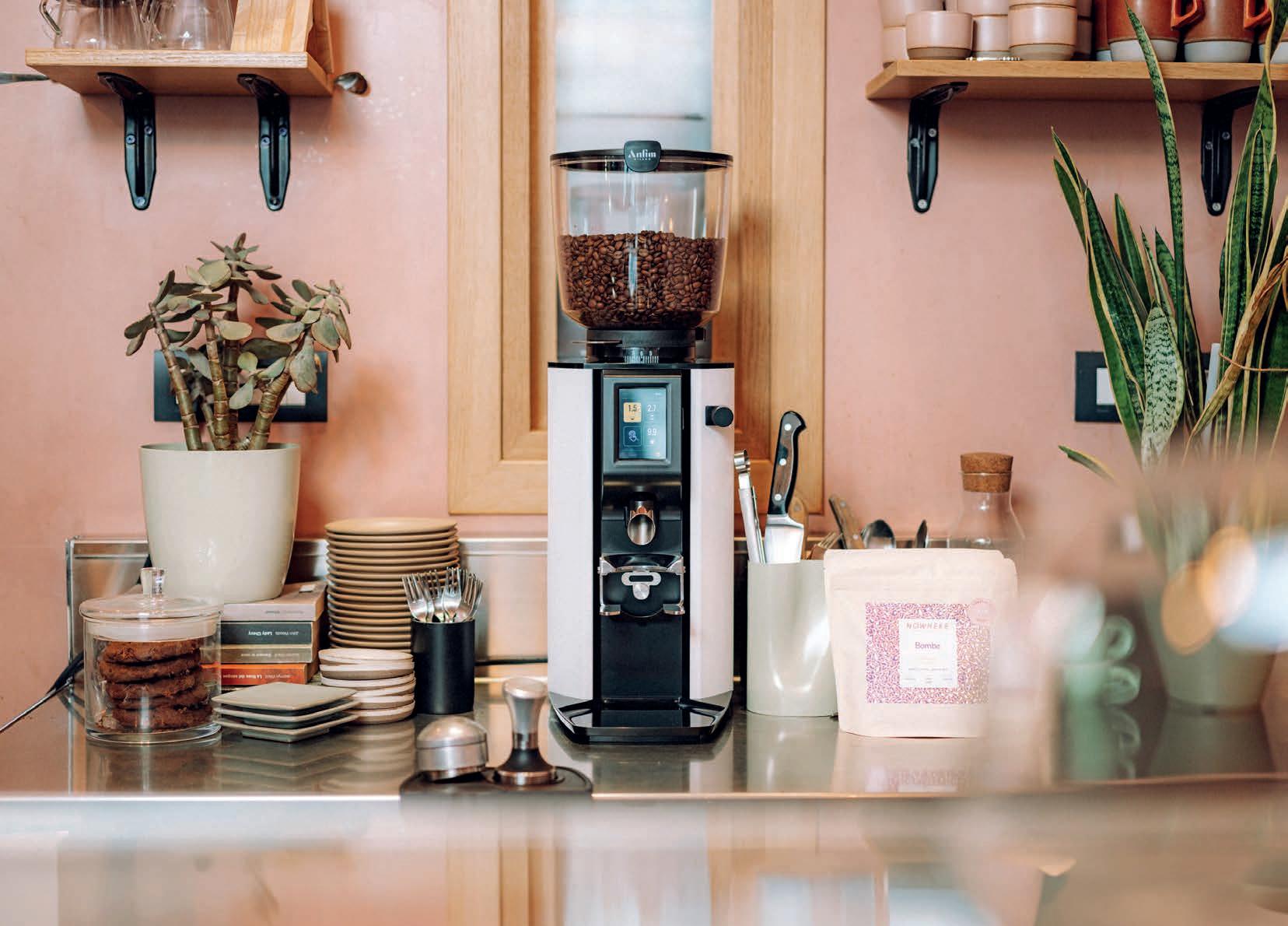
Rise and grind
Anfim Ambassador Jessica Sartiani on why the Alba is the perfect grinder for busy Australian cafés.
n Italian, the word “alba” translates to “sunrise”, which is a fitting name for a machine that helps coffee drinkers start their day in the best possible way. For the designers and engineers at Anfim – part of the Hemro Group of coffee brands which also includes Mahlkönig, Ditting, and HeyCafé – the name Alba was the natural choice for its next grinder.
Released in November 2023, Alba is the bigger sibling to the Luna grinder, which has proved resoundingly popular since its launch in January 2023 as the first model in a new era of contemporary grinders from Anfim.
“The Alba has all the characteristics of the Luna – the traditional Italian quality expected from Anfim products along with a contemporary design – but the burrs are bigger, so it works faster and will keep up with the demand of high-volume cafés,”
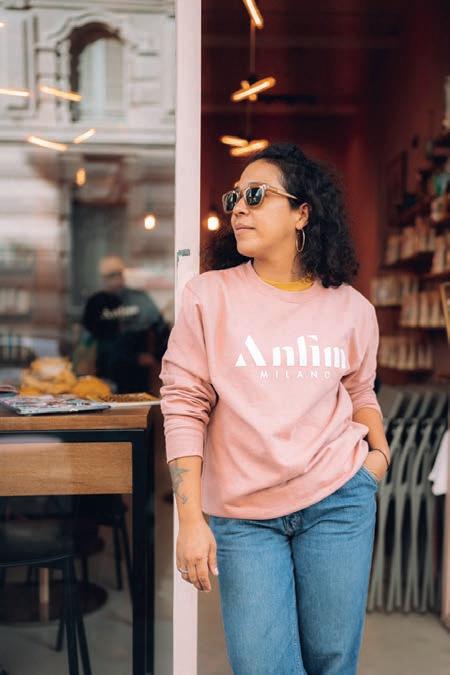
says Anfim Ambassador and Barista Jessica Sartiani.
“The Alba’s flat burrs, which are designed and produced in Germany, are 80 millimetres in diameter compared to Luna’s 65-millimetre burrs. This makes it a great option for cafés that are going to be using the grinder all day, from open until close.”
According to Jessica, these larger burrs also contribute to the increased speed of the grinder. The Alba can deliver a dose for a double shot of espresso in just 2.6 seconds, speeding up the workflow for baristas in busy venues. There are a number of other features designed to aid workflow too, including the portafilter holder.
“In my experience as a barista, having a portafilter holder is really important. What I love about the Alba is that you can set the size of your portafilter for the holder, which will ensure all the grinds end up in the basket, not on the counter. This will save
64 beanscenemag.com.au TECH PROFILE
The Alba can deliver a dose for a double shot of espresso in just 2.6 seconds.
Images: Hemro Group.
Jessica Sartiani is an Anfim Ambassador.

the barista from wasting time clearing up” says Jessica.
“The grind spout is also adjustable, which again helps to keep the workspace tidy. It’s removable too, making cleaning super simple.”
Jessica highlights the stepless grind setting, which makes adjusting the grind as seamless as possible.
“Being able to change the grind quickly and easily is essential for a busy café; you want to spend time engaging with customers not fussing around with the equipment,” she says.
Jessica and the Anfim team recently put the Alba’s capacity to the test at Milan Design Week, where a different roaster used the grinder daily to serve coffee to the event’s hundreds of visitors.
“We did around six to eight kilograms each day, and the roasters were blown away by the quality and consistency of the coffee the Alba was producing at that volume. Despite the amount of beans going through the grinder, the motor kept the temperature consistent and therefore the flavour of the coffee remained high,” says Jessica.
Just like the Luna, the Alba has a 3.5-inch touchscreen display with an open interface for third-party content. While baristas can use the manual mode, it also has the capacity to store three programmable recipes to lock in dose settings, which again saves the user valuable time.
“My favourite thing about the touchscreen display is that you can personalise it with your own logo to integrate it with the interior of your venue,” says Jessica.
“Having three programmable recipes means users can easily switch timings for different portafilters, for example if you’re using a naked portafilter or if switching from a 17-gram basket to a 20gram version.”
When designing both the Anfim Alba and Luna, the Hemro Group team were keen to make them simple to clean and disassemble for any maintenance.

“It’s important for baristas to have easy access to the burrs so they can be cleaned regularly. A lot of baristas aren’t used to disassembling the grinder because they think it’s too difficult,” says Jessica.
“With the Alba, it’s straightforward and regular cleaning will result in a super clean cup of coffee. Ideally, I would recommend cleaning the burrs every day, but realistically I know many baristas won’t have the time at the end of each shift, so I suggest a minimum of at least once a week –especially for high-volume coffee shops.”
Jessica and team believe cleaning is a such an essential part of the coffee preparation process that at their recent series of Café Throwdown competitions they introduced a cleaning round.
a 3.5-inch touchscreen display with an open interface for third-party content.
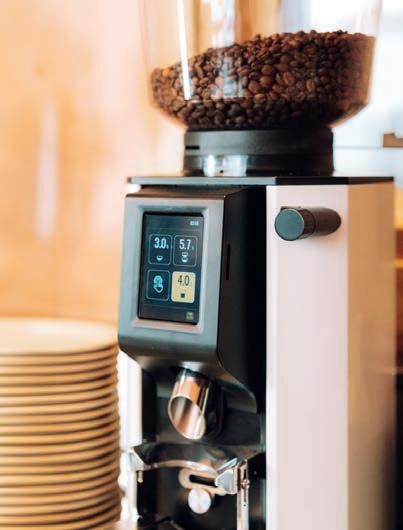
dissemble and clean the Luna grinder, with the fastest team earning top points.
“We purposely didn’t give the competitors the chance to practise on the grinder as we wanted to demonstrate just how easy it to clean in the café setting. It was a great display of their barista knowledge and teamwork,” says Jessica.
The winners of the two competition rounds took home a new Luna grinder. Jessica says the event was such a success that they’ll be running more in the future.
“This year was our first event and we had 14 teams enter in total. Lots of people who came to watch have already said they’ll sign up to the next one, so we expect it to be bigger and better,” she says.
For more information, visit anfim-milano.com/en
beanscenemag.com.au 65
Jessica Sartiani says the Alba grinder is a great option for cafés that will use it all day.

Cut from the same cloth
Euroespresso on its partnership with La Pavoni and why the synergy between the two brands is important to uphold.
taly, the birthplace of espresso, is home to many of the most prestigious manufacturers of espresso equipment.
As such, Euroespresso Machine Company has had its finger on the pulse of Italian espresso culture since it was established in 1968.
Husband-and-wife team Marcello and Vera Nadile bought the business in 1986 and carried on the company’s tradition as La Pavoni specialists.
For more than 38 years, Marcello and Vera have provided a complete coffee service in the heart of Sydney’s inner west from their headquarters in Annandale.
“We are a family business. As part of our team, my brother-in-law does the machine servicing, my sister-in-law and her daughter work with us, and our own daughters work here on weekends. The fact that each individual treats this company like their own is testament to our service and the passion we bring to each customer. Our team of experts are here to guide people and help improve their knowledge and skills,” says Vera.
“I knew that if I was going to start a business in Australia, I wanted it to be something to do with Italy,” says Marcello “Italians are known for style and quality, and that’s what the La Pavoni brand is about. Since 1905, the iconic engineering of these machines has stood the test of
time as the original workhorse of Italian espresso machines.”
Marcello and Vera expanded their operations to include a roastery from which to launch their own coffee brand, Caffe EuroBlend.
Their signature roast, Pavoni Blend, has an intense aroma, moderate acidity, fruity wine essence, rich body, and creamy dark chocolate flavours. Marcello says offering coffee allows Euroespresso to provide a holistic approach.
“We originally invested in La Pavoni because we believed in the brand, but when you add in the coffee to go with the machines and servicing, it makes us a more sustainable business model because we are able to provide a complete service for our customers,” says Marcello.
“The secret to an amazing coffee extraction starts with the right beans, grinder, and machine, and then understanding the variables in the roast, temperature, grind, and quantity of coffee. We source, roast, and blend quality coffees from all over the world, which only encourages our customers to buy a La Pavoni machine, as these espresso machines bring out the best in our coffee.”
Marcello describes La Pavoni machines as “extremely durable” and says they are an economically sustainable investment.
“Some customers have had their machine for 30 or 40 years. This is the best
example of sustainability; these machines can be serviced, and that’s when people become really connected to their machines. We know people love to buy new things, but La Pavoni machines really last. Some people might not know how to use them, but that’s what we’re here for: we spend time with our customers to show them how they can maximise their investment by giving free demonstrations on the simple chemistry behind an espresso extraction. This allows our customers to have peace of mind with every purchase,” he says.
Marcello says Euroespresso also maintains a strong commitment to the environment.
“We’ve been using around 60 solar energy panels since 2014. Our customers recycle our coffee husks and spent coffee granules. We give our hessian sacks away for repurposing, and we only use recyclable coffee cups,” he says.
“Looking to the future, we are also looking to phase out plastic lids in our business and are investigating alternatives such as bamboo and more biodegradable options.”
According to Marcello, Smeg’s acquisition of La Pavoni allows the brand to share knowledge and mutual affinities for product lines, paying attention to design and details while affirming the quality of ‘Made in Italy’ products.
“As the original importer of La
66 beanscenemag.com.au INDUSTRY PROFILE
Images: La Pavoni.
The Euroespresso coffee house is located in Annandale, New South Wales.

Pavoni machines, we used to have all the commercial and domestic machines shipped from Italy. Since Smeg has purchased the brand, buying direct from them has been a huge advantage,” says Marcello.
“We still also import genuine La Pavoni spare parts, which shows our customers we are committed to supporting the longevity of their machines with our experienced service and extensive range of parts.”
Vera says customers can now have the confidence that the La Pavoni brand is backed by Smeg’s expertise and warranty.
“Collaborating with Smeg and sharing our years of technical experience with the brand means we can collectively achieve more. Our main objective is our continued mutual commitment to focusing on customer satisfaction,” she says.
Marcello says Smeg has helped Euroespresso promote the La Pavoni brand and that the two companies work together as one cohesive unit.
“We have a good relationship, which is important because you can learn something from everybody and there’s always room for improvement. You have to adapt, and we’ve adapted well to Smeg acquiring La Pavoni. We are very supportive and work well together,” he says.
Since La Pavoni launched its new

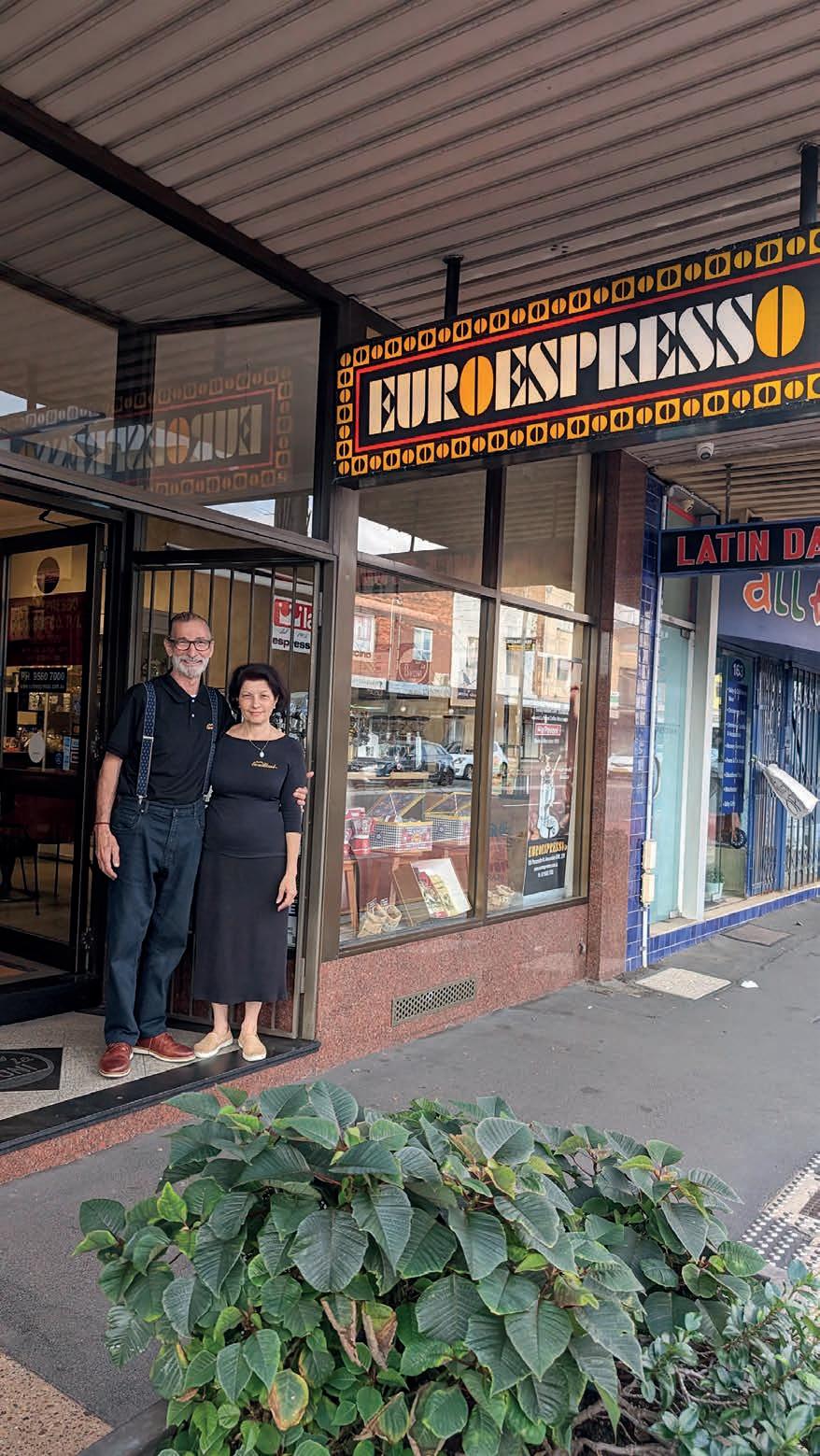
“We want to highlight the improvements. We also want these changes to reflect that La Pavoni is committed to taking on board customer feedback and supplying quality products in short time periods,” he says.
“Moving forward, we will continue to educate people about the important relationship between freshly roasted quality beans, coffee machines, and grinders through product demonstrations, which we believe is the most important part of the process.
“Once people understand how to use the machines, they will feel more confident in buying one and be more satisfied with the first cup of coffee they make at home.”
For more information, visit au.lapavoni.com or euroespresso.com.au
beanscenemag.com.au 67
Husband and wife Marcello and Vera Nadile bought Euroespresso in 1986.
Euroespresso has been an Australian importer of La Pavoni machines since 1968.
Partner of choice
Merlo Coffee details how its personalised partnership model adds value through care, connection, and service.
hen it comes to offering quality coffee and service to its café partners, Merlo Coffee doesn’t believe in a one-size-fits-all approach. Head of Sales Troy Ryan says it’s this dynamic approach that has made the Queensland roaster the coffee partner of choice for more than 1500 partner cafés and restaurants nationwide over the past 30 years.
“We pride ourselves on both the quality of our coffee and our customer service. Merlo is constantly listening to our customers to ensure we are tailoring our service to meet their needs,” he says.
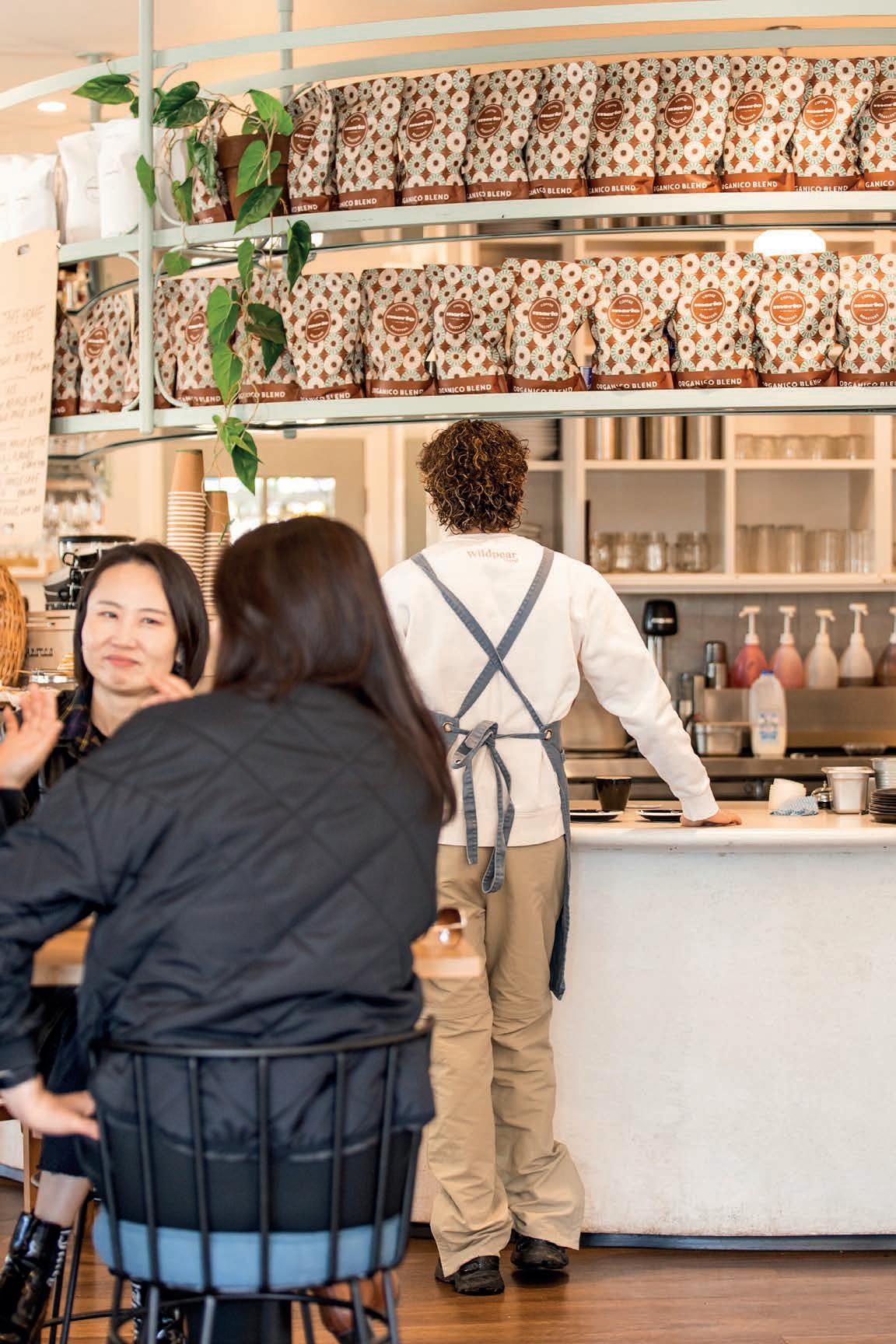
“Merlo frequently delivers value-added coffee experiences, activated through wholesale partners, passing on our knowledge of coffee and brewing methods to our café customers and loyal patrons.”
Troy says Merlo Coffee provides a team of dedicated account managers who are available to all café partners, as well as coffee trainers who can provide ongoing training and support to help customers craft a quality cup every time.
“We can help to educate café owners and baristas in preparing the perfect cup of coffee for their customers, from equipment maintenance to espresso extraction and everything in between,” he says.
Troy adds that Merlo Coffee’s dedicated customer service team is on hand for all enquiries, orders, and assistance, including weekend phone service and 24/7 machinery breakdown assistance.
“With a network of specialised technicians and a round-the-clock emergency hotline, if your machine happens to let you down on a bustling Saturday morning, we’ve got you covered,” he says.
Merlo Coffee tailors its business solutions to meet the needs of its customers, including customised blends and packaging for those seeking a bespoke solution.
68 INDUSTRY PROFILE
Wildpear Café is located in Dural, New South Wales.
Image: Wildpear Café.
“Our marketing team provides branding from traditional cafe umbrellas and barriers to bespoke marketing pieces such as mural installations, events and activations, and custom merchandise and signage,” Troy says.
Beyond coffee, Merlo Coffee also provides a range of hospitality consumables including non-dairy milk alternatives, chocolate powders, sugars, and syrups, as well as branded and unbranded cups in a range of artistic expressions to suit the café.
“We’ve got a great reputation for our ability to build long and strong relationships. These are built purely on a history of consistently delivering quality products and services, and treating businesses like our own.”
One on La Balsa Café, in the coastal town of Buddina, Queensland, is a prime example of Merlo Coffee’s long-standing partnership approach. Café Owners Jeff and Danielle Le Marseny have worked with the roaster for 18 years. Jeff says the level of support and communication they receive is “just as amazing as the coffee itself”.
“Of all the companies we deal with in our business, Merlo is by far the most proactive and accessible. Over all these years, we have only had four sales representatives, and all of them have been so easy to deal with. Nothing is ever a problem,” he says.
Jeff says when he and Danielle first opened One on La Balsa Café and were looking for a coffee roaster, Merlo Coffee
representative came to see us. We felt so comfortable with them; their knowledge and help were outstanding,” he says.
“So many things can go wrong every day in a café. If we ever have a problem with the machine or grinder, which is very rare, Merlo is straight on it, and our downtime is minimal. People see the Merlo sign and know they will get a good coffee.”
“IT’S A TRUE PARTNERSHIP. I FEEL LIKE WE’RE IN BUSINESS WITH FAMILY AND UPHOLD THE SAME VALUES.”
Jeff says the two brands share an easy-going relationship that contributes to the calm and peaceful vibe customers experience when they visit the café.
“When Troy was our sales representative, the place was busy whenever he came in. Troy was always so loud and funny, he had everyone in stitches. Customers and staff just loved that interaction,” he says.
“Out of all the supply companies we use, Merlo is our only partner that comes
coffee and decided to partner with the brand.
“We’ve built a great relationship with the entire Merlo Coffee team, which has allowed us to deliver quality espresso and service to our customers,” says Wildpear Café CoOwner Lorraine Solomon.
“Our fantastic sales representative Glenn May is always checking in on us to ensure our equipment, training, marketing, and coffee supply are all up to date. We couldn’t be happier with their personalised business approach.”
Wildpear Café uses Merlo’s Espresso Blend as its house roast, which includes beans from Colombia, Papua New Guinea, Brazil, Costa Rica, and Nicaragua.
“The Espresso Blend is definitely a crowd-pleaser. It works well in milk-based and black coffees, with a full-body and rich cocoa flavours,” says Wildpear Café CoOwner Sid Solomon.
With so many specialty coffee roasters in Australia, Sid says the decision to partner with Merlo Coffee wasn’t solely based on quality but also the connection it has with the roaster.
“To us, coffee isn’t just about the products: you need to be able to connect with the team. How they support you behind the scenes is just as important, and Merlo has provided that support from day one,” he says.
“It’s a true partnership. I feel like we’re in business with family and uphold the same values. The Merlo team have a

beanscenemag.com.au 69
Merlo Coffee supplies over 1500 cafés and restaurants across Australia.
 ONA COFFEE
ONA COFFEE
58 - 60 Smith Street, Marrickville, New South Wales, 2204 Open Monday to Friday 7.30am to 3pm, Saturday to Sunday 8am to 3pm
While some coffee fans travel from out of state to visit Ona Coffee’s Sydney outpost to sample the roaster’s competition coffees and marvel at its unique setup, Venue Manager Bora Jin says she still regularly has requests for Japanese food from visitors who’ve mistaken the café for a teppanyaki joint.
It’s not a crazy assumption. On first impressions, the new venue, which relocated from the original Ona Coffee Marrickville site close by in November 2023, looks more like a restaurant than a café. The team eschewed the traditional coffee shop layout and instead created three central bars from which baristas offer tailored, elevated coffee experiences.
“We wanted to share the competition experience with our customers and created a setup to reflect that,” says Bora.
As visitors walk through the venue, retail shelves stacked with everything from clothing merchandise to brewing equipment and even Founder Saša Šestić’s own book grapple for their attention before they reach the very special inner sanctum in which the serious coffee business goes down.
“There are three bars: one serving milk and espresso coffees, the other two specialising in filter coffees and signature drinks. Each is staffed by a barista who serves up to 10
guests seated 360 degrees around the workstation,” says Bora.
This bespoke setup means guests get the unique viewpoint a judge would experience, and can carefully watch each step of the preparation. Many of Ona’s best roasts, such as the coffee Hugh Kelly presented in the ASCA Australian Barista Championship earlier this year, are available to order, accompanied by more entry-level beans like the Raspberry Candy house blend, which was inspired by Saša’s winning 2015 World Barista Championship coffee.
The list is more akin to a great tome than a menu, with milk-based coffee, espresso,
“We aim to cater for everyone,” says Bora. “Those who want to try something really special can explore our Masterpiece range, but we also have lots of exciting coffees for those who are new to specialty.” The move to Smith Street has also enabled Ona’s Sydney team to expand the food offering. Head Chef Roger Peeters, who comes from a fine-dining background in the Netherlands, crafts innovative dishes alongside crowd-pleasing Australian brunch classics. Bora recommends Roger’s beef roll, which is braised in coffee for 16 hours and served with house pickled purple carrots and finger limes.

 Ona Coffee’s Sydney café setup gives guests the unique perspective of a competition judge.
Ona Coffee’s Sydney café setup gives guests the unique perspective of a competition judge.
70 beanscenemag.com.au CAFÉ SCENE
Visitors can order barista championship-inspired coffees from the bar.
STROLL COFFEE
48 Hurstmere Road, Takapuna, Auckland, New Zealand, 0622
Open Monday to Friday 7am to 4pm, Saturday to Sunday 8am to 5pm
As Eddie Chae prepared to compete in the Auckland regional round of the 2024 New Zealand Specialty Coffee Association (NZSCA) National Barista Championship in March, he was confident he could present and explain his creations in an engaging way because it’s what he does day in, day out at Stroll Coffee.
After working in the business side of the industry for many years, most recently in quality control at Toasted Coffee Roasters, in January 2024 Eddie felt the itch to return to the counter and opened his beachside café in Takapuna.
“I’ve always been passionate about making coffee and bringing a smile to customers’ faces,” he says.
Eddie’s former employer supplies Stroll with a wide variety of locally roasted coffee. The selection, which includes the whole spectrum of roasts from dark and chocolaty to light and fruity, even features some of the single origins Eddie worked with during his time at the company.

a flat white, I like to take them through the choices,” Eddie says. “I make sure I have an understanding of what it is they’re after.”
“At the moment, our customers are loving all the options we’re giving them,” he says. “Everyone has a different palate, and we’re trying to cater for all of them.”

15 Riseley Street, Applecross, Perth, Western Australia, 6153 Open Monday, Wednesday to Sunday 7am to 3pm
A fter 14 years in the café industry, Erika Ding was ready to walk away and start a new career path when a too-good-to-miss opportunity presented itself.
Situated right by the beach at Takapuna, Stroll Coffee’s name is inspired by its setup.
“I got a call about a property opening up in Applecross,” says Erika. “I wasn’t planning on getting back into the café scene, but it was just too good to pass up.”
Soon after acquiring the space in early 2024, Erika and her business partner and cousin, Florence Sukmono, opened Kona Café. It was the first time she had run her own café without the umbrella of a franchise over her head, which meant she had the freedom to choose her own equipment, design, and, most importantly, beans.
“I tried around eight different roasters before eventually going with Locale Coffee Roasters,” she says. “What impressed me about them was their support and customer service. They even invited me to their headquarters for a tasting.”
Erika says Locale’s range of coffee blends was also a contributing factor to her decision, finally deciding on Original Gangsta as Kona’s house blend for milkbased drinks and The Real MVP blend for black coffee.
While still in its infancy, Erika says Kona has been embraced by the local community, with its opening weekend being one of the busiest shifts she’s experienced in her hospitality career. This included a visit from former Western Australian Premier Mark McGowan, which Erika says was an unexpected but exciting moment for the café.
T he café’s location in the busy heart of
“We only do takeaway coffee, so we chose the name because our customers like to go for a stroll on the beach with a coffee in hand,” says Eddie.
The location is also special for Eddie as it’s where he grew up.
“I get to see some old faces, like high school mates walking past,” he says. “It’s been special to come back home.”
Applecross has contributed to its popularity, according to Erika.
“People love to take pictures here, whether it be because of the coffee, food, or decor,” she says.
Erika credits her team, including Florence and Consulting Chef Josh Chen, for the café’s first few months of smooth sailing.
“It feels like we’ve been in business together for years,” she says. “We all know how to work well together, and it’s been a joy to be a part of.”
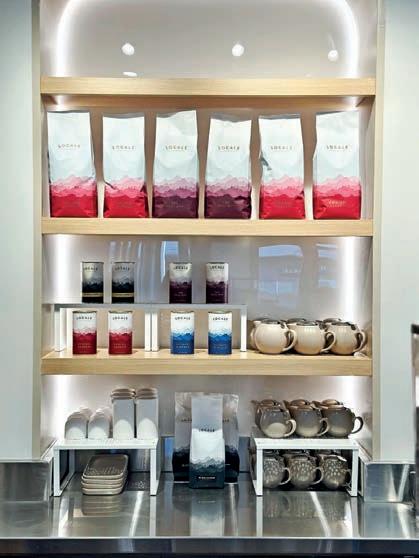 The café has a wide variety of locally roasted coffee.
Images: Kona Café.
Image: Stroll Coffee.
KONA CAFÉ
Kona Café is in Applecross, Perth.
The café has a wide variety of locally roasted coffee.
Images: Kona Café.
Image: Stroll Coffee.
KONA CAFÉ
Kona Café is in Applecross, Perth.
beanscenemag.com.au 71
Kona Café serves Locale coffee.
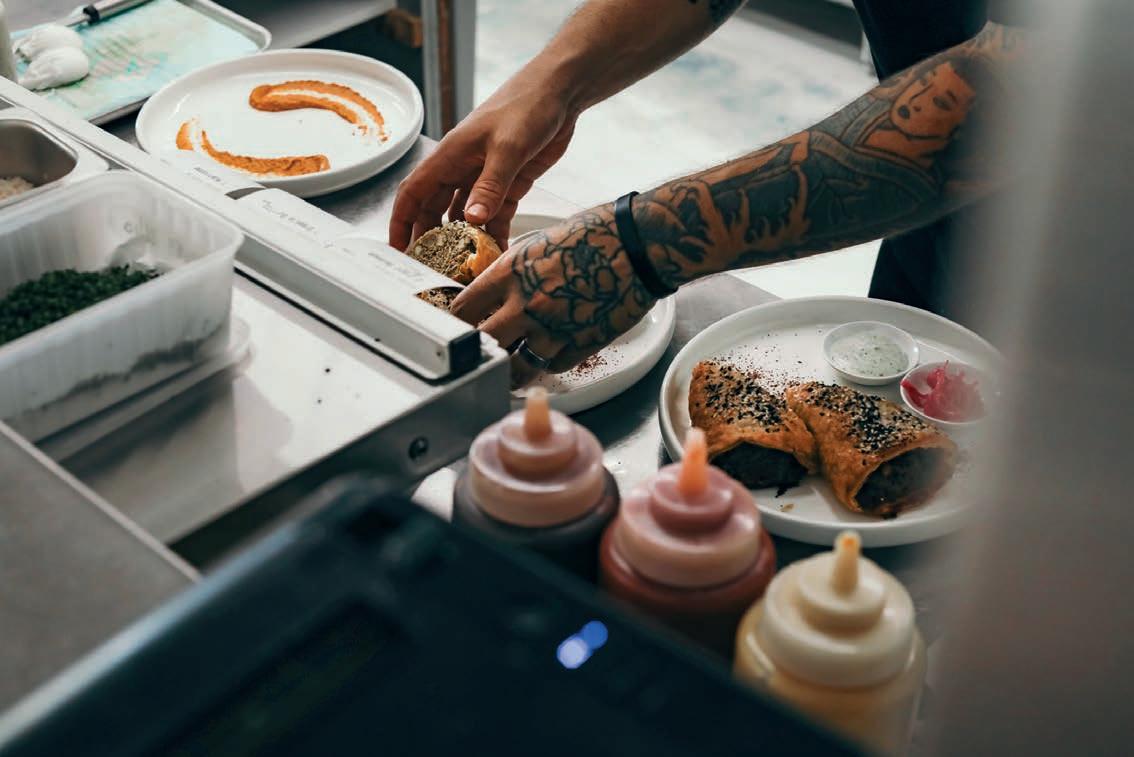 HIDDEN GEM
HIDDEN GEM
3/28 Station Street, Tugun, Queensland, 4224
Open daily 5am to 1.45pm
Raised in a hospitality household, Gemma Boxsell knew she would end up in the café industry eventually.
“My dad is a pastry chef who owned a bakery. My brother became a pastry chef as well, so I’ve always been surrounded by coffee and food,” she says.
While baking remained close to her heart, Gemma realised her real passion laid in coffee. After trying various positions in the hospitality industry, she opened her first café, Hidden Gem, in 2015. Its name was inspired its location, tucked away in the backstreets near the highways of Tugun, and the shortened version of her name.
“As a business owner, you have to be an all-rounder, so while I love making coffee, I still help out in the kitchen with the baked goods,” she says.
The café has become a platform for Gemma to share her coffee knowledge with the local community through a series of masterclasses, which she hosts in collaboration with Paradox Coffee Roasters.
“It’s been so much fun bringing the best coffee to our community,” she says. “I’ve always wanted to do educationbased coffee events so I could share what I’ve learnt.”
One of Hidden Gem’s recent classes taught customers how to get the best
extractions at home by walking them through the basics of coffee equipment and preparation.
“Many of the students brought their own Hario V60s in and it went really well,” she says.
These classes are just one of the ways Paradox has helped the business since they started working together in 2020.
“They’re a great group of professionals who know what they’re doing,” says
Gemma. “They come in on a weekly basis to check in on us and to help train our staff, which has been a big help lately.”
Hidden Gem uses Paradox’s Penny Lane as its house blend, while also experimenting with its range of filter coffees which are part of a rotational menu.
“I’ll sometimes offer customers the filter coffee for free because I really want to see them try it and see how good it is,” says Gemma.
 Hidden Gem Owner Gemma Boxsell’s father and brother are pastry chefs.
Hidden Gem has worked with Paradox for four years.
Hidden Gem Owner Gemma Boxsell’s father and brother are pastry chefs.
Hidden Gem has worked with Paradox for four years.
72 beanscenemag.com.au CAFÉ SCENE
Images: Hidden Gem.
FUEL COFFEE & FOOD
2 Gore Place, Geelong, Victoria, 3220
Open Monday to Friday, 7:30am to 3pm
Geelong locals looking to fuel up on caffeine enroute to the office should make a pitstop at Fuel Coffee & Food in central Geelong, a mere five-minute drive from the waterfront.
“Our focus on consistency and speed is what makes Fuel Coffee one of the best places in Geelong for delicious coffee and great service,” says Owner Jon Katos.
Pre-COVID-19, Jon was a regular customer of Fuel Coffee & Food. Having run a café in Westfield Geelong for years, Jon saw the café’s potential and in 2022 purchased the business, taking on the risk and challenge of transforming it into a coffee shop that prioritises specialty beans. A partnership with Campos Coffee now sees the café serving its Superior blend as standard.
“The Superior blend is a fan favourite and works really well with milk. For black coffee, we have rotating single origins every couple of weeks. We like to mix it up and give our customers something different to try every so often,” says Jon.
The coffee, which is extracted on a La Marzocco KB90 espresso machine
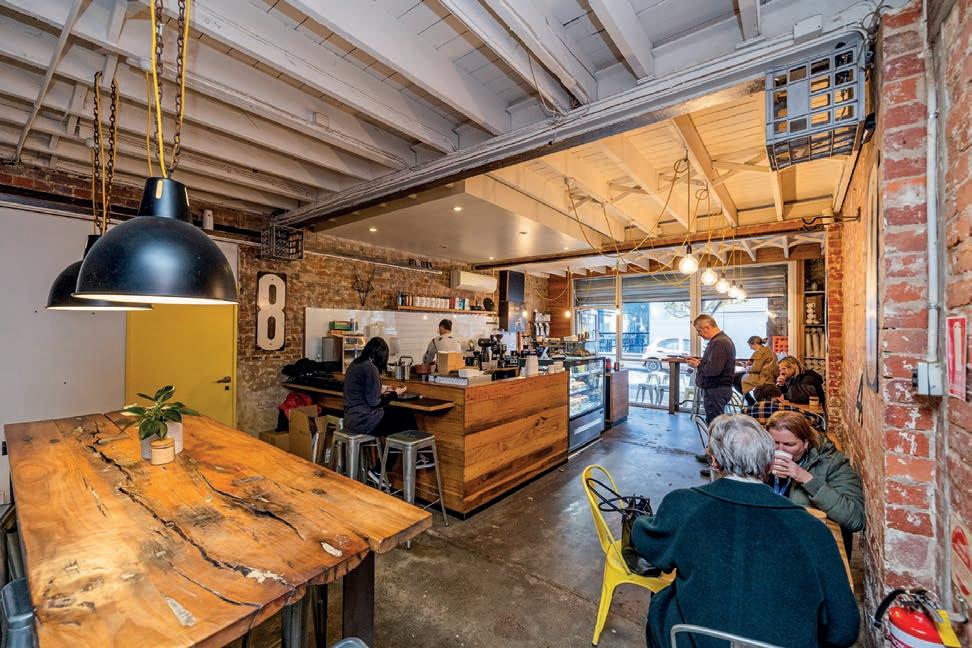
and ground in a Markibar Izaga W or Mahlkönig EK43 grinder, is paired with a simple but delicious food menu focused on fresh and locally sourced ingredients. The café offers a range of breakfast and lunch options, as well as sweets and pastries.
“Our food is tailored towards grab-andgo options, such as pastrami sandwiches, smoked salmon and chicken avocado bagels, plus yogurts and juices,” says Jon.
Officegoers and local foot traffic can be seen heading down the cobblestoned

DEAKIN & ME
7 Geils Court, Deakin, Australian Capital Territory 2600
Open daily 7am to 3pm
Just as chef Zachary Calway was preparing to move overseas for a new work opportunity, a phone call from his former boss, Wally Rao, changed the course of his life.
“Wally mentioned he was thinking of opening a new café in Canberra, and that
he wanted me to be his business partner,” says Zachary.
“I’m a Canberra boy, but I’ve never owned or ran my own business before. I’ve always had a lot of respect for Wally, he’s known as a bit of a café mogul here, and we work well together.”
Deakin & Me opened in June 2022, named after the union the duo hoped to establish between the café and the suburb.
“We wanted to create a sense of community, and we thought the name Deakin
Gore Place to find the hidden-gem café.
The space is small and cosy, adorned with exposed brick walls which give it a unique vibe.
Jon says its specialty coffee, modest menu, and peaceful atmosphere make it a must-visit for anyone in the area.
“We memorise everyone’s names to make them feel comfortable and welcome. Seeing returning customers every day, especially post-COVID, is really rewarding and makes me happy I took on this adventure,” he says.
& Me really signified this,” says Zachary. “I think it’s got a bit of a ring to it.”
He says the café has proven to be a worthwhile investment, but it took a little time for him to learn the ways of a daytime eatery.
“When Wally first approached me with the idea, I had never made a coffee in my life,” he says.
A partnership with Veneziano Coffee Roasters quickly brought him up to speed, with the Melbourne-based roaster showing Zachary and team the ropes.
“Whenever Wally opens a new café, he always partners with Veneziano,” says Zachary. “They’ve given us a lot of love and have taught me a lot. In the first three months, I learned so much about coffee and how to interact with customers, which has since become my favourite part of the job.”
“They were super helpful in getting us set up and making sure everything was running properly.”
Zachary says Deakin & Me has recently become officially branded with Veneziano, which he sees as a great opportunity for both parties.
“It’s been a lot of fun to get the Veneziano word out there,” he says. “The relationship has been great so far, and we know that if we ever need anything, they’re just a call away.”
Co-owners Zachary Calway and Wally Rao at Deakin & Me.
Image: Ben Calvert Photography.
Image: Fuel Coffee & Food.
beanscenemag.com.au 73
Fuel Coffee and Food serves Campos Coffee’s Superior blend.
Rhino


Australian Latte Art Champion and returning BeanScene Espresso
Yourself columnist Victor Vu shares his latte art take on a rhino, which he believes inspires baristas to embrace their power and individuality.
t’s been four years since I first won the ASCA Australian Latte Art Championship, and I was thrilled to win again in 2024 and go on to compete on the world stage for a second time.
For this edition, I chose to highlight my rhino, one of the designs I shared at this year’s national championship. This year I wanted to upgrade my latte art to a higher level to impress the judges. After a two-year hiatus from competing, at first I struggled to get into the right headspace in the lead up to the competition. It took resilience, and positivity to get through it. These are themes I chose to take to the national stage.
To me, a rhino represents strength, bravery, and power; three things I will need when representing Australia at the Worlds from 27 to 29 June in
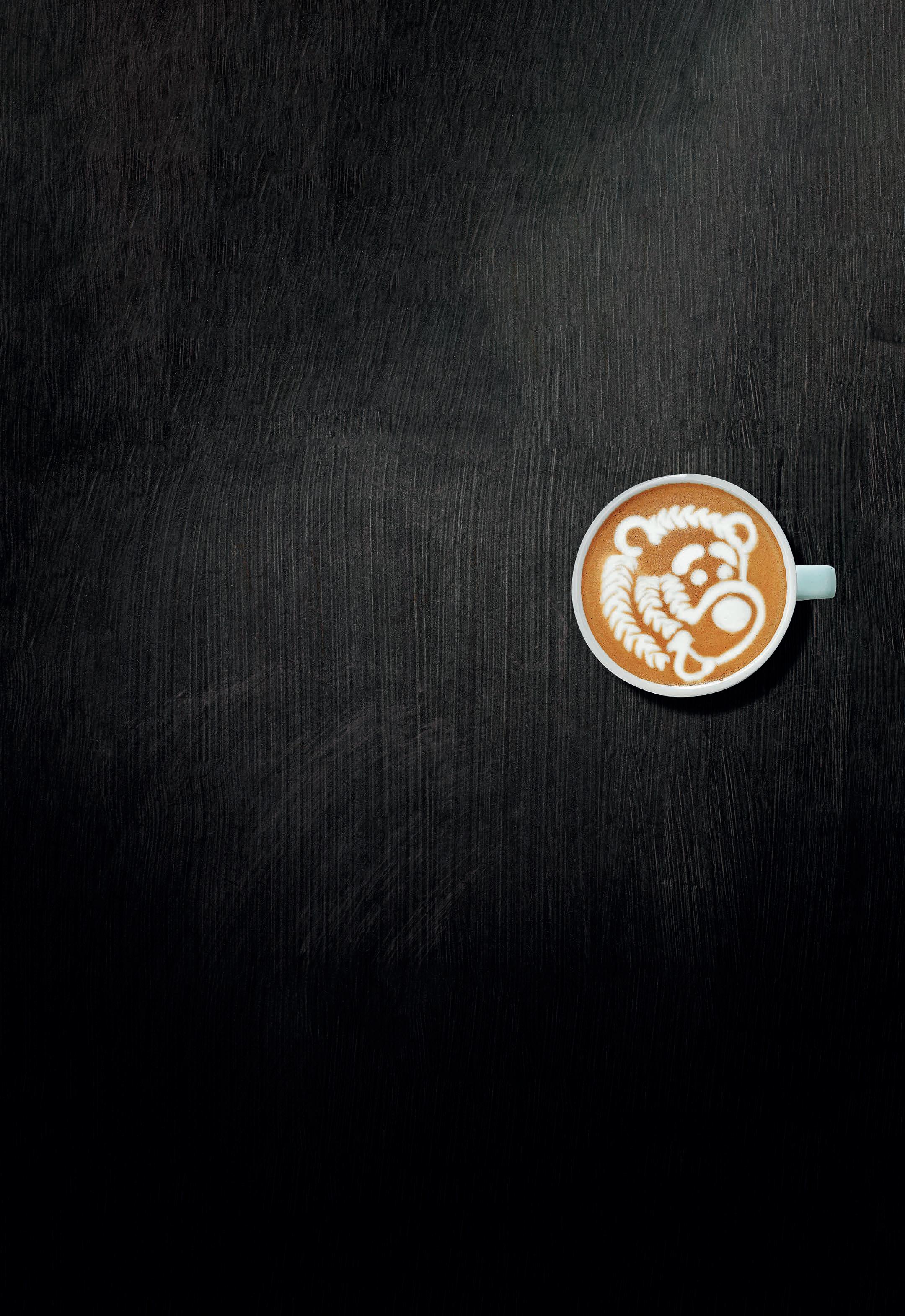
Copenhagen, Denmark.
This is an advanced latte art pattern and not something you’re likely to get on the first try. The pattern involves rosettas and milk dragging, and requires a steady hand to execute correctly.
Typically, the details of the face would involve etching, but I use the weight of the milk to create it with free pour. Although etching is a great way to add detail, I wanted to test my skills without it, and showcase that it can be done freehand.
You also need an understanding of how certain movements, strokes, and swirls will impact the rest of your design. I use sharp angles for the rhino’s mouth and eye to create the fierce anger of the animal.
Like the powerful rhino, keep working on this design until you can achieve your goal.
ESPRESSO YOURSELF 74 beanscenemag.com.au
Victor Vu of Ona Coffee Melbourne is the 2024 ASCA Australian Latte Art Champion.
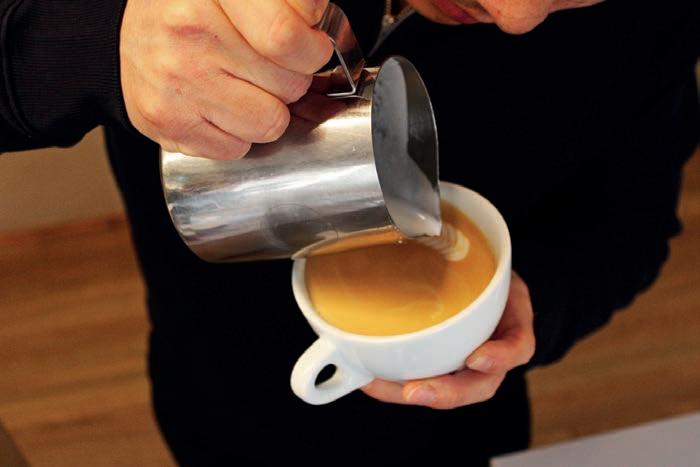
Starting with the handle at three o-clock, pour a 12-leaf rosetta on the left side of the cup from the 10 o-clock position downwards.

Draw a smaller six-leaf rosetta directly next to it, forming the
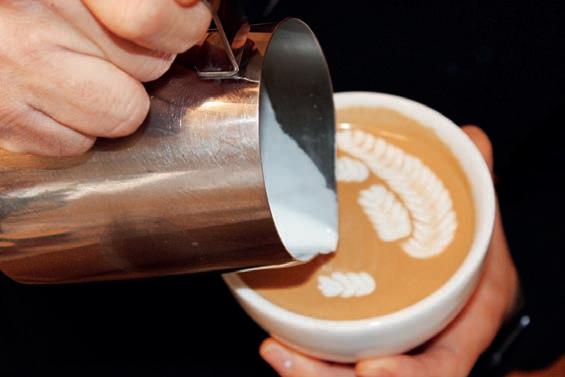
Turning the cup slightly towards you to five
pour another

To create the rhino’s face, start your pour a little higher than the first rosetta in the centre of the cup. In one continuous motion, drag the milk down the cup to create the curve of the forehead, a small loop for the nostril, and the mouth and chin, finishing at the bottom of the first
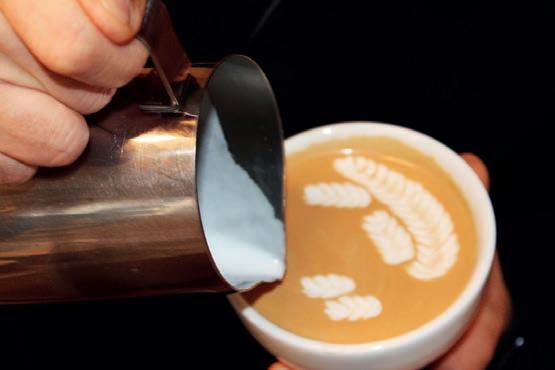
Keep the cup in the same position. Use the milk weight to connect the two branches, dragging the milk towards you.
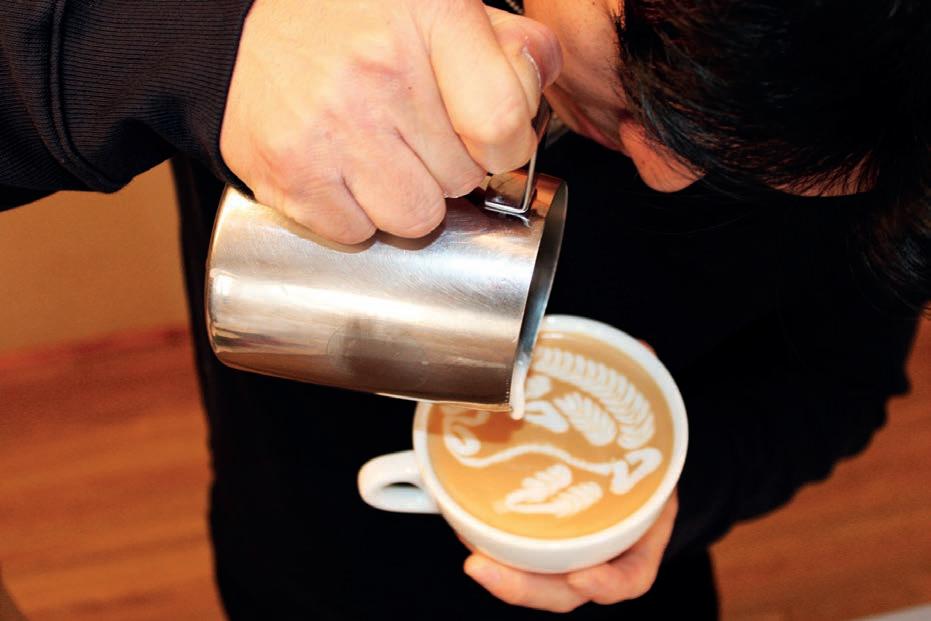


Aim your pitcher above the third rosetta and drag the milk across the cup, in line with the third rosetta. Sharply drag the milk upwards to create a pointed tip, in line with the second rosetta. Connect the two lines together in a triangle shape to form the eye.
Finish by dragging your pour to create two horns. Starting with the smaller horn above the eye, then the longer horn on top of the rhino’s nose.
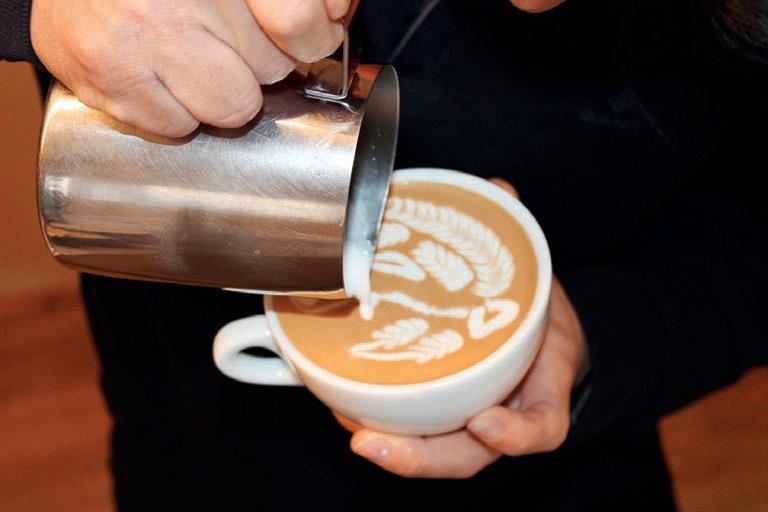
 rhino’s cheek.
For the ear, position your pitcher above the first rosetta. Create another triangle-like shape and connect the forehead to the first rosetta.
rosetta.
o-clock,
sixleaf rosetta directly across the cup, starting from the handle side. Then pour two four-leaf rosettas in the top middle of the cup to create the leaves on a tree branch.
rhino’s cheek.
For the ear, position your pitcher above the first rosetta. Create another triangle-like shape and connect the forehead to the first rosetta.
rosetta.
o-clock,
sixleaf rosetta directly across the cup, starting from the handle side. Then pour two four-leaf rosettas in the top middle of the cup to create the leaves on a tree branch.
beanscenemag.com.au 75 Images: Prime Creative Media.
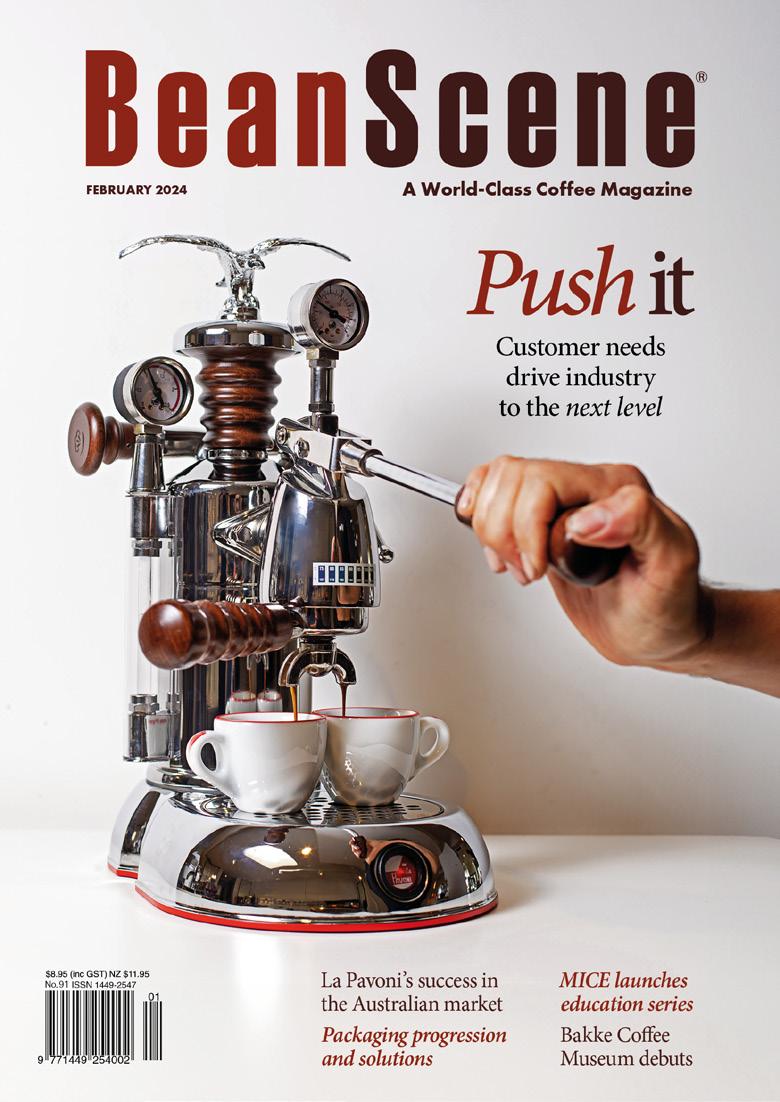




BeanScene Magazine BeanScene magazine is always chock-full of ca einated content, co ee innovation and co ee people. Subscribe today to receive every new issue, delivered straight to your door every two months – and all from just $45! www.beanscenemag.com.au SAVE over and NEVER miss an Subscribeissue. today! 25% Subscribe to now!

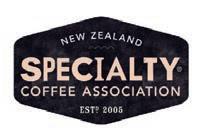
Emma McDougall is the Communications and Administration Coordinator of the NZSCA.
Celebrating success
Across three weekends in March 2024, the New Zealand Specialty Coffee Association reintroduced regional barista competitions. Emma McDougall shares her insights from the events.
e-establishing an event more than 10 years since it was last held isn’t easy. But when overwhelming demand from the New Zealand coffee community became impossible to ignore, we knew it was time to give regional barista competitions another shot.
And the events did not disappoint. The revival of regionals proved to be a triumphant success, with participants showcasing their expertise and passion for the craft. As we reflect on another three thrilling events, it’s time to extend our heartfelt congratulations to our sponsors, judges, competitors, volunteers, and community who have made us immensely proud.
The regional New Zealand Barista Championships took place in Auckland on 3 March, Christchurch on 10 March, and Wellington on 17 March. The talent on show was incredible, with Hanna Teramoto of Coffee Tech in Auckland, Bonnie Lam of The Coffee Dojo in Christchurch, and Jason Moore of Vanguard Specialty Coffee Co. in Wellington crowned regional champions. These standout baristas are among a battalion of exceptional individuals who demonstrated skill, dedication, innovation, and the diversity of talent in region.

enhanced the overall experience, making it truly memorable for all involved.
Part of their prize package includes complimentary travel and accommodation, green coffee, and vouchers to the Aotearoa New Zealand Barista Championship in Upper Hutt, North Island, from 5 to 6 October 2024. The top four competitors from each region all have places reserved at nationals and we encourage them all to give the next level a go.
We’d like to give a special mention to our hosts, Havana Auckland, C4 Coffee Co, and Mojo Featherston. Each is a unique venue in a stunning location, providing the perfect backdrop for friendly competition and shared passion. Their hospitality
It’s also evident the regionals were not just about coffee, but also about fostering connections and celebrating community. Participants from across the country came together, united by their love for the craft and shared enthusiasm for pushing the boundaries of excellence. The people who flew across the country and the champions who came out to encourage our new competitors made March 2024 extra special.
Mark your calendars for the upcoming Aotearoa New Zealand Barista Championship in October. It promises to be another exciting gathering of coffee enthusiasts, where talent will be showcased,
skills upgraded, and friendships forged. Stay tuned for ticket sales and registration details. The winner of this event will represent New Zealand at the World Barista Championship 2025.
To all our competitors, hosts, sponsors, judges, and volunteers, thank you for your unwavering dedication and passion. Your support and commitment are deeply appreciated and valued. Your contributions have made the regionals a resounding success, and we look forward to seeing you soon.

For more information on the New Zealand Specialty Coffee Association, or to join, visit nzsca.org
Image: New Zealand Specialty Coffee Association. beanscenemag.com.au 77 NZSCA
From left: Emma Markland Webster, Luise Metelka, Honoka Kawashima, and Hanna Teramoto.
Frankie Shi
Australian Cup Tasters Champion Frankie Shi details his experience at the 2024 World Cup Tasters Championship and whether his journey as a competitor will continue.
Name: Frankie Shi
Nationality: Australian
Company: Infinit y Coffee Roasters
Instagram: @frankieshi
When and where was your first job in the hospitality industry?
In 2002, I started working as a kitchen hand at Canteen Café in Balmain, New South Wales.
What inspired you to pursue a career in coffee?
One day at Canteen Café the barista had the day off, so I stepped in and made some hot chocolates and espresso shots. From there I developed my love of coffee.
Your favourite part of being a barista?
I love talking to people and building a connection with customers. When they compliment my coffee, it makes me feel like I’ve succeeded as a barista.

The biggest takeaway from competing in the World Cup Tasters Championship?
I think I needed to place more emphasis on my time, rather than guessing all eight out of eight triangulations correctly. I was 30 seconds slower than the competitor who placed 16th, and he ended up winning the competition.
What was going through your head when the results from the first round were announced?
I was a bit shocked when I realised I wouldn’t progress to the second round. I thought I had gotten eight out of eight triangulations right but I only got seven out of eight correct. It was hard to hear I had just missed out, but it was an important learning curve for me.
Is there anyone you’d like to thank for helping you prepare for the worlds?
Young Baek, the 2023 World Cup Tasters Champion, was my coach and a massive help throughout my training. I am very grateful for his assistance.
Will you compete again next year?
Yes, my journey will continue. This year’s experience only motivates me more to revisit the world stage and take on the title.
Proudest accomplishment of your career?
Building my business, Infinity Coffee Roasters. It’s my baby and I’m very proud of its growth over the past 12 years.
Advice for baristas looking to enter coffee competitions?
For those wanting to compete in the Cup Tasters competition, attend as many public cupping sessions as possible. Any barista looking for advice can message me and I’m happy to help them for free.
What inspires you to continue to grow your skills as a barista?
The warm and inviting atmosphere of the industry definitely motivates me to continue my journey.
What’s your go-to coffee order?
Flat white, three quarters full.
When you’re not working at Infinity Roasters, what do you enjoy doing?
Walking my dog every day and visiting cafés with family and friends on weekends.
What’s your dream holiday destination? Iceland.
GET TO KNOW
Specialty Coffee Association. 78 beanscenemag.com.au
Image:




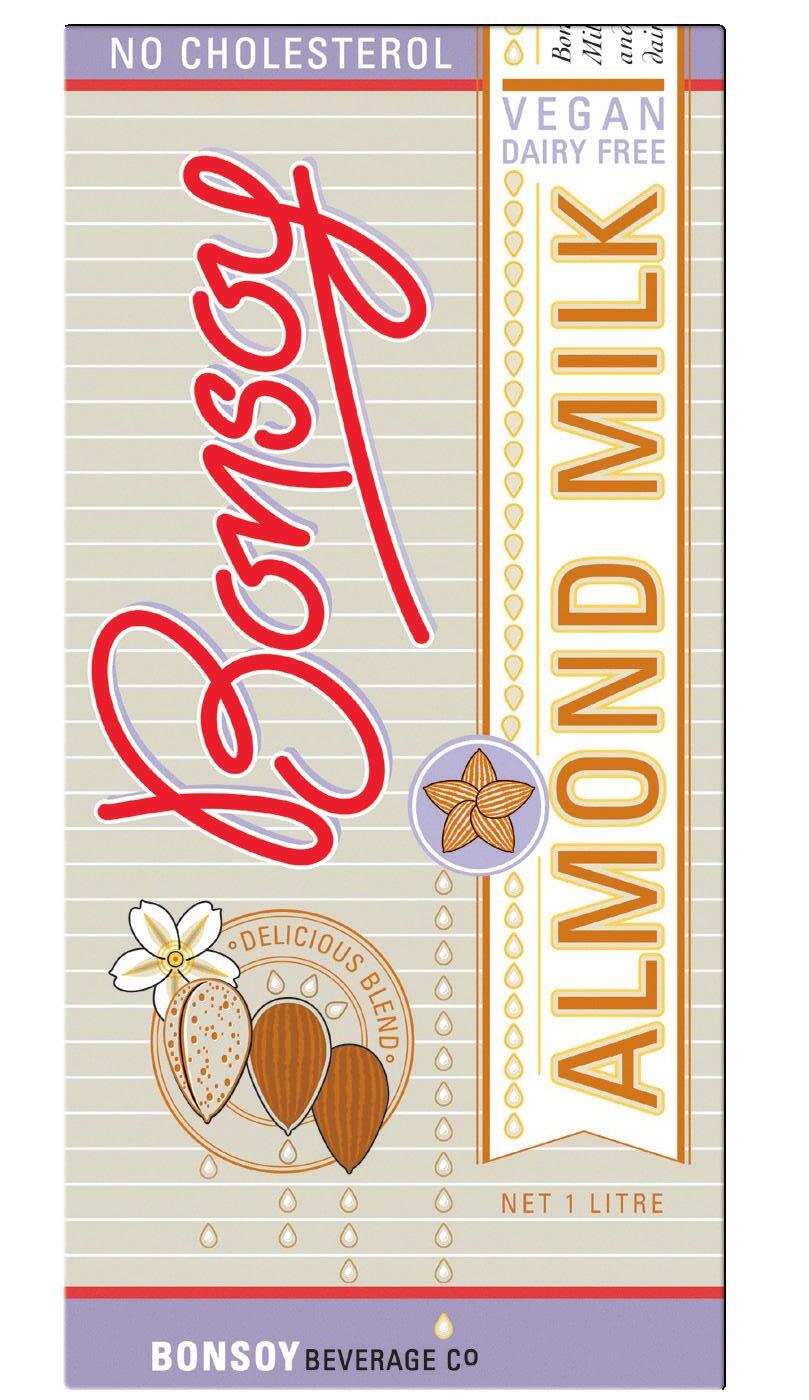


SALES | SERVICE | REPAIRS www.coffeemachinetechnologies.com.au AUSTRALIA TULLAMARINE Tel: +61 3 9335 2293 CARLTON Tel: +61 3 9681 8115 SYDNEY Tel: +61 2 8880 9917 RYE Tel: +61 3 5911 8002 GEELONG Tel: +61 3 5201 0174


























































 From left: Husband-and-wife team Alison and Stacy Visser, with The Bean Cartel National Sales Manager Melissa Glentis.
From left: Husband-and-wife team Alison and Stacy Visser, with The Bean Cartel National Sales Manager Melissa Glentis.


























































































 ONA COFFEE
ONA COFFEE

 Ona Coffee’s Sydney café setup gives guests the unique perspective of a competition judge.
Ona Coffee’s Sydney café setup gives guests the unique perspective of a competition judge.

 The café has a wide variety of locally roasted coffee.
Images: Kona Café.
Image: Stroll Coffee.
KONA CAFÉ
Kona Café is in Applecross, Perth.
The café has a wide variety of locally roasted coffee.
Images: Kona Café.
Image: Stroll Coffee.
KONA CAFÉ
Kona Café is in Applecross, Perth.
 HIDDEN GEM
HIDDEN GEM
 Hidden Gem Owner Gemma Boxsell’s father and brother are pastry chefs.
Hidden Gem has worked with Paradox for four years.
Hidden Gem Owner Gemma Boxsell’s father and brother are pastry chefs.
Hidden Gem has worked with Paradox for four years.













 rhino’s cheek.
For the ear, position your pitcher above the first rosetta. Create another triangle-like shape and connect the forehead to the first rosetta.
rosetta.
o-clock,
sixleaf rosetta directly across the cup, starting from the handle side. Then pour two four-leaf rosettas in the top middle of the cup to create the leaves on a tree branch.
rhino’s cheek.
For the ear, position your pitcher above the first rosetta. Create another triangle-like shape and connect the forehead to the first rosetta.
rosetta.
o-clock,
sixleaf rosetta directly across the cup, starting from the handle side. Then pour two four-leaf rosettas in the top middle of the cup to create the leaves on a tree branch.
















